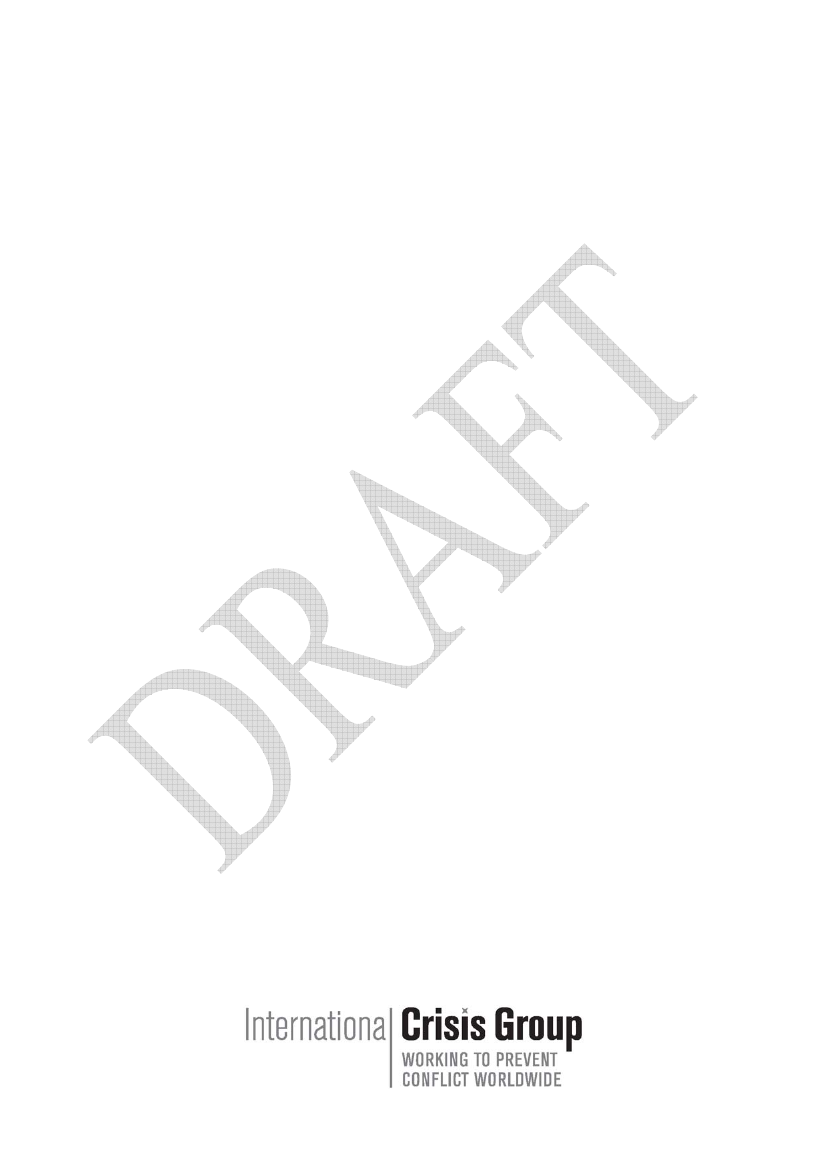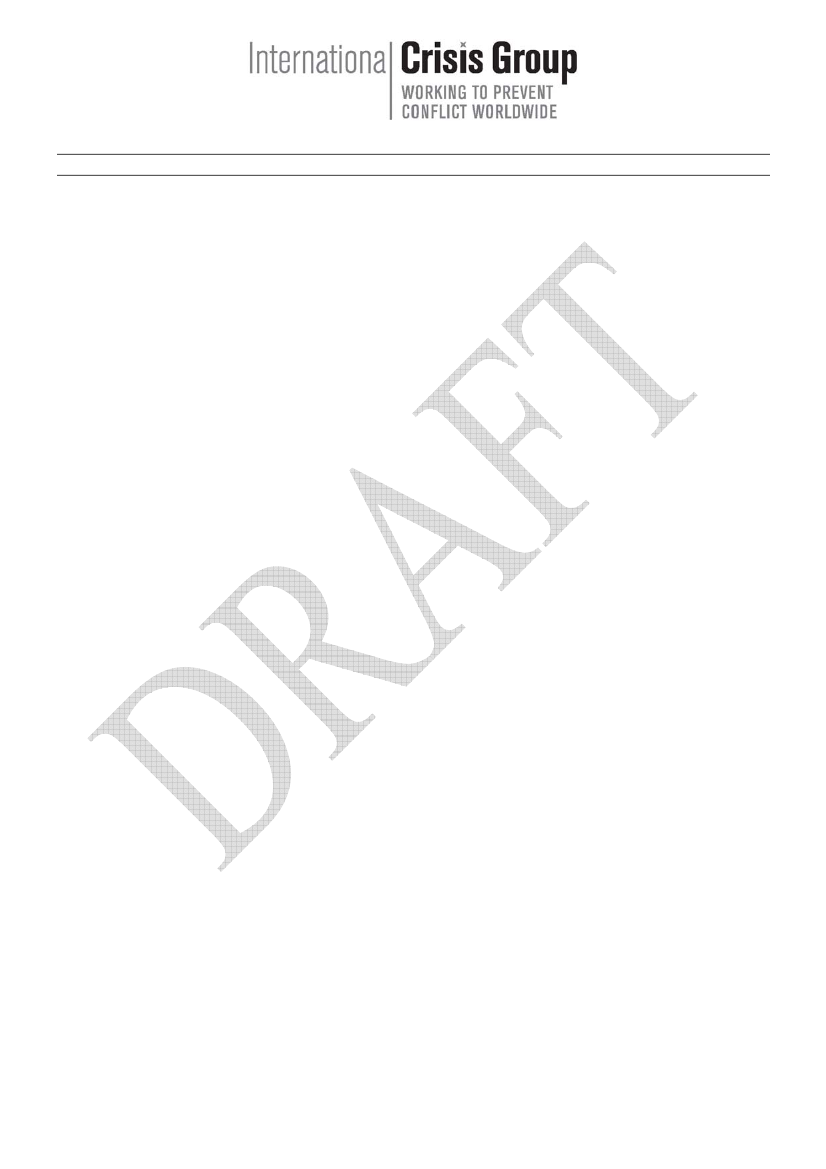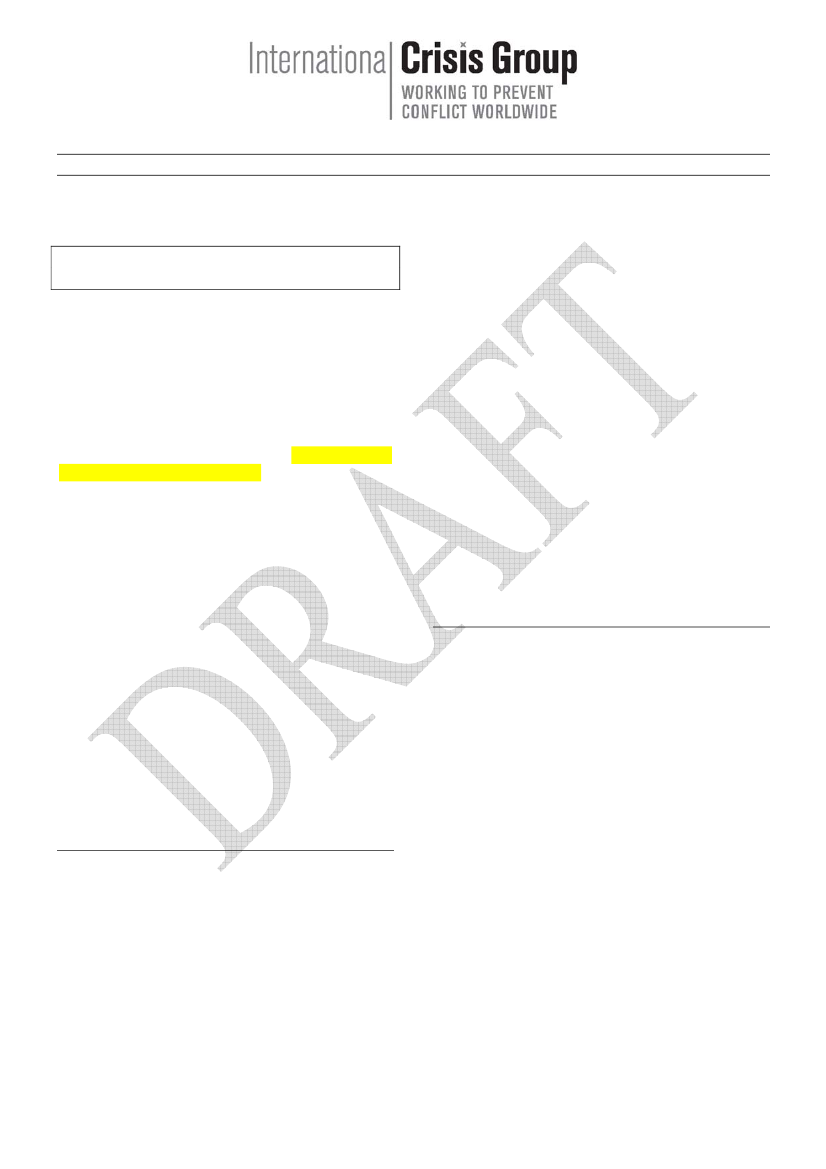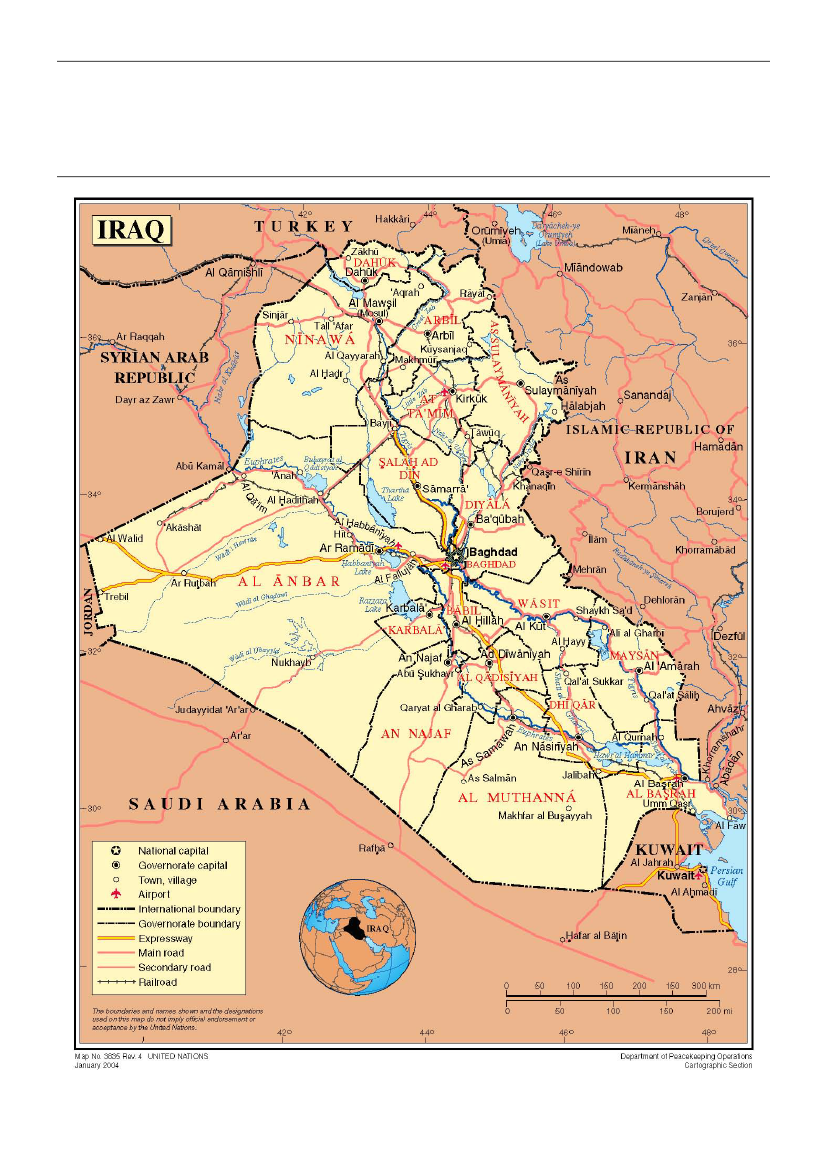Det Udenrigspolitiske Nævn 2005-06
Bilag 61
Offentligt
THE NEXT IRAQI WAR?SECTARIANISM AND CIVIL CONFLICTMiddle East Report N�52 – 27 February 2006
TABLE OF CONTENTS
EXECUTIVE SUMMARY AND RECOMMENDATIONS................................................. iI.II.INTRODUCTION: ESCALATING SECTARIAN VIOLENCE ................................ 1ROOTS OF SECTARIANISM ...................................................................................... 6A.B.C.BEFOREAPRIL2003 ..............................................................................................................6CPA POLICIES.......................................................................................................................8CONSTITUTION-MAKING.....................................................................................................12
III. THE NEW SECTARIANISM...................................................................................... 14A.B.C.ZARQAWI’SSECTARIANAGENDA........................................................................................14SCIRIANDBADRSEIZECONTROL......................................................................................17RELIGION AS THEPRINCIPALSOURCE OFPOLITICALMOBILISATION.....................................22
IV. ERODING RESTRAINTS ........................................................................................... 23A.B.C.D.WEAKENING OF THEU.S.-BACKEDCENTRALSTATE............................................................23AYATOLLAHSISTANI’SWANINGINFLUENCE.......................................................................24THEABSENCE OFVIABLENON-SECTARIANALTERNATIVES.................................................26CHANGINGPOSTURE OFNEIGHBOURINGSTATES?................................................................28
V.
THE DECEMBER 2005 ELECTIONS ....................................................................... 30
VI. CONCLUSION.............................................................................................................. 33APPENDICESA.B.C.D.E.F.MAP OFIRAQ......................................................................................................................36INDEX OFNAMES................................................................................................................37SEATALLOCATIONFOLLOWINGDECEMBER2005 ELECTIONS............................................39ABOUT THEINTERNATIONALCRISISGROUP.......................................................................40CRISISGROUPREPORTS ANDBRIEFINGS ON THEMIDDLEEAST ANDNORTHAFRICA.........41CRISISGROUPBOARD OFTRUSTEES...................................................................................43
Middle East Report N�52
27 February 2006
THE NEXT IRAQI WAR? SECTARIANISM AND CIVIL CONFLICTEXECUTIVE SUMMARY AND RECOMMENDATIONSThe bomb attack on a sacred Shiite shrine in Samarra on22 February 2006 and subsequent reprisals against Sunnimosques and killings of Sunni Arabs is only the latestand bloodiest indication that Iraq is teetering on thethreshold of wholesale disaster. Over the past year, socialand political tensions evident since the removal of theBaathist regime have turned into deep rifts. Iraq’s mosaicof communities has begun to fragment along ethnic,confessional and tribal lines, bringing instability andviolence to many areas, especially those with mixedpopulations. The most urgent of these incipient conflictsis a Sunni-Shiite schism that threatens to tear the countryapart. Its most visible manifestation is a dirty war beingfought between a small group of insurgents bent onfomenting sectarian strife by killing Shiites and certaingovernment commando units carrying out reprisals againstthe Sunni Arab community in whose midst the insurgencycontinues to thrive. Iraqi political actors and theinternational community must act urgently to prevent alow-intensity conflict from escalating into an all-out civilwar that could lead to Iraq’s disintegration and destabilisethe entire region.2005 will be remembered as the year Iraq’s latentsectarianism took wings, permeating the political discourseand precipitating incidents of appalling violence andsectarian “cleansing”. The elections that bracketed the year,in January and December, underscored the newly acquiredprominence of religion, perhaps the most significantdevelopment since the regime’s ouster. With mosquesturned into party headquarters and clerics outfittingthemselves as politicians, Iraqis searching for leadershipand stability in profoundly uncertain times essentiallyturned the elections into confessional exercises. Insurgentshave exploited the post-war free-for-all; regrettably, theirbrutal efforts to jumpstart civil war have been metimprudently with ill-tempered acts of revenge.In the face of growing sectarian violence and rhetoric,institutional restraints have begun to erode. The cautioning,conciliatory words of Grand Ayatollah Ali al-Sistani, theShiites’ pre-eminent religious leader, increasinglyare falling on deaf ears. The secular centre has largelyvanished, sucked into the maelstrom of identity politics.U.S. influence, while still extremely significant, isdecreasing as hints of eventual troop withdrawal getlouder. And neighbouring states, anxious to protecttheir strategic interests, may forsake their longstandingcommitment to Iraq’s territorial integrity if they concludethat its disintegration is inevitable, intervening directly inwhatever rump states emerge from the smoking wreckage.If Iraq falls apart, historians may seek to identify yearsfrom now what was the decisive moment. The ratificationof the constitution in October 2005, a sectarian documentthat both marginalised and alienated the Sunni Arabcommunity? The flawed January 2005 elections thathanded victory to a Shiite-Kurdish alliance, which draftedthe constitution and established a government thatcountered outrages against Shiites with indiscriminateattacks against Sunnis? Establishment of the InterimGoverning Council in July 2003, a body that in itscomposition prized communal identities over national-political platforms? Or, even earlier, in the nature of theousted regime and its consistent and brutal suppression ofpolitical stirrings in the Shiite and Kurdish communitiesthat it saw as threatening its survival? Most likely it is acombination of all four, as this report argues.Today, however, the more significant and pressingquestion is what still can be done to halt Iraq’s downwardslide and avert civil war. Late in the day, the U.S.administration seems to have realised that a fully inclusiveprocess – not a rushed one – is the sine qua non forstabilisation. This conversion, while overdue, isnonetheless extremely welcome. Ambassador ZalmayKhalilzad’s intensive efforts since late September 2005 tobring the disaffected Sunni Arab community back into theprocess have paid off, but only in part. He is now alsoon record as stating that the U.S. is “not going to investthe resources of the American people to build forces runby people who are sectarian”. Much remains to be done,however, to recalibrate the political process furtherand move the country on to a path of reconciliationand compromise.First, the winners of the December 2005 elections,the main Shiite and Kurdish lists, must establish agovernment of genuine national unity in whichSunni Arab leaders are given far more than a token
The Next Iraqi War? Sectarianism and Civil ConflictCrisis Group Middle East Report N�52, 27 February 2006
Page ii
role. That government, in turn, should make everyeffort to restore a sense of national identity andaddress Iraqis’ top priorities: personal safety, jobsand reliable access to basic amenities such aselectricity and fuel. It should also start disbandingthe militias that have contributed to the country’sdestabilisation. The U.S. has a critical role to playin pressuring its Iraqi war-time allies to accept suchan outcome. States neighbouring Iraq as well as theEuropean Union should push toward the same goal.Secondly, substantive changes must be made tothe constitution once the constitutional processis reopened one month after the government entersoffice. These should include a total revision of keyarticles concerning the nature of federalism and thedistribution of proceeds from oil sales. As it stands,this constitution, rather than being the glue thatbinds the country together, has become both theprescription and blueprint for its dissolution. Again,the U.S. and its allies should exercise every effortto reach that goal.Thirdly, donors should promote non-sectarianinstitution building by allocating funds to ministriesand projects that embrace inclusiveness,transparency and technical competence andwithholding funds from those that base themselveson cronyism and graft.Fourthly, while the U.S. should explicitly state itsintention to withdraw all its troops from Iraq, anydrawdown should be gradual and take into accountprogress in standing up self-sustaining, non-sectarian Iraqi security forces as well as inpromoting an inclusive political process. AlthoughU.S. and allied troops are more part of the problemthan they can ever be part of its solution, for nowthey are preventing – by their very presence andmilitary muscle – ethnic and sectarian violencefrom spiralling out of control. Any assessment ofthe consequences, positive and negative, that canreasonably be anticipated from an early troopwithdrawal must take into account the risk of anall-out civil war.Finally – and regrettable though it is that this isnecessary – the international community, includingneighbouring states, should start planning forthe contingency that Iraq will fall apart, so as tocontain the inevitable fall-out on regional stabilityand security. Such an effort has been a taboo, butfailure to anticipate such a possibility may lead tofurther disasters in the future.
RECOMMENDATIONSTo the Winners of the December 2005 Elections:1.Strongly condemn sectarian-inspired attacks, suchas the bombing of the al-Askariya shrine in Samarrabut also reprisal attacks, and urge restraint.Establish a government of national unity thatenjoys popular credibility by:
2.
(a)(b)
including members of the five largestelectoral coalitions;dividing the key ministries of defence,interior, foreign affairs, finance, planningand oil fairly between these same lists, witheither defence or interior being given to arespected and non-sectarian Sunni Arableader, and the other to a similar leader ofthe United Iraqi Alliance;assigning senior government positions topersons with technical competence andpersonal integrity chosen from within theministry; andadopting an agenda that prioritises respect forthe rule of law, job creation and provisionof basic services.
(c)
(d)
3.
Revise the constitution’s most divisive elementsby:
(a)
establishing administrative federalism onthe basis of provincial boundaries, outsidethe Kurdish region; andcreating a formula for the fair, centrally-controlled, nationwide distribution of oilrevenues from both current and future fields,and creating an independent agency toensure fair distribution and preventcorruption.
(b)
4.
Halt sectarian-based attacks and human rightsabuses by security forces, by:
(a)
beginning the process of disbanding militias,integrating them into the new security forcesso as to ensure their even distributionthroughout these forces’ hierarchies, at boththe national and local levels;continuing to build the security forces(national army, police, border guards andspecial forces, as well as the intelligenceagencies) on the basis of ethnic andreligious inclusiveness, with members ofIraq’s various communities distributedacross the hierarchies of those forces aswell as within the governorates;
(b)
The Next Iraqi War? Sectarianism and Civil ConflictCrisis Group Middle East Report N�52, 27 February 2006
Page iii
(c)
ensuring that the ministers of defence andinterior, as well as commanders and seniorofficers at both the national and local levelare appointed on the basis of professionalcompetence, non-sectarian outlook andpersonal integrity; andestablishing an independent commission,accountable to the council of deputies, tooversee the militias’ dismantlement and thecreation of fully integrated security forces.
9.
(d)
Engage Iraq’s neighbours, including Iran, inhelping solve the crisis by taking the measuresdescribed in recommendation 11 below, andactively promote the reconciliation conferenceagreed to in Cairo in November 2005, encouragingrepresentatives of all Iraqi parties and communities,as well as of governments in the region, to attend.
To Donors:10.Allocate funding to ministries and governmentprojects, as well as civil society initiatives, strictlyaccording to their compliance with principles ofinclusiveness, transparency and competence.
5.
In implementing de-Baathification, judge formerBaath party members on the basis of crimescommitted, not political beliefs or religiousconvictions, and establish an independentcommission, accountable to the council of deputies,to oversee fair and non-partisan implementation.Both former Baathis and non-Baathis suspectedof human rights crimes or corruption should beheld accountable before independent courts.
To States Neighbouring Iraq:11.Help stabilise Iraq by:
(a)(b)
expressing or reiterating their strategicinterest in Iraq’s territorial integrity;encouraging the winners of the December2005 elections to form a government ofnational unity and accede to demands tomodify the constitution (as outlined inrecommendation 3 above);strengthening efforts to prevent funds andinsurgents from crossing their borders intoIraq; andpromoting, and sending representatives to,the planned reconciliation conference inBaghdad.
To the Government of the United States:6.Press its Iraqi allies to constitute a government ofnational unity and, in particular, seek to preventthe defence and interior ministries from beingawarded to the same party or to strongly sectarianor otherwise polarising individuals.Encourage meaningful amendments to theconstitution to produce an inclusive document thatprotects the fundamental interests of all principalcommunities, as in recommendation 3 above.Assist in building up security forces that are notonly adequately trained and equipped, but alsoinclusive and non-sectarian.
(c)
7.
(d)
8.
Amman/Baghdad/Brussels, 27 February 2006
Middle East Report N�52
27 February 2006
THE NEXT IRAQI WAR? SECTARIANISM AND CIVIL CONFLICTI.INTRODUCTION: ESCALATINGSECTARIAN VIOLENCEThe event marking the onset of their increasingly ruthlessfight was the car bombing of a crowd exiting the ImamAli Mosque in Najaf on 29 August 2003 that killed morethan 85 worshipers, including Ayatollah MuhammadBaqr al-Hakim, SCIRI’s powerful and charismatic leader,the attackers’ target.3Since then, an unremittingbattle between insurgents and government forces(backed by U.S. troops) has spawned a much morepernicious sectarian conflict – Sunni on Shiite, Shiite onSunni – in which the most radical elements on each sideare setting the agenda. Thus, attacks on Shiite crowdsby suicide bombers allegedly acting on orders ofcertain insurgent commanders are countered bysweeps through predominantly Sunni towns andneighbourhoods by men dressed in police uniformsaccused of belonging to commando units of theministry of interior (controlled, since April 2005, bySCIRI and its Badr Organisation).
Following the advent of its first elected government inApril 2005, Iraq has witnessed an alarming descent intosectarian discourse and violence. Centred on the principaldivide between Sunnis and Shiites, this developmenthas prompted increasingly inflammatory rhetoric,indiscriminate detention, torture and killings on the basisof religious belief, attacks on mosques and families’induced departures from towns and neighbourhoodsbased on their religious identity.While there has been tension, and some violence, betweenethnic groups (for example, Arabs and Kurds) or amongShiite militias (such as the Badr Organisation and theMahdi Army) that could similarly contribute to Iraq’sdisintegration, this report focuses on the most significantcentrifugal forces that are tearing the country apart.1Theseforces, while religious in inspiration and identification,are profoundly political in origin and character. Their mainrepresentatives are the Supreme Council for the IslamicRevolution in Iraq (SCIRI) – and its military arm the BadrOrganisation (formerly the Badr Corps,al-Faylaq al-Badr)– that formally came to power as part of a Shiite-Kurdishcoalition after the January 2005 elections, and insurgentgroups seeking to jumpstart civil war and foment chaosby targeting Shiite populations, especially but notexclusively the insurgent outfits known asTandhim al-Qa’ida fi Bilad al-Rafidayn(al-Qaeda’s Organisation inMesopotamia) andJaysh Ansar al-Sunna(Partisans of theSunna Army).21
Iraq’s national security adviser, Mowaffak al-Rubaie, put itthis way, summarising the conclusions of a study preparedunder his supervision by the National Joint IntelligenceAnalysis Centre: “The report says that a war between Arabs andKurds, or between Turkomans and Kurds, is unlikely. Shouldcivil conflict break out, it is more likely to be a war betweenSunnis and Shiites, mainly in the mixed areas: Tel Afar,Diyala governorate, Baghdad. There is also the possibilityof an intra-Shiite civil war”. Crisis Group interview, Baghdad,2 September 2005.2Tandhim al-Qa’ida fi Bilad al-Rafidayn(Al-Qaeda’sOrganisation in Mesopotamia, or Al-Qaeda in the Land ofthe Two Rivers, i.e., Iraq) is the group created by a Jordanian,Ahmad Fadhel Nazzal al-Khalaila, better known as Abu Musab
al-Zarqawi. It was known previously asTawhid wa Jihad(Monotheism and Holy War). As the suicide attacks on threehotels in Amman on 9 November 2005 show, the group, whilenon-Iraqi in origin, has gained Iraqi recruits over the past twoyears; both its spokesman and military commander claim to beIraqis. See Crisis Group Middle East Report N�47,Jordan’s9/11: Dealing with Jihadi Islamism,23 November 2005, andCrisis Group Middle East Report N�50,In Their Own Words:Reading the Iraqi Insurgency,15 February 2006.Jaysh Ansaral-Sunnaappears to be a reincarnation ofAnsar al-Islam,agroup comprising jihadi Kurds and Afghan Arabs (includingZarqawi) that was decimated by a combined force of U.S. troopsand Kurdish Regional Government fighters in north eastern Iraqin March 2003. For background, see Crisis Group Middle EastBriefing N�4,Radical Islam in Iraqi Kurdistan: The MouseThat Roared?,7 February 2003. All insurgent groups, includingZarqawi’s, deny intending to foment a sectarian civil war, evenif evidence on the ground suggests the opposite. See the sectionon Zarqawi further below. For an analysis of the insurgents’discourse in this respect, see Crisis Group Report,In Their OwnWords,op. cit.3The attack is generally attributed to Abu Musab al-Zarqawi.His jihadi followers in Zarqa (Jordan) have claimed that theattacker was Yassin Jarad, the father of Zarqawi’s second wife,who had gone to Iraq to fight with his son-in-law. See Hazemal-Amin, “Jordan’s Zarqawists visit their sheikhs in prison andawait the opportunity to join Abu Musab in Iraq”,Al-Haya,14December 2004.
The Next Iraqi War? Sectarianism and Civil ConflictCrisis Group Middle East Report N�52, 27 February 2006
Page 2
Sectarian passions are inflamed on both sides with eachgruesome suicide attack or discovery of mutilated bodies,an almost daily occurrence. Most frequent have been theegregious bombings of crowds of worshipers, mournersin funeral processions, shoppers or job-seekers queuingto join the police4in predominantly Shiite towns andneighbourhoods.5Most attacks take place in Baghdad andtowns ringing the capital, a majority of which have mixedpopulations, or on roads leading from Baghdad to theShiite holy cities of Najaf and Karbala, which traverse astring of Sunni-inhabited towns – Latifiya, Mahmoudiya,Iskanderiya, Yusefiya, Musayyeb – in the so-calledTriangle of Death.6In the Shiites’ litany of outrages,attacks targeting religious leaders (Baqr al-Hakim) orfestivals (Arba’in, 2004) stand out.Mass casualties occur even when no political target isinvolved but the attackers seek to spread fear, anger anddiscord (fitna), for example the suicide bombings in Hillaon 28 February 2005 (some 125 dead)7and in a busleaving a Baghdad station for the southern (Shiite) town
of Naseriya on 8 December 2005 (at least 32 dead).8Therealso have been brazen armed attacks in broad daylightagainst Shiites walking in the street, passing a checkpointwhile driving or simply being in their own homes orplaces of work. One particularly notorious incident, in lateSeptember 2005, involved the execution-style killingof five (Shiite) teachers and their driver in Muwelha,a (Sunni) suburb of Iskanderiya, by armed men dressed aspolice officers.9So pervasive has become the fear of attacks thatcrowds respond to the merest suspicion of one havingtaken place or about to occur. Thus the rumour that asuicide bomber was about to blow himself up in themidst of a procession on the occasion of a Shiitereligious festival on 31 August 2005, triggered a massstampede on a bridge in Baghdad’s (Shiite) Kadhemiyaneighbourhood in which hundreds of worshippers –men, women and children – were either trampledunderfoot or drowned in the Tigris. Coming on theheels of a mortar barrage in the vicinity of the crowdearlier that morning that reportedly killed as many asseven, the alarm was sufficient to cause mass death inthe absence of any physical attack.10For a year and a half, from August 2003 until February2005, such attacks met with barely a response from mostShiites, except deepening anger and calls for revenge. Theonly ones accused of meting out revenge from the outsetwere members of the Badr Organisation, allegedlyresponsible for the assassination of former regime officialsand suspected Baath party members, in addition tosuspected insurgents, but for a long time these actions didnot reach critical mass. The Shiite religious leadershiprepeatedly and insistently called on the masses to exerciserestraint and on survivors to refrain from avengingthemselves for the deaths of their close relatives. This, andthe expectation that they, the Shiites, were about to cometo power through the U.S.-engineered transition, mollifiedthe community and left the attacks both one-sided anddramatically unsuccessful: if the aim was to jumpstartsectarian war, the provocations failed to yield the intendedresponse.8
4
Some insurgent propagandists draw a distinction betweencivilians (illegitimate target) and candidates queuing up atpolice recruitment centres (legitimate). Under internationalhumanitarian law, both groups are considered civilian andtherefore cannot be attacked.5To be sure, car bombings have occurred in non-Shiite townsas well, such as Ba’quba, which has a mixed Sunni/Shiitepopulation. (Sunni) Kurds, too, have been a target, for examplein suicide bombings against Kurdish parties, police, politiciansand government installations in the territory of the KurdistanRegional Government (KRG). In Khanaqin, outside the KRG,attackers killed two birds with one stone on 18 November 2005when they hit two Shiite mosques in the predominantly (Shiite)Kurdish town. In Sunni towns, bombings appear mainly to havetargeted police stations.6“Even before Zarqawi became a star”, said an Iraqi who usedto visit Karbala and Najaf in 2003 and 2004, “there were attackson Shiite travellers on this road”. Crisis Group interview,Amman, 9 December 2005. Crisis Group interviewed an Iraqifrom Sadr City, the large Shiite slum area of Baghdad, who hadtravelled to Najaf to bury a relative in May 2005. The funeralparty was ambushed by seven armed men wearing militaryuniforms who were running a checkpoint on the road betweenMahmoudiya and Latifiya. “They screamed, ‘Get out, you dirtyShiites!’, and took six of my relatives”. The six (young) menturned up at the Mahmoudiya morgue two days later, reportedlyshowing signs of torture. As a further horrifying example of theattack’s sectarian nature, the killers cut off part of one of thevictims’ arms that sported a tattoo of the (Shiite) Imam Ali’ssword. Crisis Group interview, an elderly relative whosurvived the attack, Sadr City, 29 August 2005.7The incident caused an upset in Iraqi-Jordanian relations whenthe dead attacker’s Jordanian family reportedly celebrated theirson’s “martyrdom” in Iraq. For more on this incident, see CrisisGroup Report,Jordan’s 9/11,op. cit., p. 8, fn. 56.
The lethal December 2005 attack at the bus station, carried outby a suicide bomber who had boarded the bus, followed a triplecar bombing at the same station in August 2005 that killed atleast 43 people. Associated Press, December 2005.9The men reportedly burst into a primary school in Muwelha,rounded up five teachers and their driver, then shot themexecution-style in an empty classroom. A local police officerclaimed the men were disguised Sunni Arab insurgents. SabrinaTavernise, “Five teachers slain in an Iraq school”,The New YorkTimes,27 September 2005.10See Borzou Daragahi and Ashraf Khalil, “Hundreds Die inBaghdad Bridge Stampede”,The Los Angeles Times,31 August2005.
The Next Iraqi War? Sectarianism and Civil ConflictCrisis Group Middle East Report N�52, 27 February 2006
Page 3
However, once the Shiite parties, brought together in theUnited Iraqi Alliance, won a simple majority of votes inthe January 2005 elections and, in alliance with theKurdish list, gained power three months later, the picturechanged dramatically, especially after SCIRI took overthe Interior Ministry, allowing the Badr Corps to infiltrateits police and commando units. Soon, Iraqis witnessed asteep rise in killings of Sunnis that could not be explainedby the fight against insurgents alone. Carried out duringcurfew hours in the dead of night and reportedly involvingarmed men dressed in police or military uniforms arrivingin cars bearing state emblems, raids in predominantlySunni towns or neighbourhoods appeared to cast a widenet. Those seized later turned up in detention centres11or,with a disturbing frequency, in the morgue after havingbeen found – hands tied behind their backs, blindfolded,teeth broken, shot – in a ditch or river. These raidsprompted suspicions that they were carried out by Badrmembers operating under government identity andtargeted the Sunni community rather than any particularinsurgent group or criminal gang.In a well-publicised incident, men dressed in greencamouflage uniforms identified by witnesses as membersof the Volcano Brigade detained some 30 (Sunni Arab)men in Baghdad’s (mostly Shiite) Hurriya neighbourhoodone night in August 2005 around 1 a.m. Several dayslater, their mutilated corpses were found in a dry riverbednear the Iranian border. Surviving relatives denied theyhad had any role in the insurgency and accusedgovernment forces of targeting Sunni tribes (in this casethe Dulaim and Mashahada) as revenge for their pastsupport of Saddam Hussein’s regime.12In late October, militia men of the Mahdi Army raided the(Sunni) village of Madayna in Diyala governorate in anapparent attempt to free hostages captured by localhighway robbers. Meeting resistance and sufferingcasualties, they reportedly returned with commando unitsof the interior ministry and took reprisals, burning downhomes and executing a number of villagers. “This is thebeginning of a sectarian war”, Diyala’s deputy governor,a member of the (Sunni) Iraqi Islamic Party (IIP), declaredafterwards.13Disturbing evidence has also emerged of amethodical effort to assassinate senior officers of theousted regime’s military, including air force pilots who
fought in the war against Iran. These killings have beenattributed to Iranian-sponsored Shiite parties that, with thetables turned, are bent on settling scores.14As such attacks accumulate, Iraqis’ perceptions areincreasingly shaped along sectarian lines, with Sunnis andShiites seen not only as victims but as the intended targets.Public and political discourse has followed apace,frequently taking on an unabashedly sectarian colouration,even as sectarianism is denounced.15Amidst the manypolitical slogans painted on Baghdad buildings, forexample, one can find sectarian specimens, such as: “Longlive the Sunni area!”16Political leaders often resort toAccording to Tareq al-Hashemi, secretary general of the(Sunni) Iraqi Islamic Party, some 55 pilots were killed in the sixmonths before September 2005: “There is a sense of revenge.They have a list of former pilots in Saddam’s regime, and theyare looking for them. It is part of a strategic Iranian plan to pushthe Sunnis out”. Crisis Group interview, Baghdad, 5 September2005. The assassinations are attributed specifically to SCIRI, agroup that was established in and financed and armed by Iran,and that fought on the Iranian side during the Iran-Iraq war in aneffort to put an end to the Baathist regime. Some reports suggestthat the victims also include Shiite pilots not sympathetic toIran. If true, the killings may be part of an Iranian effort to createa pro-Iranian Iraqi air force, one unlikely to attack Iran, ashappened in September 1980.15For example, Adnan Dulaimi, leader of the Iraqi ConsensusFront, declared in July 2005: “If we are attending this conferencein the name of the Sunnis, it does not mean that we embracesectarianism….We are only talking about realities on the ground.We find that the Sunnis, since the start of the occupation, havesuffered from detentions, marginalisation, killings….It hasbecome worse in the last few days….This week we arranged thefunerals of more than twenty youths who used to frequentthe mosques… and the imams are detained without any arrestwarrant from a judge, taken from their homes during curfew”.Speech given during a “public emergency conference” forSunnis held at the al-Nida’ Mosque, Baghdad, 14 July 2005.16To be fair, one can also find unabashedly anti-sectarianslogans, such as: “No to Shiites, no to Sunnis, yes to Iraqi unity”(on al-Wahda primary school in the Dura neighbourhood inAugust 2005). More commonly, rival slogans cohabit acontested space and refer to the conflict’s principal protagonists,including: undefined “mujahidin” (literally holy warriors, i.e.,resistance fighters), Prime Minister Ibrahim al-Jaafari (ofthe Islamic Daawa party), “Falluja” (the town in al-Anbargovernorate that some see as the heart of the insurgency andothers as a symbol of resistance and suffering), Abu Musab al-Zarqawi, Saddam Hussein, Muqtada Sadr and the Mahdi Army,and SCIRI and the Badr Corps. For example, in Dura one canfind “Long live Falluja! Long live the mujahidin!”, “Victory forSaddam Hussein and Iraq!”, “Long live Muqtada Sadr!”, and“Long live the mujahidin! Down with the USA!” (on a Sadristmosque); in Ghazaliya neighbourhood, “Down with Jaafari andthe Badr Corps!”, “Long live al-Anbar governorate, theAmericans’ grave!”, “Long live Zarqawi!”, and “Long liveSaddam!”; in Ameriya neighbourhood, “Long live Falluja,symbol of the resistance!”; in Sadr City, “Yes, yes, Muqtada!14
The exposure by U.S. forces of an underground makeshiftdetention facility in Baghdad in November 2005 that held173 undernourished detainees – some of whom may havebeen tortured – and was run by the Interior Ministry evokedmemories of the Baathist regime’s methods.12Crisis Group interviews with surviving relatives, Baghdad,4 September 2005.13Quoted in Mariam Fam, “Militias growing in power inIraq”, Associated Press, 7 November 2005.
11
The Next Iraqi War? Sectarianism and Civil ConflictCrisis Group Middle East Report N�52, 27 February 2006
Page 4
code, understood by all, to injure members of the oppositecommunity.17Moreover, in their speeches and sermonssome politicians and religious leaders have highlightedthe fate and good deeds of members of their owncommunity while excoriating the opposite community’spolitical leadership for having either perpetrated or donetoo little to prevent perceived sectarian outrages. Thus,some Shiite leaders immediately cast the above-mentionedKadhemiya bridge disaster in sectarian terms, accusingSunnis of having precipitated, if not caused, the deaths ofhundreds of Shiite worshipers.Sheikh Jalal-al-Din al-Saghir, for example, a Shiite clericwho belongs to SCIRI, bewailed the “beloved” victims’fate in a sermon on the first Friday following the event;berated the kind of “jihad” that would rocket men, womenand children congregating for religious purposes;18contended that the ministry of defence (headed by Saadounal-Dulame, a Sunni) rather than the ministry of interior(under Bayan Jaber, a SCIRI colleague) had beenresponsible for security in the neighbourhood and queriedwhy Dulame had permitted his ministry to be “penetratedby Wahhabi19and criminal elements”;20demandedto know why the ministry of health (whose minister,Abd-al-Mutaleb Ali, is a follower of Muqtada Sadr andthus a rival to SCIRI) had been unprepared to handle thedisaster with only three ambulances on the scene;thanked the (Shiite) members of the Iraqi National
Guard on duty in Kadhemiya on the day of thedisaster; and expressed “surprise” at the fact thatsome officials and clergy, “especially the clerics witholive-green turbans”, failed to condemn “this criminalact”.21By contrast, at a Sunni mosque, Sheikh Ahmad Abd-al-Ghafour al-Samarraie, a member of the (Sunni) MuslimScholars Association (MSA), dwelled only briefly on theKadhemiya incident in his Friday sermon, to observe that(Sunni) residents of neighbouring Adhemiya had riskedtheir lives to save some of the (Shiite) victims fromdrowning. He then launched into a tirade against thosewho sought to pin responsibility for the incident on“members of a certain sect” (the Sunnis), placing the onuson (Shiite) security forces instead:Why does the world talk of masked terrorism andnot of organised terrorism? Why does the worldtalk of terrorists and ignores state terrorism? Thereare gangs that exploit state instruments and kill andexecute people with government-issued weaponsdriving government cars, with the governmenteither unaware or choosing to overlook this.Sheikh Abd-al-Salam al-Qubaysi, speaking next, thenhomed in on what he saw as the real problem: “Whowould have believed that SCIRI and Daawa would dosuch things – take people from their homes, kill them andset fire to them? There are entities now in Iraq pushingtoward sectarian war because they realise that theirinfluence is shrinking in the Iraqi and Shiite street and nowthey want to win the Shiite street’s compassion by theseactions”.22The Iraqi media magnify the problem by their dailyportrayal of violence, with especially politically-affiliatedstations and papers ladling out a partisan broth thatpolarises the Sunni and Shiite communities. Theabovementioned Hurriya killings, for example, receivedprime billing (with a gruesome picture of one victim andinflammatory headlines) on the front page ofAl-Basa’er,a newspaper associated with the Muslim ScholarsAssociation – its effect, if not its intent, to further inflame
No, no, Abd-al-Aziz [al-Hakim, the SCIRI leader]!”, “Downwith SCIRI!”, and “Down with the Ghadr Corps!” (The latter isa play on the word “Badr” in Arabic. Badr is the name of thefirst battle fought in the name of Islam, led by Imam Ali in 624,whereas “ghadr” – substituting the Arabic letter “gh” for “b” –is the word for perfidy.)17In a typical use of code words, some Sunni Arab politiciansdismiss their Shiite opponents as Iranians. For examples, seeCrisis Group Middle East Report N�38,Iran in Iraq: How MuchInfluence?,21 March 2005, pp. 4-6. To some Shiite politicians,the epithet “terrorist” easily fits all Sunnis, not only insurgentscommitting outrages against civilians.18“What kind of jihad is this that happened in Kadhemiya”?, heasked. “Is this a jihad for the sake of Islam, Arabism, nationalunity or Iraq?” The words “Arabism” and “national unity” areoften seen as code words for positions held by Sunni Arabs(although Muqtada al-Sadr has also larded his speeches withArab nationalist rhetoric, one reason why he is viewed withconsiderably sympathy by many Sunni Arabs). Sunni Arabpolitical leaders raised these slogans in their campaign against adraft constitution they saw as imposed by Kurds and Shiites tobreak up the country.19Wahhabism is the variant of Salafism championed by theAl-Saud dynasty in Saudi Arabia.20Saadoun Dulame, a former exile in the UK, has come underintense criticism from Sunni Arabs for his decision to join theShiite-Kurdish government. Among other accusations flung athim, he has been called an Iranian agent (tawwab, see below).Crisis Group interviews, Baghdad, December 2005.
Sermon at Bratha Mosque, Baghdad, 2 September 2005.“Clergy with olive-green turbans” refers to clerics sympatheticto Saddam Hussein, whose Baathi loyalists routinely wore olive-green military fatigues. Again to be fair, al-Saghir also praisedresidents of neighbouring Adhamiya, which has a majoritySunni population, for having shown “their full support andsympathy for the victims and the injured, to the extent even thatone resident faced martyrdom after he saved several injuredpeople and then drowned when he tried to save another victim”.22Sermons at Um al-Qoura Mosque, Baghdad, 2 September2005.
21
The Next Iraqi War? Sectarianism and Civil ConflictCrisis Group Middle East Report N�52, 27 February 2006
Page 5
sectarian passions.23Moreover, satellite TV stations suchas al-Jazeera and al-Arabiya, both based outside Iraq, areseen as supporting the insurgents’ cause through partisanbroadcasts betraying a Sunni vantage point.24As for thenew crop of Iraqi channels, neutral ground has recededto give way to partisan reporting, if not in fact then inpredominant perception. A relatively independent channelsuch as al-Sharqiya is seen as Baathist by many Shiitesand watched mostly by Sunnis.25Al-Iraqiya, which theShiite-led government took over from U.S. control, isconsidered pro-Shiite and indeed threw its support behindthe Shiite list in the December 2005 elections.26On top of this, political parties have established “humanrights” departments that churn out a literature ofvictimisation concerning the groups, or broadercommunity, they profess to represent. The MuslimsScholars Association, for example, uses a standardquestionnaire to compile basic data on Sunnis claiming tohave suffered abuse at the hands of government agents ormilitias. It then publishes lists with no more than thevictim’s name, date and place of the incident and reported(often presumed) perpetrator, with titles such as: “Namesof Those Assassinated for Sectarian Reasons” and“Incidents of Sectarian Killings of Sunnis”. Organisationslike the MSA, the Sunni Waqf, the University TeachersUnion (Rabetet-al-Tadrisiyinal-Jamaiyin)and the IraqiLawyers Union (Naqabet-al-Muhaminal-Iraqiya)alsorelease abundant documents detailing atrocities.27
Anecdotal evidence suggests that, prompted by seeminglyarbitrary assassinations – understood as sectarian becauselacking any obvious alternative motive – hostile rhetoricand spreading fear, growing numbers of Iraqis living inmixed towns28or neighbourhoods in which they are aminority are moving to areas where their religious kinpredominate, often trading places with members ofthe other community, who find themselves in the samepredicament.29In doing so, reportedThe New York Timesin November 2005, these people “are creating increasinglypolarized enclaves and redrawing the sectarian map of Iraq,especially in Baghdad and the belt of cities around it”.30These pre-emptive but nonetheless involuntary departuresare all the more tragic in that they polarise and tear apartextended families, given the pervasive phenomenon ofSunni-Shiite inter-marriage.
The headlines screamed: “We Are Not Sheep To BeSlaughtered … Relatives of the Hurriya Victims Are CallingFor the Murderers To Be Punished”, and “Interior [Ministry]… Commits a New Nazi Crime in Its Series of Horrific Crimes”,Al-Bas’er,31 August 2005.24“These satellite channels look at the Iraqi crisis as harmful tothe Palestinian cause. They think in terms of conspiracy theory.They are convinced that they will soon see a turbaned man [i.e.,a Shiite cleric] shaking hands with a Jew”, Crisis Groupinterview, Sheikh Fateh Kashaf al-Ghitta, himself a“turbaned man”, Baghdad, 24 November 2005. In December2005, Iraqi demonstrators criticised al-Jazeera for hosting apolitician who denounced Shiite clerics for taking part inpolitics and accused Ayatollah Sistani of collaborating with theU.S. occupation. Associated Press, 15 December 2005.25The channel is owned by Saad al-Bazzaz, a former Baathistbased in London who also owns the dailyal-Zaman.SomeShiites believe that al-Sharqiya is a mere continuation of al-Shabbab, the channel run by Uday, Saddam Hussein’s elderson, until the fall of the regime. Crisis Group interviews,Baghdad, November-December 2005.26A Daawa-affiliated station placed the number 555 on thescreen as a logo, a reference to the UIA list in the December2005 elections.27Crisis Group received copies of the MSA questionnaire,lists and media releases in September 2005.
23
While the phenomenon of sectarian “cleansing” seems topredominate in Baghdad and towns around it, the city of Basrain the south has not remained unaffected. Anecdotal evidencesuggests that members of its minority Sunni community haveleft under pressure. One refugee was quoted as saying: “For aSunni family like mine that was swimming in a lagoon ofShiites, it was almost impossible to continue living in Basra”,Newsweek,4 October 2005.29Members of smaller minorities – Christians, Yazidis, Shabak,Sabean-Mandeans, Bahai and others – seek to remain beneaththe Sunni-Shiite sectarian (or Arab-Kurdish ethnic) radar, hopingto avert immediate harm due to their otherness or, if necessarywhen moving through contested terrain, by concealing theirdenominational or ethnic identity. For example, Baghdad-bornChristian professionals working in the relative safety of theKurdish region traverse the dangerous Mosul area on theirweekends home by replacing their license plates (to reflect Arabrather than Kurdish towns of registration) and their identity cards(to assume Muslim Arab names) once they leave the Kurdishregion. Crisis Group interview, one such professional, anAssyrian Christian, Dohuk, 26 September 2005.30Sabrina Tavernise, “Sectarian hatred pulls apart Iraq’s mixedtowns”,The New York Times,20 November 2005. For an earlierreport on sectarian tit-for-tat killings and minority families’involuntary departure from Baghdad’s Ghazaliya neighbourhood,see Alissa J. Rubin, “Revenge killings fuel fear of escalationin Iraq”,The Los Angeles Times,11 September 2005. See alsoGhaith Abdul-Ahad, “Iraq’s deepening sectarianism”,The Hindu,4 May 2005.
28
The Next Iraqi War? Sectarianism and Civil ConflictCrisis Group Middle East Report N�52, 27 February 2006
Page 6
II.A.
ROOTS OF SECTARIANISMBEFOREAPRIL2003
Like all societies in which adherents to two or morereligions, or branches of the same religion, live together,Iraq has not been free of sectarianism (ta’efiya) during itsmodern history. “It was always there”, said a middle-agedIraqi, speaking of his youth. “Everybody knew whateverybody else was. After leaving a Sunni home, the Shiitevisitor would wash his mouth. If you, as a Shiite, had abad dream, you would say this was because you had eatenat a Jew’s or a Sunni’s house”.31Sunnis and Shiites readilymarried each other, usually maintaining their own religiousidentity (unless one partner was forced by the spouse’smore influential family to change it as part of the marriageagreement) but bequeathing the father’s to the children.32Sectarianism, in other words, was largely social andcultural, endemic but relatively benign.33It becamevirulent only when it was politicised by actors who soughtto exploit religious and ethnic identities for political gain,for example as a mobilisation tool with which to acquire alarger following – a phenomenon also observed in otherarmed conflicts, such as in the former Yugoslavia.34Sectarianism was employed as a political instrument atdifferent times during Iraq’s modern history but rarely tothe extent of triggering significant violence, much lesscivil war. In the 1920s, the British mandatory authoritiesdid not shrink from using sectarian categories in theirattempt to bring order to the countries they and the othervictorious powers had forged from the ruins of theOttoman Empire. Favouring one sectarian group overanother proved an effective divide and rule strategy,
including in Iraq.35Social factors facilitated this policy. Inthe 1920s and 1930s, Sunni Arabs dominated the country’spolitical and military institutions, reflecting in part theirpredominance as landed overlords, whereas the majorityof Shiites were landless labourers on the Sunnis’ domains,especially in historically Sunni areas.36By the end of themonarchy (1958), this situation had started to shift,however, with Shiites present, though still under-represented, in government, inter-marriage becomingacceptable and Shiites (in many cases replacing the Jewswho left in 1951) moving into a position of economicdominance, especially in commerce.37When the Baath party seized power in 1968, its ideologywas self-professedly secular.38In fact, whatever else can
Crisis Group interview, Amman, 30 November 2005.Sunni-Shiite inter-marriage is particularly extensive amongIraq’s urban elites. One Baghdadi reported that 50 per cent ofthe children in his middle-school class in the 1970s came frommixed marriages. Crisis Group interview, Amman, 16 February2006. As a percentage of the total population, mixed marriagesappear more limited. One family court in Baghdad reported thatmixed marriages it had recorded constituted at most 5 per centof all unions in 2002; by late 2005, there were virtually none.The New York Times,18 February 2006.33One Iraqi put it this way: “Sects exist in Iraq. This is afact. But there is a difference between sect and sectarianism.Sectarianism never existed in Iraq before, and now we shouldget rid of it”. Crisis Group interview, Wamidh Nadhmi,deputy secretary general of the Iraqi National Founding Congress(al-Muatammaral-Taasisi al-Watani al-Iraqi)and secretarygeneral of the Arab Nationalist Trend in Iraq, Baghdad, 6September 2005.34Laura Silber and Allan Little, “The Death ofYugoslavia”, BBC documentary (London, 1996), revisededition.32
31
The British Mandatory authorities saw the Shiite clergy(mujtahids) as a particularly backward element of Iraqi societyin the 1920s that retained a hold over the Shiite masses, therebykeeping them from integrating into the new Iraqi identity.According to Toby Dodge, this is one reason why Gertrude Bell,the powerful Oriental Secretary to the UK High Commissioner,kept (Sunni) Mosul inside Iraq and gave the role of governingIraq to Sunni politicians. Otherwise, she wrote, Iraq would existas “a mujtahid-run, theocratic state, which is the very devil”.Toby Dodge,Inventing Iraq: The Failure of Nation Buildingand a History Denied(New York, 2003), pp. 67-69. “We allknow that the British came to Iraq for its strategic location andits oil”, said Muzaffer Arslan, the adviser for Turkoman affairsto President Jalal Talabani. “They did not come to bringdemocracy. They installed a king from outside, put Sunnis ingovernment although Shiites were the majority and manipulatedthe Kurds to serve their own, not the Kurds’ interests”. CrisisGroup interview, Baghdad, 27 November 2005.36For a fascinating glimpse at the intersection of confessionaland class differences in Iraq during the first half of the twentiethcentury, see Hanna Batatu,The Old Social Classes and theRevolutionary Movements of Iraq(Princeton, 1978), pp. 44-50.According to Batatu (p. 45), “the Sunni-Shi’i dichotomycoincided to no little degree with a deep-seated social economiccleavage….Of course, Sunni social dominance had its immediateroots in the preceding historical situation” – Ottoman rule.37According to Batatu, ibid, p. 49, the Shiites’ economicadvance “was on the whole encouraged rather than hinderedpolitically, because it suited the balance-of-power interests notonly of the English but also – from the forties onward – ofthe [Hashemite] monarchy which, like the English, was anextraneous political factor, the kings being of non-Iraqi origin”.Moreover, “[a]ccess to state offices being more difficult for themthan for Sunnis – now not so much by reason of calculatingprejudice as on account of their lower educational qualifications,the result, really, of their fewer opportunities in earlier times –the Shi’is had turned their energies toward commerce, and thuscome to excel in this line of activity”.38Kanan Makiya takes issue with the notion that Baathistdoctrine was secular, arguing that its pan-Arabism was deeplyrooted in Islam, and in particular in Sunni Islam: “The partyfound its ultimate justification in a broadly defined Arab-Islamictradition of politics”, even if its “moral absolutism…is directed
35
The Next Iraqi War? Sectarianism and Civil ConflictCrisis Group Middle East Report N�52, 27 February 2006
Page 7
be said of the regime of Saddam Hussein (which graduallyshed much of its Baathist ideological baggage), it wasan equal-opportunity killer at most times, its principalcriterion being Iraqis’ loyalty to the regime, not their ethnicor religious background. Although Shiites and Kurds wereroutinely under-represented in the most senior executivepositions, and the very core of Saddam Hussein’s securityapparatus (for example, his bodyguards and the SpecialRepublican Guards) was drawn from (Sunni Arab)tribesmen, especially members of his own Albu Naserclan, the primary criterion for cooptation was blind loyaltyto the president. This, combined with professionalproficiency, could lead to impressive careers regardless ofethnic or confessional background.39In fact, the consolidation of Saddam Hussein’s personalpower and the realisation of his personal ambitions cameat the expense of segments of the population most readilyassociated today with the notion of Sunni Arab rule. Rightup to its downfall, the regime gave ample proof, byexecuting numerous Sunni Arab personalities and evenmembers of Saddam Hussein’s own tribe and family (forexample, his sons-in-law Hussein and Saddam Kamel in
199640), that no specific lineage offered any protectionwhatsoever to anyone perceived as a threat.41It was at times of intense national crisis that repressionassumed a more sectarian hue. Shiites became the regime’sprime target, first during the Iran-Iraq war42and thenespecially in the aftermath of its 1991 defeat in Kuwait,when an uprising spawned in the ranks of the retreatingarmy swiftly assumed Shiite overtones (encouraged bySCIRI/Badr elements pouring across the border from Iran).Even if the principal butcher in the bloody repression thatfollowed, Muhammad Hamza al-Zubeidi, was one of theirown, in the Shiites’ collective memory the perpetratorswere a Sunni Arab-based regime.43This goes a long waytoward explaining current animosities toward Sunni Arabsand the provisional government’s resistance to the notionof inclusiveness during the political transition in 2005.However, if the current outbreak of sectarianism does notflow directly from the sectarian policies of the previousregime, it arguably follows from that regime’s very nature.Its violently repressive authoritarianism eradicatedold (non-sectarian) social forces and their politicalrepresentatives – for example the Iraqi Communist Party40
at a nonreligious end: the demarcation of national identity in aworld that insists upon frontiers”. To Iraqi Shiites, Makiyacontends, pan-Arabism goes hand in hand with Sunnism and,because Sunnis constituted only about one-fifth of Iraq’spopulation in the twentieth century, “[m]uch of the violencein modern Iraqi politics is attributable to the structuralincompatibility between political goals [pan-Arabism] and theconfessional distribution of Iraqi society….Arabism was in theend bound to be perceived as the hegemony of a minority ofSunnis over Kurds, Shi’ites, and non-Muslims on terms set bythis minority and designed to secure for it a new eventualmajority”. Kanan Makiya,Republic of Fear: The Politics ofModern Iraq(Berkeley, 1998), pp. 211-215. Others disagree,pointing at the party’s historical roots in the anti-colonial strugglewhich brought together Sunnis and Shiites. The party’s traditionalleadership faded only after the 1963 coup and counter-coup,which marked the beginning of the Tikriti-led takeover of theparty. E-mail communication from a historian, 23 January 2006.As Saddam Hussein strengthened his hold over the countryin the 1970s and 1980s, the importance of Baathist ideologyreceded in the face of the ruthless, violent power politics thatcame to define his rule.39Thus, some of Saddam Hussein’s close collaborators andconfidants were not Sunni Arab (for example, Sabah Mirza, aShiite Kurd, and Kamel Hanna, a Christian); the upper echelonsof the Army had plenty of officers who were not Sunni Arabs;and several of the Republican Guards’ and Special Forces’ mostprominent officers were also not Sunni Arabs, including Abd-al-Wahid al-Ribat, Hussein Rashid, Yaljin Omar Adel andBareq al-Haj Hunta.
For a vivid description of this bloody episode, see AndrewCockburn and Patrick Cockburn,Out of the Ashes: TheResurrection of Saddam Hussein(New York, 1999), chapter 8.41The best sources on this dimension of Saddam Hussein’s ruleare David Baran,Vivre la Tyrannie et lui survivre: L’Iraken transition(Paris, 2004), and Amatzia Baram, “The RulingPolitical Elite in Ba’thi Iraq, 1968-1986: The Changing Featuresof a Collective Profile”,International Journal of Middle EastStudies,vol. 21, no. 4 (September 1989), pp. 447-493. TheMuslim Brotherhood counted among the Baath regime’s firstvictims. Well-entrenched in Ramadi, Falluja, Samarra andBaghdad’s Adhamiya neighbourhood, its members faced arrest,torture and execution from 1968 on. The first religious leaderkilled by the regime was the Brotherhood’s Sheikh Abd-al-Azizal-Badr, who died under torture in 1969. See essays in FalehAbdul-Jabar (ed.),Ayatollahs, Sufis and Ideologues: State,Religion and Social Movements in Iraq(London: 2003),especially pp. 98 and 173.42Said one Iraqi commentator, “after the Iranian revolution,Saddam Hussein became anxious about radical Shiism. Thisis one of the reasons why he attacked Iran [in September 1980]:to stop the spread of radical Shiism to Iraq”. Crisis Groupinterview, Amman, 30 November 2005. The Daawa party’santi-regime activities, especially after 1977, gave the Iranianrevolution a direct internal Iraqi dimension. While targetingIslamist Shiite parties, especially Daawa, the regime alsocarried out an aggressive policy of cooptation during the Iran-Iraq war, funding and arming Shiite tribes in the south.43In the predominantly Shiite town of Hilla, the Shiite tribe ofAlbu Alwan played a key role in suppressing the insurgency.Another feature of the regime was that in most Shiite townsthe secret police was staffed primarily by Shiites – from Hilla toBasra to al-Amara. Muhammad Hamza al-Zubeidi reportedlydied in U.S. captivity in Baghdad on 2 December 2005.
The Next Iraqi War? Sectarianism and Civil ConflictCrisis Group Middle East Report N�52, 27 February 2006
Page 8
and the National Democratic Party – and generated newones, especially religious and tribal forces, as a way ofextending the regime’s control.44“The present sorry stateof Iraqi politics”, contends the noted Iraqi social scientistSami Zubaida, “dominated by religious authority andsectarian interests, is not the natural state of Iraqi societywithout authoritarian discipline. It is the product preciselyof that authoritarian regime and the social forces thatengendered it, greatly aided by the oil wealth that accrueddirectly to the regime”.45In sum, the Baath regime’s ethnic/sectarian legacy ismixed. The potential for the outbreak of ethnic andsectarian violence certainly existed in Iraq’s past, butnothing suggested it would be the inevitable result of theregime’s removal. Such a development required the abilityof political actors with express ethnic and sectarianagendas to operate in a permissive environment. This isprecisely what followed the arrival of U.S. and alliedforces. Exile parties, such as SCIRI and Daawa, whichthrived on a sectarian identity (as well as the Kurdishparties with their ethnically-based political agenda),eagerly jumped at the opportunity and, in the absence ofinternal rivals, pressed ahead and transformed Iraq’ssecular tradition beyond recognition. Iraq’s new foreignrulers, furthermore, arguably reinforced ethnic andsectarian identities through their misconceptions andresulting actions, especially by the way they went aboutestablishing the institutions of the new state.
Both measures were seen as essential to the country’sstabilisation: the continued presence of key elements ofthe former regime, so it was feared, could set the stage forthe emergence of a fifth column that would subvert andthen seize control of the new order.47Importantly, theold regime was perceived as based in the Sunni Arabcommunity, a view that meshed with the predominanceof opposition parties rooted in the other two principalcommunities, the Shiites and Kurds. The destruction ofthese key institutions therefore had a sectarian aura. In thewords of a former CPA official:Senior CPA advisors and the political leadership inboth Washington and Baghdad saw Iraq as anamalgam of three monolithic communities, and aslong as you kept the Shiites and Kurds happy,success was guaranteed, because they were notBaathists, formed the majority and essentially hadthe same ideas as liberal Americans. This simplisticmindset explains most of the mistakes of U.S.policy, including the disbandment of the army andBaath party, which they also saw in sectarian terms.Today we have the sectarian and ethnically-basedpolitics that the U.S. always claimed existed, aself-fulfilling prophecy.48Iraqi perceptions of the army, security forces and Baathparty are a good deal more complex, however. To mostIraqi Arabs, Sunni or Shiite, the army was a nationalinstitution, one (as Crisis Group wrote previously) “whoseorigins predated Saddam Hussein’s rule, whose identitywas distinct from that of his Baathist regime, and whichhas been intimately linked to the history of the Iraqi nation-state since the 1920s”.49They would readily agree,however, that the Republican Guard Corps and the SpecialRepublican Guard Corps consisted primarily of SunniArabs, especially in the upper ranks, and were, by design,sectarian institutions.
B.
CPA POLICIES
Among the first steps taken by Paul Bremer, the freshlyappointed chief of the Coalition Provisional Authority(CPA), were the orders banning the Baath party andabolishing the security apparatus, including the army.46
In the 1990s the regime reinforced the power of the tribes(offering them money in exchange for loyalty) and, despite itsavowed secularism, began to encourage Sunni clerics, thusfacilitating a drift toward Salafism.45Sami Zubaida, “Democracy, Iraq and the Middle East”,openDemocracy, 18 November 2005, p. 5, available athttp://www.openDemocracy.net. Zubaida explains (pp. 4-5):“The years of wars and sanctions in the 1980s and up to thedemise of the regime in 2003 witnessed the increased localisationand communalisation of Iraqi society….Local society andcommunal organisation tends to be ‘traditional’, religious andtribal. These forces were actually encouraged and fostered bythe Saddam regime as means of social control when the reach ofthe Ba’ath Party contracted”.46CPA Order Number 1, “De-Baathification of Iraqi Society”,16 May 2003, available at http://www.cpa-iraq.org/regulations/20030516_CPAORD_1_De-Ba_athification_of_Iraqi_Society_.pdf; and CPA Order Number 2, “Dissolution of Entities”(revised), 23 August 2003, available at http://www.cpa-iraq.org/
44
regulations/20030823_CPAORD_2_Dissolution_of_Entities_with_Annex_A.pdf.47The de-Baathification order offers the following rationale:“By this means, the Coalition Provisional Authority will ensurethat representative government in Iraq is not threatened byBa’athist elements returning to power and that those in positionsof authority in the future are acceptable to the people of Iraq”.48E-mail communication, 23 January 2006. In the words of aconstitutional scholar, the CPA engaged in a “reductionism thathas dominated ‘analyses’ and reinforced (and even reified)[sectarian] divisions. The subsequent real experience has onlydeepened them, with virtually no countervailing force to bind ina cross-cutting fashion”. E-mail communication, 29 December2005.49Crisis Group Middle East Report N�20,Iraq: Building a NewSecurity Structure,23 December 2003, p. i.
The Next Iraqi War? Sectarianism and Civil ConflictCrisis Group Middle East Report N�52, 27 February 2006
Page 9
Kurds and Islamist Shiites view the army quite differently,namely as a selectively repressive institution that, alongwith the rest of the regime’s security apparatus, thwartedtheir political aspirations. Nationalist Kurds, for example,who suffered greatly from an army-led counter-insurgencycampaign in the 1980s (and even earlier eras), hold littlesympathy for this “national” institution. Likewise, manyIslamist Shiite militants have expressed hostility towardan institution that they, as Crisis Group wrote in2003, “associate with fierce domestic repression anddiscrimination in favour of Sunnis”.50The dissolution of the regime’s entire security apparatus –army, special forces, intelligence agencies, and ministryof defence, among others51– arguably hurt the Sunni Arabcommunity hardest. Even if the army was non-sectarian,its dismissal meant to Sunni Arabs the loss of its principalprotector, as well as its guarantee for the future. It is SunniArabs who have most explicitly – especially during theconstitutional negotiations in 2005 – embraced the notionof Iraqi unity,52a quality that, in their view, the armyembodied.53By encouraging the insurgency, the CPA’s decisionindirectly contributed to the sectarian rift in another way.The army’s humiliating summary disbandment put up to350,000 men in the street without pay, the promise of apension or, for senior officers, the prospect of recruitment
into the new security organisations.54Given thepredominance of Shiites in the army’s rank and file,the decision led to mass protests throughout Iraq (minusKurdistan), in Shiite areas no less than in Sunni ones. Inthe absence of comprehensive research, anecdotal evidencecollected over the past two-and-a-half years suggests thatmany former soldiers and officers joined (and perhaps evengave rise to) the incipient insurgency during the hotsummer months of 2003 or, in even greater numbers,resorted to crime as a way of making ends meet.In the resulting chaos and disaffection, the emerginginsurgency could blossom and sprout. But, although theinsurgency comprised both Sunnis and Shiites at thebeginning, over time it assumed a predominantlySunni (Arab) character because it fed especially on thedisaffection of Sunni Arabs who felt disfranchised andmarginalised. This community’s fears intensified whenthe regime’s removal brought to power parties that basedthemselves on ethnic and confessional identities and beganto pursue similarly based policies, such as the building ofnew security forces dominated by Shiites and Kurds.The de-Baathification order had a similar impact. TheBaath party was one of the regime’s principal instrumentsof control in which, over time, as the regime’s compositionand character changed, Sunni Arabs came to dominate –though not monopolise – the most senior echelons,while Shiites gravitated toward the rank and file. Its“disestablishment”, in CPA terminology, and the removalof “senior party members”55from “positions of authorityand responsibility in Iraqi society” and those of lower rankfrom the top three layers of management, in one swoopdeprived Iraq of its managerial class, regardless of thosemanagers’ character or past conduct.56The CPA then setup a de-Baathification Council to supervise this process.57It was controlled by Ahmed Chalabi, a former exile whoused it to eliminate potential rivals and, in the run-up to
Ibid., p.4.The list of “dissolved entities” included the following securityagencies, ministries and other regime pillars: the ministries ofdefence and information, the ministry of state for military affairs,the intelligence service (Mukhabarat), the national securitybureau, the directorate of national security (al-Amnal-Aam),thespecial security organisation (Murafiqin), the special protectionforce, the army, air force, navy, air defence force and otherregular military services, the Republican Guard, the SpecialRepublican Guard, the directorate of military intelligence(Istikhbarat), the Al-Quds Force, the emergency forces, FidayinSaddam, the Baath party militia, Friends of Saddam, AshbalSaddam, the presidential diwan, the presidential secretariat, andthe revolution command council.52For example, a prominent Sunni Arab leader, Adnan Dulaimi,said: “We do not believe in sectarianism but in Iraqi unity, evenif we insist on speaking in the name of the Sunnis, because theyform an important part of society….We want Iraq to remainundivided, one country….We are the heart of Iraq, the centre ofIraq….We are the builders of Iraqi civilisation….We will keepcarrying the banners of Islam and Arabism”. Speech givenduring a “public emergency conference” for Sunni Arabs, heldat the al-Nida’ Mosque, Baghdad, 14 July 2005.53“The army was not sectarian but a national army for all groupsthat defended the country”, said Nabil Younis, a lecturer atBaghdad University. Crisis Group interview, Baghdad, 30August 2005.51
50
For an analysis of the early consequences of these decisions,see Crisis Group Middle East Briefing N�6,Baghdad: A RaceAgainst the Clock,11 June 2003, pp. 7-11.55Defined as those holding the ranks of regional commandmember (Udhual-Qiyada al-Qutriya),branch member (UdhuFar’a),section member (UdhuShu’ba)and team member(UdhuFirqa).56The order provides that persons “holding positions in the topthree layers of management in every national governmentministry, affiliated corporations and other government institutions(e.g., universities and hospitals) shall be interviewed for possibleaffiliation with the Ba’ath Party….Any such persons determinedto be full members … shall be removed from their employment.This includes those holding the more junior ranks of Udhu(Member) and Udhu ‘Amil (Active Member), as well as thosedetermined to be Senior Party Members”.57CPA Order Number 5, “Establishment of the Iraqi De-Baathification Council”, CPA/ORD/25 May 2003/05.
54
The Next Iraqi War? Sectarianism and Civil ConflictCrisis Group Middle East Report N�52, 27 February 2006
Page 10
the January 2005 elections, to rally (sectarian) support ashe gambled on the Shiite card to gain power. Moreover,the Shiite parties that rose to prominence helped“sectarianise” the de-Baathification process by givingShiite Baath party members within their own communitythe opportunity to repent. The standard approach towardSunni Arab members, however, was to exclude themfrom senior posts in government and the security forces.In the eyes of many Sunni Arabs, de-Baathification hasbecome a blunt weapon wielded by the new Shiite-ledgovernment to exorcise its demons – these being not theformer regime alone, but Sunnis as such. The Shiite parties“claim that the Sunnis are responsible for all of Saddam’smistakes”, said Tareq al-Hashemi, secretary generalof the Iraqi Islamic Party. “But we are not. We are alsohis victims. And now they are talking about terrorism,about Baathism, about Wahhabism, but at the end of theday, they mean Sunnis”.58“De-Baathification is turningout to be de-Sunnification”, agreed Nabil Younis, alecturer at Baghdad University. “This is why Sunnis areafraid”.59Sunni Arabs further fear that, by enshrining de-Baathification in the new constitution,60future Shiite-dominated governments could use it to selectively keepSunnis out of public sector jobs, offering these to Shiites,who, ironically, were a majority in the Baath and, justas ironically, in many cases had joined simply to securepublic sector jobs that otherwise would have beenunavailable.Before the long-term sectarian impact of these decisionscould become clear, the CPA, with the help of the UnitedNations, established the Interim Governing Council inJuly 2003, a ruling body whose composition has been atthe heart of an ongoing controversy. On the face of it, thecouncil appeared inclusive, comprising representatives ofall of Iraq’s principal communities – Arabs, Kurds andTurkomans, as well as Muslims (both Sunnis and Shiites)and Christians.61In reality, it was neither inclusivein a true political sense, nor representative. As manycritics have pointed out, it was heavily weighted toward
the only existing political parties – those of the formerexiles – but in most cases62they had little indigenoussupport; it especially represented Sunni Arabsinadequately, since its Sunni members were formerexiles such as Adnan Pachachi and Ghazi al-Yawar,who lacked significant constituencies.63Worse, theparties that were favoured – the only parties thatexisted, as a result of having been raised in exileduring a regime that tolerated no domestic politicsoutside the Baath party – almost invariably had overtlyethnic (the Kurds) or sectarian (the Shiite religiousparties) agendas.64More pointedly, it was, in fact, in the council’s purportedinclusiveness that the problem lay, since selection wasbased on supposed representation of Iraq’s amalgam ofcommunities.65For the first time in the country’s history,sectarianism and ethnicity became the formal organisingprinciple of politics.66In the rush to give an Iraqi faceto the U.S. occupation, the CPA fell to default mode,empowering ethnic and sectarian groups whose presencein any event accorded with – and may have reinforced –62
Crisis Group interview, Baghdad, 5 September 2005.Crisis Group interview, Baghdad, 30 August 2005. As CrisisGroup advocated in June 2003, de-Baathification shouldhave been “de-Saddamisation”, i.e., a careful targeting of theinstitutions and personalities of the ousted regime, those whohad committed crimes and had blood on their hands or werecorrupt. Crisis Group Briefing,Baghdad,op. cit., p. 10.60Art. 134 (1) of the constitution reads: “The High Commissionfor de-Baathification shall continue its functions as anindependent commission, acting in coordination with thejudiciary and executive branches within the framework of thelaws regulating its functions. The Commission shall be attachedto the Council of Representatives”.61The term “Christians” is used here as a shorthand for ethnicAssyrians, Chaldeans and Syriacs.59
58
The Kurdish parties, which since May 1992 governed theKurdish region and can therefore not be considered exile parties,excluded.63It also left out representatives of the populist movementof Muqtada Sadr, who promptly denounced the Council asan illegitimate, foreign-imposed body.64One of the exceptions was the Iraqi Communist Party (ICP),whose leader, Hamid Majid Mousa, was a council member.However, his appointment was reportedly due not to the factthat he was the ICP leader but his prominence as a (secular)Shiite, so filling out the Shiite quota on the council. CrisisGroup interview, Amman, November 2005.65As the Council itself declared, “The council is representativeof the makeup of the Iraqi people”. “Text of statement byIraqi Interim Governing Council”, 13 July 2003, available athttp://www.cpa-iraq.org. CPA administrator Bremer laudedthe Council for bringing together, “for the first time in Iraq’shistory, a balanced representative group of political leaders fromacross this country. It will represent the diversity of Iraq: whetheryou are Shi’a or Sunni, Arab or Kurd, Baghdadi or Basrawi,man or woman, you will see yourself represented in this council”.CPA, “Text of Ambassador Bremer’s Weekly TV Address”, 12July 2003, available at http://usinfo.state.gov.66As Crisis Group observed in August 2003, “The principlebehind the Interim Governing Council’s composition … sets atroubling precedent. Its members were chosen so as to mirrorIraq’s sectarian and ethnic makeup; for the first time inthe country’s history, the guiding assumption is that politicalrepresentation must be apportioned according to such quotas.This decision reflects how the Council’s creators, not the Iraqipeople, view Iraqi society and politics, but it will not be withoutconsequence. Ethnic and religious conflict, for the most partabsent from Iraq’s modern history, is likely to be exacerbated asits people increasingly organise along these divisive lines”. CrisisGroup Middle East Report N�17,Governing Iraq,25 August2003, p. ii.
The Next Iraqi War? Sectarianism and Civil ConflictCrisis Group Middle East Report N�52, 27 February 2006
Page 11
its simplistic view of a society consisting, broadly, of Arabsand Kurds, Shiites and Sunnis. “The Americans played abig role in this new sectarianism”, said Ismael Zayer, theeditor of the dailyal-Sabah al-Jedid.“They characterisethe Iraqi people by their sect. They will ask you: ‘Are youa Sunni or a Shiite?’ Why are they asking this question?Now it has become a trend”.67Thus, just over half of theInterim Governing Council’s members were Shiites andabout 40 per cent were Sunnis (and one Christian); 68 percent were Arabs and 24 per cent were Kurds, the remaining8 per cent reflecting one Assyrian and one Turkoman.In Sunni Arab discourse today, the onset of all their illslies with the appointment of the Interim GoverningCouncil. In the words of Tareq al-Hashemi, the IIP’ssecretary-general, “All these problems started withBremer imposing a quota when he set up the InterimGoverning Council. He created a segregation betweenthe communities, favouring some religious groups overothers”.68The key winners were Shiite religious partieslike SCIRI and Daawa, whose ideology many Sunnisin Iraq associate with the regime in neighbouring Iran.“Bremer’s quota”, charged Nabil Younis, allowed theseparties to grab the power that had long eluded them andto which they felt entitled. “If you ask these people, theywill say: ‘It was our time to regain power’. They are eitherPersians or persons who lived in Persia. By contrast, ifyou speak to [true] Arab Shiites, such as Muqtada Sadr,you will find that they do not see differences betweenSunnis and Shiites”.69As if to confirm this, a politicianclose to Sadr, Sheikh Fateh Kashaf al-Ghitta, said:
The Americans brought with them the exiles. Mostof these were Shiite Arabs and Sunni Kurds.Because of this, and because of the regime’s rapidcollapse, most of the Sunni Arabs felt threatened.The Kurds said: “We were persecuted by the formerregime”. The Shiites say the same. And when theInterim Governing Council was established on asectarian basis, the others – the Sunni Arabs – said:“Where are we”?70During the following months, a growing insurgency withemerging Sunni Arab overtones increasingly destabilisedthe country, even as the political process, with fits andstarts, proceeded. This only reinforced the U.S. notionthat the Sunni Arabs were a problem that ought to beisolated and fought rather than included throughnegotiation and persuasion. “The Americans”, contendedWamidh Nadhmi, “found resistance in the Sunni [Arab]areas and said that the Sunnis are the problem. But allIraqis are against the occupation, except perhaps for theKurds; the first spark of resistance occurred in [Shiite]Kufa and Najaf”.71There were no Sunni Arab political leaders who couldmediate, only an insurgency that increasingly fed on SunniArab disaffection. A heavy-handed counter-insurgencyeffort created a self-fulfilling prophecy: raids on townsand villages alienated a Sunni Arab community that thenstarted to express growing sympathy with the insurgents.In this environment, the CPA invested its political hopesin the former exiles on the Interim Governing Council,thereby giving the political transition a distinctly Kurdishand religious Shiite colouration. Yet there was nothinginevitable about the Sunni Arabs’ political alienation.U.S. forces arguably found less resistance in their areasthan elsewhere during the invasion. Senior army officerscould have been brought into the new army early on andpolitical and tribal leaders without blood on their handscould have been actively courted. This was not done.The Interim Governing Council proved to be a weak anddysfunctional institution that lacked popular legitimacyand support. Yet it was responsible for drafting the interimconstitution (the Transitional Administrative Law), whichcontained the transition timetable. In June 2004 it wasreplaced by an interim government, also handpicked bythe CPA, to which nominal sovereignty was transferred atthe end of that month. During this entire period from July2003-January 2005, the Kurdish and Shiite religiousparties were able to use their institutional advantage toentrench themselves and, through ad hoc alliances (the
Crisis Group interview, Baghdad, 25 August 2005.Crisis Group interview, Baghdad, 5 September 2005. OtherSunnis agreed. Wamidh Nadhmi (a Baghdadi Sunni of Kurdishorigin) said: “One of the first mistakes the Americans made wasto form a governing council based on sectarian quotas without areferendum or consensus. It was just imposed. I don’t deny thatShiites are the majority but by how much? We don’t know;there has been no census. The Americans say that the Sunnisare under 20 per cent. I don’t think that’s right”. Crisis Groupinterview, Baghdad, 6 September 2005. Huda Hidaya al-Nu’aimi, an academic, agreed that sectarianism started with theCouncil’s appointment by sectarian quota and the empowermentof religious parties, which she termed “a divisive approach” togovernance. Crisis Group interview, Baghdad, 4 September2005. Baher Butti, a psychiatrist and member of the country’sSyriac minority, concurred with the Sunni viewpoint: “Youknow, Bremer made a big mistake by using that quota system.It was not balanced”. Crisis Group interview, Baghdad, 7September 2005.69Crisis Group interview, Baghdad, 30 August 2005. Likewise,Sheikh Hassan Zeidan, leader of the National Front for IraqiTribes, blamed growing sectarianism on “parties that came fromoutside Iraq with the cooperation of foreign intelligence toexecute the project of dividing the country … especially Iranian68
67
intelligence and Israeli intelligence”. Crisis Group interview,Baghdad, 27 August 2005.70Crisis Group interview, Baghdad, 24 November 2005.71Crisis Group interview, Baghdad, 23 November 2005.
The Next Iraqi War? Sectarianism and Civil ConflictCrisis Group Middle East Report N�52, 27 February 2006
Page 12
Kurdistan Coalition List and the United Iraqi Alliance)and close adherence to the self-designed timetable, toproject themselves as the only significant political actorsin the January 2005 elections.
C.
CONSTITUTION-MAKING
Rather than keeping latent ethnic and sectarian tendenciesin check in its reconstruction efforts, the CPA and its Iraqiallies exacerbated and hardened them, so much so that bythe first general elections in January 2005, a perceptionhad taken shape of sharply delineated and roughlyhomogeneous communities – Sunnis, Shiites, Kurds andsundry minorities – with which Iraqis had begun to identifyalmost despite themselves. The structure of the elections –a system based on proportional representation (with Iraqtreated as a single electoral district) – reinforced theassertion of communal identities.72At this point, discoursebegan to revolve around the size of the expected Shiiteand Kurdish victory and the electoral and politicalconsequences of the announced Sunni Arab boycott.73It was because of this boycott which was called by thecommunity’s political and religious leaders – along withinsecurity in predominantly Sunni Arab areas – that theSunni Arab population by and large stayed away from thepolls, a decision they soon came to regret bitterly, as it ledto their near-total exclusion from building and governingthe new Iraq. If the appointment of the Interim GoverningCouncil marked the onset of institution-building by ethno-sectarian logic, the January 2005 elections, by theirsectarian outcome, gave it popular legitimacy – with“popular” also defined in sectarian terms. The result wasthe establishment of a Shiite-Kurdish government thatpromptly intensified a campaign against the insurgency, adirty war fought by units operating with evident impunityin which distinctions between fighters, political opponents,sympathisers and neutral bystanders blurred dangerously.This combination of Sunni self-removal and Shiite victory,said Wamidh Nadhmi, spawned the sectarian tensions thecountry has witnessed ever since.74After all, in sectarianterms the Shiite ascendancy marked a reversal of historicmagnitude that instilled in Sunni Arabs a fear of revengefor decades, if not centuries, of discrimination, repressionand a litany of other injustices, both real and imagined.
The growing conflation of the insurgency with the SunniArab community and the indiscriminate sweeps ofpredominantly Sunni Arab towns and neighbourhoodsthat became the hallmark of forces operating under theSCIRI-controlled Interior Ministry subsequently vindicatedtheir belief that the tide of history had decisively turnedagainst them – with painful consequences. “Many badthings have happened since Ibrahim Jaafari becameprime minister”, said Nabil Younis. “The problems haveincreased by 200 per cent”.75In two previous reports Crisis Group has analysed how theconstitutional process set in motion by the January 2005elections went awry.76Whatever factors contributed tothis, it must be understood additionally that this processhad a significant sectarian dimension, in both its failureto be inclusive and its focus on a particular brand offederalism as the solution to Iraq’s past woes. Largelyabsent from the Transitional National Assembly, andtherefore from the constitutional committee, Sunni Arabswere unable at first to participate in the drafting ofthis foundational document and thereby secure theircommunity’s interests. Vigorous diplomatic efforts led bythe U.S. brought fifteen unelected Sunni Arab politiciansinto the drafting process in July. But a month later, whennegotiations moved from the committee to the politicalleaderships of the key Kurdish and Shiite parties, theywere marginalised again.77In the end, Sunni Arab leaders rejected the product of thesenegotiations, which in their view was a “sectarian text”78that reflected a Kurdish-Shiite consensus against them butalso, more broadly, against Iraq’s national interest – againstIraq itself. The new constitution, they argued with amplejustification, prescribed a form of federalism that wouldfacilitate the dissolution of the state, through not onlyKurdish secession but also the possible creation of a Shiite
As one constitutional scholar put it: “The January electionwas a huge mistake in design, surely known to anyone whounderstood anything about electoral design: Systems basedpurely on proportional representation prize communitarianism”,Crisis Group email communication, 29 December 2005.73Iyad Allawi’s non-sectarian coalition, the Iraqi List, alsoparticipated, collecting about 14 per cent of the vote (40 seats).74Crisis Group interview, Baghdad, 23 November 2005.
72
Crisis Group interview, Baghdad, 30 August 2005.Crisis Group Middle East Report N�42,Iraq: Don’t Rushthe Constitution,8 June 2005; and Crisis Group Middle EastBriefing N�19,Unmaking Iraq: A Constitutional Process GoneAwry,26 September 2005.77According to Jonathan Morrow, who observed theconstitutional process close-up, “meetings of the Kurdish/ShiaLeadership Council or, as it was known more informally, ‘thekitchen’ (matbakh) took place at irregular intervals at privateresidences and compounds in the International Zone. SunniArab negotiators had no seat at the table, and were presentedlater in August with a fait accompli constitution in which theyhad played no significant drafting or negotiating role”. JonathanMorrow, “Draft constitution gained, but an important opportunitywas lost”, United States Institute of Peace (USIP) Briefing,October 2005, available at http://www.usip.org.78This is the term used by Nabil Younis, a senior lecturer ininternational relations at Baghdad University. Crisis Groupinterview, Baghdad, 30 August 2005.76
75
The Next Iraqi War? Sectarianism and Civil ConflictCrisis Group Middle East Report N�52, 27 February 2006
Page 13
super-region in nine southern governorates that wouldleave the Sunni Arab community landlocked and withoutoil.79Their appeals to Arab nationalism and Iraqi unity,however, were seen by other Iraqis as a desperate bid topreserve some of their power and privileges, if not to laythe groundwork for a future return to power.The constitution’s profoundly sectarian nature wasemphasised by its endorsement by Kurds and Shiites andits massive rejection by Sunni Arabs in the 15 October2005 referendum.80There is no doubt that some Iraqismay have crossed ethnic and sectarian lines, but by andlarge they did what they had also done in the Januaryelections, which was to vote for parties that traded ontheir ethnic or confessional identities. The constitutionpassed by a hair, with Sunni Arabs failing to defeat it inmore than two governorates – claiming fraud in the third,swing governorate of Ninewa (Mosul).81Rather than dampening sectarian tensions by forgingnational consensus, the referendum, and the constitution itendorsed, gave new impetus to the centrifugal forces that
have been tearing the country apart. This document,warned Hatem Mukhlis, a secular Sunni Arab politician,in an opinion editorial inThe New York Timesimmediatelyafter the referendum, “is nothing more or less than a timebomb….Rather than unifying Iraqis, this constitutionwould only increase the rift between our ethnic andreligious groups. It could also lead to the Balkanisation ofthe nation”.82The ineluctable conclusion at the end of this process, asthe country prepared for the last general elections of theU.S.-engineered transition in December 2005, was thatsectarianism had entrenched itself politically and socially.Sectarian identification, previously a taboo, became derigueur, with Iraqis seeking to discover – in subtle andsometimes not so subtle ways – the ethnic or confessionalbackground of friends, neighbours and visitors.83“It usedto be very shameful to say: I am from this sect and youare from that sect”, lamented Baher Butti, a psychiatrist.“We did not have this feeling between the people”.84AKurdish politician, once the target of an assassinationattempt by agents of the former regime, concurred:“We never had this even under Saddam….This is verydangerous”.85
Adnan Abu Odeh, a Jordanian analyst (and member of CrisisGroup’s Board), contended: “The Sunni Arabs … are not onlylosing power but are uncertain about the future. They couldtolerate a federal Kurdistan but not a federated Shiite, Kurdish,Sunni Arab Iraq. With such a formula they fear they willlose not only their political power but also their wealthand their identity, Iraq’s Arab identity”. Crisis Group emailcommunication, 3 October 2005. Although there are reports ofmajor oil deposits in al-Anbar, an almost exclusively SunniArab governorate, no exploration has taken place, and investorshave shown no appetite in the absence of security and in light ofthe abundance of well-known, easily accessible oil resources inother parts of the country.80The Bush administration made strenuous efforts to convinceSunni Arabs to participate in the referendum and to vote “yes”.It had staked much on the constitution, and on the politicalprocess more broadly, and could not afford the constitution’sdefeat. See Joel Brinkley and Thom Shanker, “Officials FearChaos if Iraqis Vote Down the Constitution”,The New YorkTimes,30 September 2005. The Shiite-led government tried inits own way to secure a positive outcome. In the days before thereferendum, the Transitional National Assembly passed aregulation that interpreted the term “majority of voters”, whichappears twice in one paragraph of the interim constitutionreferring to different constituencies, differently each timein order to ensure an easy victory in predominantly Shiite andKurdish governorates and a Sunni Arab defeat in governoratesin which the latter predominate. The assembly members’ double-standard attempt to fix the outcome was so brazen that U.S. andUN officials persuaded them to reverse their decision. See TomRegan, “Civil war, not terrorists, greatest danger in Iraq”,Christian Science Monitor,7 October 2005.81See, for example, Maki al-Nazzal, “Deep divisions followIraq referendum”, Aljazeera.net, 25 October 2005, who quotesShiite politicians as welcoming the results and Sunni Arabpoliticians decrying them as resulting from fraud.
79
Hatem Mukhlis, “Voting ‘yes’ to chaos”,The New YorkTimes,18 October 2005. For an equally scathing critique of theconstitution, see Kanan Makiya, “Present at the disintegration”,The New York Times,11 December 2005. This critique is allthe more remarkable for coming from one of the war’s primeadvocates in 2002-2003, whose views were taken seriously bythe Pentagon as it prepared for war. Another Iraqi used Article 9as Exhibit A of the constitution’s sectarian inclination. Art. 9reads: “The Iraqi armed forces and security services comprisethecomponentsof the Iraqi people”. This, he said, should haveread instead: “composed of Iraqi citizens”, because “this articlecould be misinterpreted and lead to the division of Iraqi securityforces into separate Kurdish, Shiite and Sunni Arab brigades”.Crisis Group interview, Amir Hassan Fayad, professor ofpolitical science at Baghdad University, Baghdad, 4 December2005.83Yahyia Said, an Iraqi living in London, recounted that“[a]lmost without exception people I met during my last tripto Iraq in October 2005 expressed their loathing of sectarianpoliticians on all sides….Yet there is no mistaking the fact thatsectarianism is beginning to take root. This was the first time inmy travels to Iraq over the last three years that most people Ispoke to tried to find out – one way or another – whether I wasShia or Sunni”. Yahia Said, “Iraq in the shadow of civil war”,Survival,vol. 47, no. 4 (Winter 2005-2006), p. 87.84Crisis Group interview, Baghdad, 7 September 2005. AnotherIraqi said: “People did not use to ask each other what they were– Sunni or Shiite. This was considered a taboo”. Crisis Groupinterview, Amman, 9 December 2005.85Quoted inNewsweek,4 October 2005.
82
The Next Iraqi War? Sectarianism and Civil ConflictCrisis Group Middle East Report N�52, 27 February 2006
Page 14
III. THE NEW SECTARIANISMA.ZARQAWI’SSECTARIANAGENDA
admitted to targeting Shiites per se; indeed, he repeatedlyhas denied it.88On at least one occasion, though, he has more openlyshown his agenda. In an audio statement released on14 September 2005, as U.S. and Iraqi forces were in themidst of an offensive against insurgents in Tel Afar, atown in Ninewa governorate, Zarqawi railed againstthe attackers, whom he accused of having declared“a comprehensive war against the Sunni people” andannounced in turn “a comprehensive war against theRawafidhall over Iraq, wherever and whenever they arefound”. Zarqawi’s use of the termRawafidhis seen bysome as an attempt to create the ideological justificationfor the killing of Shiites. Regardless of the theologicalsubtleties inherent in the term – literally “those who reject”(the Caliphates of Abu Bakr and Omar after the ProphetMuhammad’s death) – it is understood, both in Iraq andabroad, to mean the Twelver Shiites, who hold that Aliwas the Prophet’s legitimate successor.89Twelver Shiitesform the vast majority of Shiites in Iraq (as well as inIran and Pakistan).“Everybody knows that when Zarqawi talks about killingtheRawafidhhe is talking about killing the Shiites. He istrying to create discord (fitna)”, a Sunni Iraqi academictold Crisis Group.90By using this term, he and others say,Zarqawi is seeking to deflect criticism from his manydetractors, both among Iraqi insurgents and from withinhis own jihadi community.91Zarqawi’s followers appearto have little doubt as to his meaning. “He is calling forthe killing of Shiites to trigger civil war”, one told Crisis
A principal factor in this descent into sectarian war hasbeen Abu Musab al-Zarqawi, a Jordanian jihadi Salafiwho moved his operations to the predominantly SunniArab areas of Iraq after the war, having been routed firstfrom Afghanistan in 2001 and then from a corner of IraqiKurdistan in March 2003.86Inserting himself uneasilyinto the local population, he traded on their resentment attheir new fate to create areas from which he could launchhis efforts to defeat the U.S., a goal he apparently felt couldbest be achieved by fomenting chaos, which, in turn, couldbest be achieved by driving a wedge between Sunnis andShiites. Bags of cash reportedly helped. These provided“project support” to insurgents whose own resourcesdepleted over time. Allegedly funded by private sourcesin the Arab and Muslim world, including fromzakat(alms), Zarqawi’s group,Tandhim al-Qa’ida fi Bilad al-Rafidayn(al-Qaeda’s Organisation in Mesopotamia),could be counted upon to finance the operations of otherinsurgent groups; in the process he was able to spread hisinfluence from the tribal areas on the border with Syriainto the Iraqi urban heartland.87Ever since attacks killing over 100 Shiite worshippers inBaghdad and Karbala during the Shiite festival of Ashourain March 2004, a number of operations have takenplace, including suicide bombings of Shiite crowds,that generally have interpreted as sectarian and almostinvariably attributed to foreign jihadis even as they pinnedultimate responsibility for the lack of security on the U.S.Accurately or not, the attackers were assumed to beoperating under orders of, or in coordination with,Zarqawi. He himself, while claiming attacks againstmembers of SCIRI and Badr and other political partiesand militias, as well as Iraqi police and those hoping to berecruited into the police – all legitimate targets in his view– has rarely in his public pronouncements, which areconveyed either by audiotape or insurgent websites,
See Crisis Group Briefing,Radical Islam in Iraqi Kurdistan,op. cit., and Crisis Group Report,Jordan’s 9/11,op. cit.87For a sketch of Zarqawi’s remarkable make-over from pettycriminal and small-time jihadi operative to jailhouse thug andeventually “emir” (prince) ofTandhim al-Qa’ida,see Hazem al-Amin’s three-part series inal-Haya,14-16 December 2004,available in Arabic and informal English translation upon requestfrom [email protected]. If Zarqawi is emir, then Osamabin Laden, in jihadi discourse, is the movement’s sheikh, a moresenior position. See also Juan José Escobar Stemmann, “�ElSustituto de Bin Laden?”,Política Exterior,vol. 19, no. 107,September-October 2005, pp. 137-146.
86
See Crisis Group Report,In Their Own Words,op. cit., pp.19-20 and 22-23.89Crisis Group has written that the term’s “various meaningsare important as Zarqawi plays on them simultaneously toattack Shiites and deflect criticism that he seeks to ignite sectarianconflict….[T]he word increasingly is used as a pejorativedesignation for all Shiites”. Ibid., p.19. According to AdnanAbu Odeh, Zarqawi engages in a modern-day interpretationof the Salafi notion of “takfir wa hijra”, involving a two-stepprocess whereby one first declares all others – Muslims or non-Muslims – as blaspheming heretics and apostates (takfir), andsecondly, separate oneself (hijra) from these unbelievers(kuffar). To the jihadi Salafis, the termhijranow denotes killingthe unbelievers as the best way to separate oneself from them.Crisis Group interview, Amman, 14 November 2005. On thecharacteristics of Shiite political involvement generally in theIslamic world and differences with Sunni activism, see CrisisGroup Middle East Report N�37,Understanding Islamism,2 March 2005, in particular the section on “Shiite IslamicActivism”, pp. 18-23.90Crisis Group interview, Amman, 9 December 2005.91Crisis Group interviews with a range of Iraqis, December2005-February 2006.
88
The Next Iraqi War? Sectarianism and Civil ConflictCrisis Group Middle East Report N�52, 27 February 2006
Page 15
Group. “A civil war will give him a broader base, freedomof movement and more recruits”.92In many more recordings and written texts, Zarqawi hasrepeatedly denouncedRawafidh,as well as their politicalorganisations.93His discourse, even though it stopsshort of advocating physical violence against Shiites,is interpreted by many Iraqis as proof of authorship of theanti-Shiite suicide bombings that have taken place, noneof which Zarqawi has individually claimed.94Many Iraqis,including some Sunnis, dismiss the notion that anyoneother than Zarqawi or kindred jihadis is behind theseattacks, and especially at the accusation, profferedby insurgents and some Sunni Arabs, that the BadrCorps, acting as an agent provocateur, is responsible.95“[Zarqawi’s group’s] central policy is to kill Shiites totrigger off a sectarian war”, Mowaffak al-Rubaie, Iraq’snational security adviser, told Crisis Group.96Zarqawi,said Wamidh Nadhmi, “started operations against Shiitesfrom a Wahhabist ideology that is inspired by the ideas ofIbn Taymiya, which are alien to Iraqi culture”.97Some non-Iraqi jihadi ideologues have decried Zarqawi’ssectarian bent, underlining that his outlook and methods do9293
not enjoy full-hearted support in the international jihadicommunity. One person in particular seems to have takenit upon himself to be Zarqawi’s critic, namely his formermentor and fellow prison inmate Abu Muhammad al-Maqdisi.98During an interview on Al-Jazeera TV in earlyJuly 2005, while briefly out of (a Jordanian) jail, Maqdisicriticised Zarqawi’s methods. Soon Zarqawi respondedwith a circular in which he combined praise for his formermentor’s learning with a pointed reminder that he does nothave a monopoly on knowledge.99Zarqawi specificallynoted that with respect to “martyrdom operations”, hewas basing himself on a cleric who, unlike Maqdisi, foundthem permissible. He then noted that he had never targeted“sects that are far removed from Islam”, such as “Sabeans,Yazidis who worship the devil, Chaldeans and Assyrians”,because they did not fight “alongside the Crusadersagainst the Mujahidin”, unlike theRawafidh.100Here hecame to the core of Maqdisi’s charges:The Sheikh expressed his reservations about ourfighting theRawafidhand said that the ordinaryRawafidhare like the ordinary Sunnis. To this Isay: As for our fighting theRawafidh…wedid notbegin the conflict with them, nor did we directour arrows at them. Rather, it was they who beganliquidating the Sunnis, uprooting them and invadingtheir mosques and homes. The crimes of the BadrCorps are evident to all, not to mention their hidingin the uniforms of the police and pagan guards,and most importantly their allegiance to theCrusaders….Moreover, those who are well awareof their condition in Iraq know full well that theyare not ordinary people such as you [Maqdisi]intend, for they have become the soldiers of theinfidel occupier who spy on the true mujahidin.Did not al-Jaafari, al-Hakim and others come topower through their votes?101
Crisis Group interview, Baghdad, 5 December 2005.In a letter written by Zarqawi and circulating in Baghdad inSeptember 2005, the author says, referring to Shiites: “Byevoking the experiences of history, the testimony of past eras,the indications of contemporary reality and the current experiencethat we are living, we truly recognise the meaning of his[Allah’s] words [in the Koran]: ‘They are truly the enemy,so beware of them, may Allah smite them’”. The author alsoengages in a prolonged rant against Shiism, “a religion that doesnot meet with Islam”, whose followers “were throughout historya twig in the throats of the people of Islam, a dagger that strikesthem in the back, the cavity that destroys the structure, and thebridge over which the enemies of Islam pass”. A copy of theletter in Arabic, as well as an informal translation into English,are available upon request from [email protected].94“After Abu Musab al-Zarqawi declared war on one of themany Iraqi sects”, said an editorialist in Al-Zaman, “peoplebegan to realise that the country is smouldering….Sunnis andShiites were shocked by Zarqawi’s statement….” Hadi ChaluMarai, “Beware, people of Iraq!”,Al-Zaman,5 October 2005.95Crisis Group interviews with Iraqis in Baghdad and Amman,December 2005. In interviews in Baghdad in November andDecember 2005 it became clear that during an earlier periodShiites used to accuse foreigners (including Americans) of beingbehind the bombing of Shiite crowds but that they had startedpointing the finger at Zarqawi, or “Wahhabis” more generally,as well as Baathists (read: Sunni Arabs). Most Sunnis, bycontrast, suggest it could be any of the following: Zarqawi,Badr/Iran, or the U.S./Israel.96Crisis Group interview, Baghdad, 27 November 2005. Thegroup isTandhim al-Qa’ida fi Bilad al-Rafidayn(al-Qaeda’sOrganisation in Mesopotamia). For more on it, see Crisis GroupReport,In Their Own Words,op. cit.97Crisis Group interview, Baghdad, 23 November 2005.
See the investigative series by Hazem al-Amin inal-Haya,fn. 86 above.99“A statement and clarification by Abu Musab al-Zarqawiregarding what was stated by Sheikh al-Maqdisi in his interviewon the Al-Jazeera channel”, undated (thought to be Septemberor October 2005). The Arabic original and informal Englishtranslation of this Zarqawi letter can be obtained by writingto [email protected].100To Zarqawi, the Shiites are worse than the Sabeans,Chaldeans and Yazidis, because the latter were never Muslims,whereas he considers the Shiites to be betrayers of the faith.101The argument that voters are responsible for the actions of theleaders they elected was also used by some jihadi ideologues asjustification for the bombing of London’s public transportationin July 2005. See Reuven Paz, “Islamic legitimacy for theLondon bombings”, Occasional Paper of the Project for theResearch of Islamist Movements at the Global Research inInternational Affairs Centre, vol. 3, no. 4, July 2005.
98
The Next Iraqi War? Sectarianism and Civil ConflictCrisis Group Middle East Report N�52, 27 February 2006
Page 16
The implicit conclusion, in other words, was that theShiites forfeited their civilian immunity by massivelyvoting for the principal Shiite list, the UIA, whose leaders,in government since April 2005, have authorised and sentforces to conduct, alongside the U.S. military, offensivesagainst insurgents or, as Zarqawi sees it, the Sunnicommunity.The Zarqawi-Maqdisi debate is a dialogue of thedeaf. Maqdisi mixes religious arguments with tacticalconsiderations to question the wisdom of attacking Shiitecivilians at this time. Zarqawi’s goal, on the other hand,is to create chaos, thereby to gain greater freedom ofmovement and more recruits.102Zarqawi’s tactics also have created unease among SunniArab politicians who have expressed sympathy for theinsurgents in the past, as the attacks cast doubt on theirnationalist credentials and narrow their support base. SunniArab political organisations, such as the Muslim ScholarsAssociation (MSA), have denounced attacks against Shiitecivilians and specifically criticised Zarqawi. For example,in response to Zarqawi’s September 2005 audiotape,an MSA spokesman declared: “Zarqawi speaks from theposition of revenge. This position by Zarqawi is aimedat provoking sectarian war. If he wants a war, he shouldfight the occupation forces and not innocents”.103SomeSunni Arab politicians have drawn a clear distinctionbetween “the resistance” (al-muqawama), which attacksthe U.S. occupation and its proxies, and “the terrorists”(al-irhabiyin), who target innocent civilians.104The position of insurgent groups, including even thosethat claimed responsibility for attacks that killed civilians,has been more ambiguous. Interestingly, and as shown ina recent Crisis Group report, they do not publicly attack
Zarqawi or his group, displaying a surface unity that is allthe more remarkable given reports of significant tensionamong them.105Indeed, even asTandhim al-Qa’idahas made major inroads in recruiting Iraqi Salafis to itscause,106there are repeated, albeit unconfirmed, reportsof growing rifts between this group and other insurgentsover the wisdom of indiscriminately attacking Shiites.According to one Iraqi journalist, for example, threeinsurgent commanders had explained to him that while atfirst they had embraced Zarqawi’s operations becausethey targeted U.S. troops, government forces and Shiitemilitias, they began to have second thoughts when heexpanded his target list to include Shiites. This, theypurportedly told him, was harmful to the insurgency,because it encouraged squabbling Shiite factions to unify;it gave credibility to the Shiites’ political role, which nowenjoyed international support; and it would make itdifficult to live with the Shiites in the future. For example,the journalist said, an Iraqi jihadi Salafi had told him:“Zarqawi never lived with the Shiites. Like him, I thinkthey arekuffar[unbelievers], but I have been living withthem and I want to be able to continue living withthem”.107Just so, said Wamidh Nadhmi, echoing oneof the insurgent commanders’ points: Zarqawi’s attacksagainst Shiites “brought the Shiites together behind theirreligious leaders, and this has poisoned the politicalprocess”.108For now, and despite these tensions, insurgent groupsappear willing to paper over their differences for the sakeof a common, immediate cause. It is doubtful they wouldtake serious action against Zarqawi’s group before itsutility as a lever against Shiite dominance in governmenthas run out. Over the longer term, however, andparticularly if and when U.S. forces withdraw, thesedivisions over tactics and longer term objectives are likelyto weigh more heavily. “Who will dissolve [Tandhimal-Qa’ida]”?,asked a politician close to the Sadristmovement. “The Sunni tribes? Iraqi security forces? TheAmericans? This is a big issue”.109
102
Like many other insurgent leaders and groups, however,Zarqawi and hisTandhim al-Qa’idaorganisation have notannounced any political platform for such a post-victory period.See Crisis Group Report,In Their Own Words,op. cit.103Quoted by Associated Press, 15 September 2005. The samespokesman declared after an earlier Zarqawi threat, in February2005: “We have nothing to do with the terrorist al-Zarqawi. Heis a foreigner and an enemy of Iraq. Our liberation struggleagainst the occupation is a completely different matter from hisbarbarous terrorism”. Quoted in, “A Face and a Name”, HumanRights Watch, 2005, p. 32, available at http://www.hrw.org/reports/2005/iraq1005/iraq 1005.pdf. Zarqawi made his threaton 23 January 2005.104Mijbel Sheikh Issa, a Sunni Arab politician who wasassassinated by unknown gunmen an hour after beinginterviewed by Crisis Group in July 2005, contended that theattacks against civilians were “not the work of the resistance.The resistance doesn’t kill civilians. This is the differencebetween the resistance and the terrorists”. Crisis Group interview,Baghdad, 19 July 2005.
105106
Crisis Group Report,In Their Own Words,op. cit.The suicide bombings in three Amman hotels in November2005, which were claimed by Zarqawi’s group, were carried outby Iraqis, and other reports also suggest the group has activelyrecruited Iraqis. See Ibid.107Crisis Group interview, Amman, 6 December 2005.108Crisis Group interview, Baghdad, 23 November 2005. For astory on Wamidh Nadhmi’s background, see Anthony Shadid,“Tracing Iraq’s painful arc, from the past to the future”,TheWashington Post,12 December 2005.109Crisis Group interview, Sheikh Fateh Kashaf al-Ghitta,director of the Thaqalayn Strategic Studies Centre, Baghdad, 24November 2005.
The Next Iraqi War? Sectarianism and Civil ConflictCrisis Group Middle East Report N�52, 27 February 2006
Page 17
Although there is no empirical proof linking each andevery suicide bombing in the midst of a Shiite crowd or ina bus carrying Shiites withTandhim al-Qa’ida,thedominant perception among Iraqis is that Zarqawi andjihadis like him, be they foreigners or home-grown, arethe perpetrators, and that their aim is to target Shiites asShiites. One (Shiite) Iraqi told Crisis Group:The terrorists are targeting the Shiites. This is asectarian war against the Shiites. Our governmentlied to us when it promised to protect us Shiites.We were persecuted under Saddam, and we arestill being attacked today. The Americans said theycame to liberate us, but the situation is gettingworse. It is because we are Shiites that we are beingattacked and beheaded. They say we are traitorsand that we are with the Americans. They forgetthat they [the Sunnis] had a lot of deals with theBritish while we were fighting the British [in the1920s]. Civil war is already happening; it hasalready started. No one will be capable of stoppingthis until we get a powerful government, with apresident like Saddam, but a Shiite.110Such perceptions have caused a backlash, which may wellhave been intended: a violent and largely indiscriminateresponse from within a certain sector of the Shiitecommunity that has further alienated Sunni Arabs andraised the spectre of Iranian hegemony.
and Iran, who played on their guilt.111“[SCIRI leader]Muhammad Baqr al-Hakim began using the termTawwabin for these people”, recalled an Iraqi who wassimilarly targeted for recruitment at the time. “He did thisto set them above the rest. But the Tawwabin were allIttilaat[Iranian intelligence] agents and they torturedmany other POWs”.112After the collapse of the Baathist regime in April 2003,SCIRI followers and Badr fighters hurried back to thenewly liberated land. What they lacked in popularity theymade up in resources, military organisation and patronage.Ayatollah Hakim’s brother, Abd-al-Aziz al-Hakim, BadrCorps commander during his exile in Iran, representedSCIRI on the Interim Governing Council established inJuly 2003. By the time of the January 2005 elections,SCIRI and Badr were well ensconced in the politicaltransition, effectively manoeuvring to obtain the numberone spot on the United Iraqi Alliance (UIA) list. Whenthat list won the elections and, with the Kurdish list,proceeded to create the interim government, SCIRI leaders,taking advantage of the security and administrativevacuum that was the CPA’s legacy,113assumed seniorpositions.The most powerful among them was probably BayanJaber Solagh, a Shiite Turkoman who served as SCIRI’srepresentative in Damascus in the 1990s and now wasgiven the post of interior minister. Along with thecommander of the Badr Corps, Hadi “Abu Hassan” al-Amiry, a leader of the Tawwabin, and Abu Karim al-Wandi, Badr’s head of intelligence, he set out to reshapedramatically the 110,000-strong police and paramilitaryforces established by his predecessor, Faleh al-Naqib, theinterior minister in the 2004 Allawi government.114Theiraim was to crush the insurgents, both Saddam’s former
B.
SCIRIANDBADRSEIZECONTROL
One target that both Zarqawi and Iraqi insurgents agreeon is the Shiite militia associated with SCIRI, the BadrCorps (now the Badr Organisation). Since their foundingin Iran in 1982, SCIRI/Badr have been viewed by manyIraqis as part of an Iranian effort to bring Iraq underits influence. The Iranian regime allowed these exiles torecruit in the refugee camps and among Iraqi prisonerscaptured during the Iran-Iraq war. Those who switchedtheir allegiance to SCIRI/Badr were called “Tawwabin”(the Repenting), a term pregnant with historical meaningto Shiites. It denotes those who fought against ImamHussein in 680 but then expressed regret, turned aroundand killed those who had murdered the imam. To SCIRIand its Iranian backers, the Tawwabin were Iraqis whohad fought against Iran and its imam, Ayatollah RuhollahKhomeini, but now, as prisoners of war, had decided toshare the fate of their Iranian captors and fight the regimeof Saddam Hussein. As Tawwabin, they placed themselvesin a position inferior to other Shiites, requiring forgiveness;as such, they could easily be manipulated by SCIRI
111
110
Crisis Group interview, Baghdad, 24 August 2005.
Crisis Group interview, an Iraqi familiar with this history,Amman, 27 January 2006.112Crisis Group interview, Amman, 24 November 2005.113In the words of a former CPA official, “the huge securityand administrative vacuum that exists until this day helpedSCIRI immensely when seizing control”. Crisis Group emailcommunication, 23 January 2006.114Osama al-Najafi, the minister of industry and minerals,criticised his colleagues who had filled senior positions in theirministries with “new people that belong to political or sectarianparties or with whom they have a personal link, withoutany attention for experience, prior work performance orqualifications. Of course, this has led to a deterioration ingovernment performance. At the interior ministry, for example,there are people without a university degree who got very highranks in the police or security units. A sergeant can takethe position of a general. It was the same during the previousregime. Ali Hassan al-Majid, known as Chemical Ali, becamea marshal and minister of defence, even though he was just asergeant”. Crisis Group interview, Baghdad, 4 December 2005.
The Next Iraqi War? Sectarianism and Civil ConflictCrisis Group Middle East Report N�52, 27 February 2006
Page 18
allies with whom they had old scores to settle, and theSalafis whose political outlook and dim view of Shiiteswere anathemas.Solagh’s reign from the end of April 2005 until todayhas been marked by accusations of “death squads”operating in predominantly Sunni towns andneighbourhoods and the discovery of secret prisonsholding alleged Sunni insurgents, many of whom hadbeen subjected to torture. The rise of crack commandounits deployed to fight the insurgency has beenparticularly notable. These units – the Wolf (Liwaaal-Dheeb),Volcano (Liwaaal-Burkan),Hawk (Liwaaal-Saqr),115and Two Rivers Brigades (Liwaaal-Rafidain)– are reported to circulate in unmarked or police carsduring night curfew, raiding homes and rounding upsuspects who are detained in their separately-runprisons.116They gained notoriety for abusive behaviourfrom the time they were created in 2004, but under thenew SCIRI-led dispensation they were infiltrated andcommandeered by Badr fighters, who gave theircomposition and operations a distinctly sectarian edge.A resident of the Hurriya neighbourhood in Baghdadclaimed that Iraqi forces wearing green camouflageuniforms and carrying pistols raided his family’s houseone day in August 2005, at one o’clock in the morning.“They came in cars that had ‘Volcano Brigades’written on the side. That was the first time we had seenthose”. Guided by a civilian wearing a mask whopointed out men to be seized, the forces went through
his and adjacent houses, eventually leaving with some30 young men, all of whom later turned up dead. “TheShiites say that during Saddam’s time they sufferedand had no power. So now they are trying to get theirrevenge. We want the raids on Sunnis to be stopped.They are only attacking the Sunnis”.117In some Baghdad neighbourhoods and villagessurrounding the capital, roaming checkpoints mannedby either Badr fighters (operating as Badr or as interiorministry units) or insurgents of the (Sunni) IslamicArmy check the identity of passers-by to determine(usually from the name) whether they are Sunni orShiite and detain people at will.118One knowledgeable Iraqi attributed the sweeps’indiscriminate nature to poor intelligence. Particularlyvulnerable, he said, are Sunnis who go to the mosquefor the first of their five daily prayers before dawn:Devotion is often interpreted, wrongly, asaffinity with insurgents. One of my friends, anelderly man, used to go to the mosque early inthe morning as a way to socialise. Then he andhis two sons were arrested, and one of them,called Omar, was beaten in front of his familysimply because he was called Omar [a namefrom Islamic history with strongly Sunniconnotations119]. After two months they werereleased; they told us they had not even beeninterrogated. Now the imams have startedcalling on worshippers not to come to the early-morning prayers any more.120Other Iraqis are less charitable in their assessment ofthe motive for the sweeps, accusing Badr and, behindthat organisation Iran, of fighting a dirty war againstSunnis to take revenge for years of brutal repressionunder the former regime. These killings, said Tareq al-Hashimi, leader of the Iraqi Islamic Party, are part of
115
An apparently separate unit called the Night Hawks wasinitially set up by U.S. forces as an “off the books”intelligence operation, according to a U.S. citizen familiarwith the unit. Its Iraqi fighters (hired as “labourers” by asenior U.S. intelligence officer to circumvent his bosses’prohibition) participated in U.S.-led operations, such as theassault on Falluja in November 2004, and carried out arrestsand interrogations. The unit was handed over to the newIraqi government in 2005. Crisis Group interviews, Baghdadand Washington, September 2005.116Faleh Hassan al-Naqib, the interior minister in the 2004Allawi government, alleged that each commando unit nowruns its own detention centre. He also acknowledged “somemistakes” made during his tenure. See Edward Wong andJohn F. Burns, “Iraqi rift grows after discovery of prison”,The New York Times,17 November 2005, who also quotethe head of Iraq’s central criminal court as saying thatspecial units could make arrests without warrants and did nothave to file court paperwork. In a raid on 8 December 2005,U.S. forces found 625 (mostly Sunni Arab) detaineescrammed into a facility run by the Wolf Brigade, a numberof whom they found to have been tortured. This was thesecond U.S. raid on a detention facility run by units underthe interior ministry. See John F. Burns, “To halt abuses,U.S. will inspect jails run by Iraq”,The New York Times,14December 2005.
117118
Crisis Group interview, Baghdad, 4 September 2005.Crisis Group interview, an Iraqi journalist, Amman, 6December 2005.119Omar was the second caliph (khalifa) in Islam. He, alongwith his predecessor Abu Bakr and successor Othman, areconsidered usurpers by Shiites. Moreover, Zarqawi’s groupset up a special “Omar Brigade” to track down and kill keyBadr operatives.120Crisis Group interview, Amman, 9 October 2005.Another Iraqi said: “When they say, ‘we captured terrorists’,they are lying. Their forces cannot enter the area where theinsurgents are. So what they do is capture innocent people.Of course this is making everyone very nervous”. CrisisGroup interview, Nabil Younis, a teacher at BaghdadUniversity, Baghdad, 30 August 2005.
The Next Iraqi War? Sectarianism and Civil ConflictCrisis Group Middle East Report N�52, 27 February 2006
Page 19
“a strategic Iranian plan” to push the Sunnis out ofIraq.121The Wolf Brigade is a commando unit that hasacquired particular notoriety. Reportedly armed andfinanced by the U.S.,122it was established during theAllawi government by Adnan Thabet, an army generalwho had been imprisoned by the previous regime.According to an Iraqi familiar with the brigade’shistory, the Mosul branch was placed under thecommand of Gen. Khaled Abu al-Walid al-Obeidi, asecular Shiite, while Col. Muhammad al-Azawi, asecular Sunni, commanded the branch in Baghdad.After SCIRI took over the interior ministry in May2005, Azawi was removed for alleged incompetence(he fled the country) and Obeidi promoted and put incharge of the entire operation. Badr fighters penetratedit, and it then fell into Sunni and Shiite parts, each ofwhich is reported to target members of the oppositecommunity. “It all had a sectarian whiff about it”, theIraqi said. “The interior ministry is actively involved insectarian warfare. Civil war has already started”.123Interior Minister Bayan Jaber has denied thatcommando units under his ministry have been runningsecret detention facilities or operating as death squads,claiming that killings were carried out by men drivingstolen police cars and wearing police uniformspurchased at local markets.124Solagh’s explanationfails to address the question of how these supposedlyfake police officers are routinely able to operate duringcurfews policed by forces under his ministry. As oneSunni Arab leader, Tareq al-Hashimi, put it:There are orders to shoot anyone found violatingthe curfew. But these killers are driving aroundduring curfew hours, with transportation, with
convoys, with official cars, using walkie-talkies,wearing police uniforms, using the same officialguns [as the police]. When I met with the interiorminister yesterday I asked him about [theaforementioned] Hurriya case. He replied to me,“Please accept my apologies, but we were notinvolved in that incident”. So I told him: “Youare the minister of the interior. If your men arenot involved, you should find out who is behindit. Otherwise, you should resign”.125Persistent reports of death squads operating out of theInterior Ministry have prompted raids on two ministry-run detention facilities by U.S. forces late in 2005,investigations into charges that Interior and JusticeMinistry employees had committed torture in thosefacilities, and an investigation into a specific allegationconcerning a death squad of 22 men wearing policeuniforms who were about to kill a Sunni Arab man.126If the problem of sectarianism became particularlypronounced at the interior ministry after SCIRIcommandeered it to advance its agenda, otherministries and institutions have not stayed free of iteither. This is not to say that the sectarian logic beganto dictate the staffing and work of new ministries. Mostbecame party fiefdoms, first and foremost. But to theextent that these parties are religious parties soundingsectarian themes, the ministries and other governmentinstitutions were affected as well.127The health andtransportation ministries, for example, became thedomain of the Sadrist movement after the 2005elections, witnessing a make-over in their senior ranksthat was first of all sectarian (Sunnis out) and thenpolitical in character (top positions reserved forSadrists and only then consideration for applicantsfrom SCIRI and Daawa), enforced by a Sadristcleric.128The defence ministry saw the appointment of
121
Crisis Group interview, Baghdad, 5 September 2005.Another (Sunni) Iraqi said: “The problem is with the Shiiteswho came from outside the borders. They are the ones whotook most of the Baath party headquarters and turned themintoHusseiniyas[Shiite mosques]….Once they reached thegovernment, they started taking revenge on Sunnis who usedto be with Saddam. They are supported by the Iranians,obviously”. Crisis Group interview, Baghdad, 24 August2005.122See John F. Burns, “To halt abuses”, op. cit.123Crisis Group interview, Amman, 9 October 2005. Headded that SCIRI leader Abd-al-Aziz al-Hakim presentedObeidi to the Iraqi people in a specially arranged meeting inwhich he dressed the general in a traditional Arab outfit, theabaa,and called him “our son”. The SCIRI leader’sintention was “to convey a sense of inclusiveness. SaddamHussein used to indulge in the same tactic, for the samereasons. We Iraqis understand this very well as part of ourcultural practices”.124Quoted inThe New York Times,29 November 2005.
Crisis Group interview, Baghdad, 5 September 2005. AnIraqi academic took a similar view: “Let’s assume, in theHurriya case, that the government was not involved. Butwhen you see a government that is not capable of dealingwith this situation, that is not capable of controlling vehiclesat checkpoints, that is not capable of identifying a fakebrigade, if it was a fake brigade, this just means that there isno government. Personally I think the Badr Corps is behindthis, and behind most incidents, and that Iran is behind them,to seize control of the south”. Crisis Group interview, HudaHidaya al-Nu’aimi, Baghdad, 4 September 2005.126Associated Press, 16 February 2006.127Crisis Group interviews, Baghdad, November-December2005.128Crisis Group interviews, Baghdad and Amman,December 2005. Most ministries required job applicants topresent atazkiya(attestation of good conduct), from theparty whose official was the minister. For example, the
125
The Next Iraqi War? Sectarianism and Civil ConflictCrisis Group Middle East Report N�52, 27 February 2006
Page 20
a Sunni Arab as minister (Saadoun Dulame) but hasotherwise been dominated by Kurdish and Shiiteparties.129One particularly sensitive institution is also threateningto fall victim to sectarian tendencies. The rebuilding ofthe army, called the Iraqi National Guard (ING) duringits embryonic stage under the 2004 Allawigovernment, has been pursued professedly on the basisof inclusiveness,130but de facto this 80,000 strongforce has favoured officers who, in the absence of aunified state, are loyal to their political leaders. Theypredominantly have come from the Kurdish peshmergaforces and SCIRI’s Badr Corps, or are Kurdish andShiite officers from the disbanded army. Betterdisciplined and trained, they have tended to beconcentrated in ethnically or confessionallyhomogeneous units. “If you go to Army headquarters”,said a critic, “you will find one section for the Kurds, asecond for the Shiites and a third for Sunni Arabs”.131In the December 2005 elections 45 per cent of votescast by members of the security forces (as well ashospital patients and prison inmates) were for theKurdish list, against 30 per cent for the Shiite list andonly 7 per cent for the three Sunni Arab lists – figuresthat are disproportionate to the size of thesecommunities and were inconsistent with overallresults.132In a close-up view of the new army’s First
Brigade of the Sixth Division that is deployed incounter-insurgency operations, a U.S. journalist foundthat officers:increasingly…look and operate less like an Iraqinational army unit and more like a Shiitemilitia….[Military commanders] said they worrythat a mostly Shiite military unit will followreligious clerics before national leaders, risking abreakdown in the army along sectarianlines….Instead of rising above the ethnic tensionthat’s tearing their nation apart, the [army’s]mostly Shiite troops are preparing for, if notalready fighting, a civil war against the minoritySunni population.133The deployment of predominantly Kurdish or Shiiteunits in predominantly Sunni Arab areas for counter-insurgency purposes has heightened ethnic andsectarian tensions, even where these units haveregistered successes. This was the case, for example, inFalluja and Mosul in 2004 and in Tel Afar inSeptember 2004 and September 2005 (see below). Inthe run-up to the December 2005 elections in Ramadi,community leaders called on the visiting defenceminister to replace the Seventh Army Divisionstationed there with a new unit based on local officersand troops; the reason: most of the Seventh Division’ssoldiers were Shiites, who, among other practices, usedthe election campaign to announce loudly their supportfor the Shiite coalition list (555, the UIA).134Thearmy’s mainly Shiite forces deployed in Falluja havebeen criticised for brutalities and sectarianprovocations.135The case of Tel Afar presents a microcosm of what cango wrong when non-integrated units with ethnic orsectarian agendas are sent to suppress insurgentactivity. It is a town west of Mosul in Ninewagovernorate on the road to the Syrian border, an arearich in oil.136Almost entirely Turkoman in population,with a slight preponderance of Sunni Muslims, thetown is heavily rooted in its tribal system and not
interior ministry required such a document from SCIRI, thehealth ministry and transportation ministry from the Sadrmovement, and the oil ministry from the Fadhila party. TheSadr movement placed a cleric in the ministries of bothhealth and transportation to supervise their operations.129An Iraqi officer charged: “The Kurds are running theMoD. The first thing they ask you when you want to becomean officer is, ‘are you an Arab or a Kurd’”? And a U.S.officer said: “It is very frustrating, the sectarianism.Everyone has something for himself. The head of the staff isa Kurd, the commander of the division is a Kurd. I alwaystry to understand what everyone has for himself, so I can useit against them”. Both men quoted in Ghaith Abdul-Ahad,“New blood”,The Guardian,19 July 2005.130A U.S. Army spokesman declared that the U.S. isbuilding an army “that represents all of Iraq” and that “thereare no ethnically pure divisions, nor do we seek ethnicallypure divisions”. Yet, he admitted, “clearly there are realchallenges with sectarianism and tribal issues. Every Iraqihas mixed loyalties, and they are overcoming it”. Quoted in“Bush’s strategy, Iraq’s new army challenged by ethnicmilitias”, Bloomberg, 13 December 2005.131Crisis Group interview, Nabil Younis, Baghdad, 30August 2005.132Richard A. Oppel Jr., “Iraqi vote shows lack of Sunnis inarmy”,The New York Times,27 December 2005. The figureswere preliminary. The inclusion of votes from prisoninmates and hospital patients may conceal even greaterKurdish over-representation in the security services.
133
Tom Lasseter, “Sectarian sentiment extends to Iraq’sarmy, undermining security”,Knight Ridder Newspapers,12October 2005.134Reported by Jonathan Finer, “Iraqi official’s visit toSunni province underscores depth of distrust”,TheWashington Post,13 December 2005.135Crisis Group interview, an Iraqi from Anbar governorate,Baghdad, 30 November 2005.136Moreover, the area is crossed by the trade road linkingIraq to Turkey and the oil pipeline that runs from the refineryin Baiji with the export hub of Ceyhan on Turkey’sMediterranean coast.
The Next Iraqi War? Sectarianism and Civil ConflictCrisis Group Middle East Report N�52, 27 February 2006
Page 21
known for ethnic or sectarian divisions.137Accordingto witnesses, shortly after the fall of the regime, foreignfighters reportedly arriving from Syria established abase in Tel Afar, began distributing Salafi literature toyoung Sunnis and started threatening, and thenattacking, individuals working with the occupationforces and administration (and later the Iraqigovernment and forces).138Many residents left,especially those who had relatives or businesses inMosul, Baghdad or elsewhere. In September 2004,U.S. forces and Kurdish fighters carried out acampaign in Tel Afar to dislodge the insurgents,precipitating a humanitarian crisis and outflow oftownspeople, and provoking strong criticism fromTurkey.139When the new government was formed in April 2005,Tel Afar’s Shiite Turkomans, who were feelingparticularly threatened by the insurgents’ actions andthe radicalisation of local Sunni youths, organisedthemselves around a former POW in Iran – a Tawwab– as well as a local (Shiite Turkoman) tribal leader, andsought the assistance of U.S. and Iraqi governmentforces. In response the Iraqi army deployed its (Shiite)Scorpion Brigade (Liwaaal-Aqrab).“The situationrapidly got out of hand”, recounted a witness, andbattles between government forces and insurgents“turned into a fight between Sunnis and Shiites withinthe Turkoman community”.140That was not all. Tel Afar is on the road betweenMosul and Sinjar, a largely Kurdish town close to theSyrian border (and the region of Syrian Kurdistanbeyond). Sinjar is separated from the rest of IraqiKurdistan by the area of Tel Afar and Mosul, whichhas a mixed population of Turkomans, Arabs, Kurds,Shabak and Assyrians.141Since the Baathist regime’s
collapse, and especially after the formation of theShiite-Kurdish government in 2005, the Kurdishparties – KDP and PUK – have extended their writwestward across the Tigris river (which bisects the cityof Mosul), establishing party offices and peshmergabarracks in Tel Afar and placing checkpoints on roadsleading out of town.142“This was strongly resented bylocal Turkomans”, a resident told Crisis Group. “Theparties failed to gain any local support or even to breakthrough the traditional mistrust and discomfort that theTurkomans felt”.143KDP and PUK offices and barracks soon becametargets of armed attacks. At first intra-Kurdish rivalrieswere blamed, but then the two Kurdish parties, alongwith their Shiite allies, claimed they were targeted bySunnis, thus recasting the primary conflict in Tel Afarfrom an anti-occupation fight to “one in whichminority Shiites were being attacked by the majoritySunnis”. In so doing, they built on rifts initially createdby the insurgents. The battles that ensued were claimedto justify the government’s large military offensive inAugust and September 2005 (codenamed “OperationRestoring Rights”), which in turn exacerbated sectarianand ethnic schisms, in addition to generating a refugeecrisis.144The deployment of the Iraqi army’s ThirdDivision, in particular, was ill received by the town’sSunni population. It is heavily Shiite and Kurdish, with
137
As in other parts of Iraq, cross-confessional inter-marriage has been the rule rather than the exception in TelAfar, but nevertheless people, and tribes, are known as eitherSunni or Shiite.138Crisis Group interview, Baghdad, 30 November 2005.139See Crisis Group Middle East Report N�35,Iraq:Allaying Turkey’s Fears over Kurdish Ambitions,26 January2005.140Crisis Group interview, Baghdad, 30 November 2005. Asan indication of the sectarian dynamic fuelled by tribalvengeance, the witness explained: “I am not involved in this,but my cousin is with the mujahidin. When governmentforces attack my neighbourhood and kill him as well as othermembers of his family, I will get angry at the Shiites”.141The Assyrians are Syrian-Orthodox Christians who claimancestry in the old Assyrian empire of Ninewa and accuseother communities, especially the Kurds, of being interloperswho displaced them from their ancestral lands. A number ofIraqi towns still have ruins of ancient Assyrian fortresses,
including Erbil, Kirkuk and Tel Afar. The Shabak are anethnic minority speaking a dialect of Kurdish (though theirleaders claim they are not Kurds) and following certainShiite rites.142Because of insurgent activity, the road from Mosul toSinjar had turned too dangerous for Kurds, who became usedto taking a detour via Rabia, doubling the one-and-a-half-hour journey. Crisis Group interview, a Sinjar native,Amman, 9 December 2005.143Crisis Group interview, a Tel Afar resident, Baghdad, 18December 2005. Turkomans accuse the Kurds of harbouringdesigns on Tel Afar. During the constitutional negotiations,the Kurdish parties presented a map with the boundaries ofthe desired Kurdistan region that included Tel Afar (copy onfile with Crisis Group). “The Kurds want to change thedemography in Tel Afar, because the town divides the Kurdsof Iraq from the Kurds in Syria”, said Muzaffer Arslan, theadviser on Turkoman affairs to President Jalal Talabani.Crisis Group interview, Baghdad, 27 November 2005.144Crisis Group interview, a Tel Afar resident, Baghdad, 18December 2005. The Iraqi Islamic Party accused U.S. andIraqi army forces of seeking to abort Sunni participation inthe December elections. Quoted in Nermeen Al-Mufti,“Nowhere to run”,Al-Ahram Weekly On-Line,15-21September 2005. In the event, turn-out was high in Tel Afar,with reports indicating some 76,000 voters, four times morethan during the October referendum.The Washington Post,16 December 2005. Most of the displaced reportedlyreturned to Tel Afar in the weeks following the offensive.
The Next Iraqi War? Sectarianism and Civil ConflictCrisis Group Middle East Report N�52, 27 February 2006
Page 22
only few Sunni Arabs. In addition, a Kurdish brigadeand overwhelmingly Shiite interior ministry troopsparticipated.145By the end of December 2005, TelAfar’s Sunnis were complaining bitterly of persecutionand ethnic/sectarian cleansing, even as U.S.commanders held up the district as a success story offighting the insurgency.146
war vacuum, without a Sunni leader to follow, the turnto the mosque, therefore, was natural for them as well.Sunni and Shiite mosques alike became staginggrounds for political marches and demonstrations, andFriday sermons began to be used as channels ofpolitical communication. On both sides thisencouraged extremism. In the January 2005 elections,Mufid al-Jaziri said, Shiite clerics and politicians used“to terrorise people by saying: ‘If you vote for 169 [theShiite coalition list], you will go to heaven’; or: ‘It isharam[forbidden by religion] for you to sleep withyour wife if you don’t vote for 169; Allah will neverforgive you’. And so on. It really was a kind ofterror”.150On the Sunni side, National Security AdviserMowaffak al-Rubaie charged, the same people whoused to run the local Baath party offices have turnedreligious, falling back on mosques as their politicalheadquarters. He said:When they go to the mosque, they pray and meetfor political reasons….The Salafis have aparticularly powerful message. If you embrace itand apply it selectively, religion can become aweapon of mass destruction. When usedselectively, the Koran, like any other holy book,can become that.151In an environment in which extremism is encouraged,the secular middle ground recedes and national politicsgives way to sectarian or ethnic agendas. People do notvote for political programs, noted a Shiite politician.“Kurds vote for Kurds, Shiites vote for Shiites, andSunnis vote for Sunnis. In other words, everyone votesfor those they believe will best defend theirinterests”.152Even some politicians known for theirsecular tendencies have draped themselves in religiousgarb for political cover. A secular Iraqi said:
C.
RELIGION AS THEPRINCIPALSOURCE OFPOLITICALMOBILISATION
For a variety of reasons, mosques have become thefocal point of political mobilisation. Once the Baathistregime was removed and its institutions disbanded ordiscredited, no other viable centre of mobilisationsurvived. For Shiite parties that returned from exile –SCIRI and Daawa in particular – and those thatemerged from the shadows inside the country – such asMuqtada Sadr’s movement – religious identity was theprime organising principle of politics. They seizedupon the mosque, an institution untainted by the past,as their main vehicle for assembly, propagation andrecruitment. Indeed,husseiniyat(Shiite mosques) arethe embodiments of Shiite past suffering, a theme thatresonates powerfully in the community and thereforehas great recruitment potential. In the words of Mufidal-Jaziri, minister of culture in the Allawi government:“To attract followers, Shiite politicians draw on theShiites’ history of oppression. They need to increasesectarian feelings” in order to win votes.147AyatollahAli al-Sistani, the pre-eminent Shiitemarjaa(object ofemulation), further enhanced mobilisation by stronglyurging his followers to participate in the elections, firstin January 2005 and again in December.148If Shiites initiated the move toward mobilisation viareligious identity, Sunni Arabs, left leaderless after theregime’s removal, followed suit – almost by default.The problem, a follower ofTandhim al-Qa’idatoldCrisis Group, is that “in all the world Sunnis tend tofollow their government. When their president orleader is a Muslim, they feel they have to follow him”,rendering politics redundant.149In the immediate post-
150
145
The offensive triggered a harsh public response from oneof its prime targets, Abu Musab al-Zarqawi, in a speech citedabove.146See Ferry Biedermann, “Tel Afar’s ethnic tug of war putsIraq army to the test”,The Financial Times,17 January2006.147Crisis Group interview, Baghdad, 4 December 2005.148http://www.sistani.org/messages/entekhab01.html(11October 2004) and http://www.sistani.org/messages/entekhabat_46.html (9 December 2005).149Crisis Group interview, Baghdad 5 December 2005.
Crisis Group interview, Baghdad, 4 December 2005. ASunni politician accused Shiites of turning religiouscelebrations into provocations: “During [the Shiite festivalof] Muharram, these people decided to stage a march fromthe heart of a Sunni area in Adhamiya. They did not need tostart from there. We called on the people in theneighbourhood to respect them and give them water. Butinstead of moving out, they staged a demonstration in frontof our main mosque, the Abu Hanifa. In the evening, someof them were still there, and some people from theneighbourhood became nervous and attacked them”. CrisisGroup interview, Iyad Samarraie of the Iraqi Islamic Party,Baghdad, 15 August 2005.151Crisis Group interview, Baghdad, 2 September 2005.152Crisis Group interview, Sami Askari of the United IraqiAlliance, Baghdad, 27 November 2005.
The Next Iraqi War? Sectarianism and Civil ConflictCrisis Group Middle East Report N�52, 27 February 2006
Page 23
The problem of sectarianism increased after thereligious Shiites took power [in January 2005].The problem is that religious groups base theirpopularity on sectarian differences. Take theexample of Ahmed Chalabi: [In the run-up to theJanuary 2005 elections] he changed overnightfrom a liberal politician to a religious man toobtain the support of the clerics. This is adangerous political game.153Secular politicians unwilling to make this shift aremarginalised, also because mosques become centresfor fund-raising among worshipers.154“Mosques areplaying a very negative role”, said Ismail Zayer, anewspaper editor, referring to both Sunnis and Shiites.“Public ignorance has been fed in political speechesgiven in mosques. If there is going to be civil war, themosques will be the main instruments of that war”.155
IV. ERODING RESTRAINTSA.WEAKENING OF THEU.S.-BACKEDCENTRALSTATE
Although sectarianism has become significant, otherloyalties and affiliations continue to play importantroles, including ethnic loyalty, tribalism and nepotism.Additional factors, analysed below, also have acted aspowerful brakes on the spread of sectarianism. Butthese have begun to erode in the face of unremittingoutrages against civilians and a political process thathas encouraged polarisation over reconciliation.In principle, the institution most capable of preventingcommunal identities from taking precedence overnational ones is the central state but in Iraq it wasgutted in the wake of the war. During the period ofdirect occupation (April 2003 to June 2004) the U.S.and its allies had insufficient time, and arguablyinterest,156to establish inclusive state institutions, withappointment criteria valuing professional qualificationsover allegiance to political leaders. Today’s rulingparties – most of whom suffered tremendously duringthe Baathist regime’s long reign and blame this on anoverly powerful central state – appear intent onensuring the state remains weak.To that end, Kurdish and Shiite religious parties madesure that the new constitution accorded few powers tocentral authorities, devolving most authority, as well asaccess to vital resources, to federal regions andgovernorates. In establishing a decentralised state,these same parties are also favouring their ownregional militias over the national army. With nocentral apparatus that can rely on its own non-partisansecurity forces to stand in the way of parties andmilitias holding ethnic, sectarian and even separatistagendas, the most likely outcome is the gradual erosionor perhaps disintegration of the state.With over 130,000 troops on the ground, the U.S. hasbeen instrumental in keeping militias from attackingeach other. It has done so in part unwittingly, as thesetroops – rather than opposite sectarian groups alone –became targets of armed operations. Moreover, intaking action against not only insurgents (in Falluja andelsewhere) but also the Mahdi Army militia (in Najaf),as well as the Badr Corps (in the uncovering ofunderground prisons run by interior ministry units),
153
Crisis Group interview, Munqeth Dagher, manager of theIndependent Institute for Administration and Civil SocietyStudies, Baghdad, 30 August 2005.154See Edward Wong, “Sunni candidates in Iraq findenemies on all sides”,The New York Times,5 December2005.155Crisis Group interview, Baghdad, 25 August 2005.
156
According to a former CPA official, the CPA “did not seebuilding administrative institutions as a major priority”.Crisis Group email communication, 23 January 2006.
The Next Iraqi War? Sectarianism and Civil ConflictCrisis Group Middle East Report N�52, 27 February 2006
Page 24
U.S. forces have not taken overt sides in the sectarianconflict. Paradoxically, both Shiite religious parties andSunni Arab leaders have sought U.S. support even asthey publicly decry the occupation.157Along with theKurds, Shiite parties have been the principalbeneficiaries of the Baathist regime’s removal and ofthe subsequent political process promoted andprotected by U.S. troops. Likewise, Sunni Arabsincreasingly count on the U.S. to counter-balance theShiite parties’ growing political weight. U.S. efforts tobroker a constitutional compromise in October 2005,coupled with U.S. raids on Badr-run prisons andongoing attempts to include Sunni Arabs in the newgovernment, all are seen as signs of a new willingnessby Washington to curb the Shiite parties’ excesses.158“Sunnis and Shiites are not yet in an all-out fight”,asserted an Iraqi journalist, “because the Americans arestill there. A huge part of the insurgency is fuelled bythe American presence. If the Americans leave, orannounce a timetable for their withdrawal, theinsurgents will start an all-out fight with the Shiites.And the Shiites will know they no longer have theAmericans to protect them”.159Left without theirprotectors, the Shiite parties will have no choice but toface the insurgents directly – with the aim to crushthem. “We will take care of the problem” once U.S.forces leave, a member of the Sadr movementpredicted confidently.160
A prolonged presence, of course, is not cost-free, as itmobilises anti-American sentiment and support for theinsurgency. Indeed, some Iraqis argue that the Bushadministration is using the threat of civil war as anexcuse to maintain its troops. Having found noweapons of mass destruction and unable to prove a linkbetween the Baathist regime and al-Qaeda, “whatalternative argument do the Americans have for notleaving?”, asked Wamidh Nadhmi. “This is why theyare using the pretext of civil war to stay”.161Nonetheless, there is every reason to fear that aprecipitous U.S. withdrawal, or a withdrawal beforeestablishment of an inclusive government and creationof a largely self-sustaining, non-sectarian military andpolice force, likely would unleash a full scale civil war.In the end, the question of a troop drawdown is likelyto be determined by domestic U.S. concerns. But anyassessment of the consequences that can reasonably beexpected from such a move should take into accountthe risk of an all-out civil war
B.
AYATOLLAHSISTANI’SWANINGINFLUENCE
157
Shiite leaders are on record as opposing a withdrawalbefore viable security services have been created. Forexample, Sabah al-Musawi, the head of SCIRI’s politicalbureau, told Crisis Group: “There isn’t a soul in Iraq whosupports the occupation of his country. This is how we feelas well. But we must deal with the American presenceaccording to current conditions. So while we believe thatAmerican forces should withdraw, they should not do soright away. In our view Iraq should have a strong militaryand police force capable of protecting it from terrorists andSaddamists. We will have these very soon. Once we believethat the country is no longer in need of American forces,we’ll ask them to leave”. Crisis Group interview, Baghdad, 5December 2005.158Likewise, U.S. Secretary of State Condoleezza Rice’svisit to Mosul, in particular, during a trip to Iraq inNovember 2005, could be interpreted as a signal to SunniArab parties that they were back in the game. Mosul is hometo a mosaic of communities, with Sunni Arabs predominant.Rice sounded a unifying theme by suggesting that divisionsbetween Iraqis “may be differences of history or tradition,culture or ethnicity, but in a democratic process thesedifferences can be a strength rather than a handicap”. Quotedby Associated Press, 11 November 2005.159Crisis Group interview, Amman, 6 December 2005.160Crisis Group interview, Sheikh Abd-al-Zahra Suwardi,Baghdad, 24 November 2005.
One consequence of growing religiosity has been thetremendous political power gained by clerical leaders.In the case of Grand Ayatollah Ali al-Sistani, theoverall impact has been remarkably positive, as he hascounselled restraint to Shiites enraged by sectarianviolence and called on Shiite clerics to refrain fromdirect involvement in politics. His power is such thathis advice is sought on every aspect of daily existence,from social mores to questions of state.162A nativeIranian who moved to Iraq in his early twenties tostudy at the religious seminary in Najaf, Sistani isregarded as themarjaa(source of emulation), the firstamong equals within the Shiite religious leadership.His philosophy puts him in the quietist branch of ShiiteIslam, and throughout the Baath regime Sistani and hismentor, Abd-al-Qasem al-Khoei devoted their timestrictly to the conduct of their faith, tolerating a secularleadership regardless of its brutal practices andsuppression of religious rituals.163The regime’s
Crisis Group interview, Baghdad, 6 September 2005.See Ayatollah Sistani’s website, http://www.sistani.org/,for the kinds of questions he is asked, as well as hisresponses.163This did not prevent al-Khoei’s house arrest in the wakeof the 1991 uprising. In the regime’s view, even a quietistcould not be trusted to refrain from sending signals thatmight be read as political cues by his followers. By contrast,Ayatollah Muhammad Sadeq al-Sadr, an adherent ofvelayet-e-faqih,the concept of “the rule of the Islamic jurist”162
161
The Next Iraqi War? Sectarianism and Civil ConflictCrisis Group Middle East Report N�52, 27 February 2006
Page 25
removal catapulted him to a position of politicalimportance he may not have sought but could noteasily shirk, given the chaos and uncertainty that befellthe country.164In the absence of strong politicalleadership, Sistani was forced to play the part, howeverreluctantly and always within the parameters of hissupport of democracy.Although he sought to avoid an overtly political role,his support in 2003 for early elections as a way ofmaximising the legitimacy of the new governmenteffectively favoured the majority Shiite population.Moreover, in late 2004 he instructed his followers tocreate a single Shiite electoral list, thereby implicitlyendorsing it.165“I cannot say that Sistani isresponsible” for sectarian rifts, said a Sunni Arabpolitician, “but to the extent that he sponsors a politicalparty, yes, of course, this is problematic”.166His record as an ecumenical rather than a sectarianleader is, therefore, mixed, though he has done much toburnish his credentials among Sunnis by consistently,repeatedly and explicitly calling on his followers not torespond to attacks with violence.167Likewise,
following the Kadhemiya bridge disaster in August2005, Sistani counselled restraint, lest those seeking tosow discord succeed.168By barring revenge, Sistanimay single-handedly have prevented the outbreak ofall-out civil war. For this reason, said Mowaffak al-Rubaie, the national security adviser, “we should doeverything in our power to protect him. He is ourinsurance policy against civil war”.169However, in the face of continuing car bombs andother attacks causing mass casualties, and now alsoattacks against major Shiite shrines, such as the al-Askariya Mosque in Samarra on 22 February 2006,Sistani’s influence seems to be diminishing. Twoprincipal factors account for this. One is that theattacks have become so frequent and massive, andoccur during a political process that is so inflamed, thatShiites in general, and Shiite tribal elders in particular,have started pressing hard for the right to retaliate.170“Sistani is sleeping”, warned a slogan daubed on thewall of a Baghdad secondary school. “Where is the redline”?171Much of Sistani’s support rests on Shiitetribes in the south; ignoring them could be politicallycostly. “I hope the criminals will receive the deathpenalty”, said the bereaved father of a victim of asectarian attack in May 2005, referring to the suspectedkillers who were arrested shortly afterwards. “If not, Iplan to resolve the matter via my tribe. I will have my
developed by Ayatollah Khomeini in Iran, was murdered bythe regime in 1999, along with two sons. A younger son,Muqtada Sadr, is one of Iraq’s most popular political leaderstoday, riding on the coat tails of his late father’s legend.164In the words of a former CPA adviser, “the great problemis that Sistani has been promoted as the central force but thathe has not been willing to play that role, allowing others tospeak for him”, including leaders of sectarian parties. CrisisGroup email communication, 23 January 2006.165The Shiite coalition, the United Iraqi Alliance (UIA), wasput together by Hussain al-Shahristani, a nuclear scientistand independent politician who spent a decade in detention(most of it in isolation) for his refusal to work on theregime’s nuclear weapons program. He was appointeddeputy speaker of parliament after the January 2005elections.166Crisis Group interview, Nabil Younis, Baghdad, 30August 2005. A secular Shiite commented: “Sistani himselfhas not been sectarian, but he represents the Shiites, not Iraq.He has done a lot of good, but the people around him less so.Iraqis who follow themarjaaiya[the Shiite religiousleadership] will blindly follow Sistani, and they are thusmanipulated”. Crisis Group interview, Amman, 30November 2005.167In a ruling on 25 September 2005, for example, Sistanisaid in response to a question from Muqtada Sadr’smovement about how Shiites should address the threats theyface after Zarqawi declared war on them: “The fundamentalaim of these threats…is to sow sedition…and ignite theflames of civil war….We call on the believers…to continueto exercise restraint accompanied by increased caution…[and] to strive toward what strengthens the nation’s unityand amity among its sons and daughters”. Athttp://www.sistani.org/messages/sadr.html.
168
In a ruling on 31 August 2005, Sistani called upon Iraqis“to unify their stand and close ranks in order to thwart theattempttocausediscord”.Athttp://www.sistani.org/messages/kadhmia.html.Sistanireceived powerful support from the Sunnis’ main religiousleader, Sheikh Muhammad Said al-Tantawi, the mufti of theal-Azhar Mosque in Cairo, who urged Iraqis to take a unifiedposition against insurgents and shun sectarian conflict.Reported inAl-Sabah al-Jedid,15 November 2005.169Crisis Group interview, Baghdad, 2 September 2005. Heused the same words in an earlier interview with Reuters, 19August 2005. The death of Sistani, who is in his seventies,could remove the last internal barrier to the spread ofsectarian conflict in Iraq.170Heads of Shiite clans, in particular, regularly visit Sistanito ask permission to exact revenge for those killed on thedangerous roads leading from Baghdad to Karbala andNajaf. Crisis Group interviews, Baghdad, December 2005.Ayatollah Muhammad Yaqoubi, a lesser cleric than Sistaniin religious terms but a powerful force behind the Fadhilaparty (a member of the United Iraqi Alliance), issued areligious edict in September 2005, a day after Sistani’s fatwaurging restraint, calling on Shiites to “kill terrorists beforethey kill”.The New York Times,27 September 2005.171Slogan found on a wall of the Tatwan secondary school inthe Dura neighbourhood, August 2005.
The Next Iraqi War? Sectarianism and Civil ConflictCrisis Group Middle East Report N�52, 27 February 2006
Page 26
tribe kill members of theirs if the government doesn’tdo anything”.172Another reason is that the government, in the form ofinterior ministry units and in response to populardemands for revenge, has actively undermined hisprohibition by its arbitrary practices against SunniArabs under the rubric of counter-insurgency.173Thenotion that Shiite parties were standing up to theinsurgents may at least partly explain the success of theShiite list (the UIA) in the December 2005 elections,despite its poor performance on most other keyindicators, such as the provision of basic services,especially a steady power supply, and despite Sistani’smuch more lukewarm stance toward it compared withthe January elections (see below). In the battle forShiite hearts and minds, it seems that the active combatof ruthless insurgents, irrespective of the means used,is playing far better than the moral imperative to abjurerevenge or the tactical consideration not to play into thehands of those who seek to ignite civil war.
no doubt that Allawi’s pronouncements found anaudience among secular Iraqis. A school teacher toldCrisis Group:As a Sunni Arab and as a teacher, I felt betterunder Allawi’s government [than Jaafari’s]. Mysalary improved and I saw no sectarian problemsduring his time in office. Allawi was a fairdictator, which is the opposite of SaddamHussein, who was an unfair dictator.176Yet Allawi’s list performed even more dismally in theDecember elections than during the earlier round,collecting only 25 seats against 40 in January. This canbe attributed in part to his record in office (accusationsof wide-spread corruption), as well as his personalreputation: He is seen by many as an unreconstructedBaathist who had a falling-out with Saddam Husseinand then nurtured a close relationship with the CIA.Distrusted by secular Shiites for his perceivedproximity to the Baath, he also lost a good deal of thesupport he once enjoyed among secular Sunnis byauthorising the U.S. assault on Falluja in November2004.177However, Allawi’s record and reputation already wereknown in January 2005, so the problem clearly goesbeyond his personality and performance. Moreover,attempts by other nationalist-minded Iraqis to constructnon-sectarian political movements also have failed toattract significant popular interest, let alone votes. Thecoalition headed by Jawad al-Khalisi, a non-sectarianShiite cleric, that included nationalist Sunnis such asWamidh Nadhmi, did not resonate politically (and didnot participate in the elections).178Nasseer Chaderchi’sNational Democratic Party turned out to be an electoralnon-entity, despite his, and his late father’s, reputation
C.
THEABSENCE OFVIABLENON-SECTARIANALTERNATIVES
As religion has invaded politics, and parties withsectarian agendas have floated to the top, non-sectarianalternatives are increasingly marginalised. Attempts toorganise Iraqis around platforms of national unity havesignally failed during the past year. The Iraqi List offormer Prime Minister Iyad Allawi, for example, lostbadly in the January 2005 elections but then tried tocapitalise on the perceived unpopularity and sectariantendencies of the Jaafari government. In the run-up tothe December elections, Allawi appealed tonationalism and secularism, also projecting himself asa U.S.-supported strongman who could put an end toviolence. At a “reconciliation conference” in October,he told those gathered that, “what has been missinguntil now is a national program, based on democracyand strengthening national unity”.174“His goal”,commented aNew York Timesreporter, “is to create apolitical centre that would displace the sectarianagendas of the competing religious parties”.175There is
172173
Crisis Group interview, Sadr City, 29 August 2005.Sistani’s influence is seen as so significant by Sunnis thatTariq al-Hashimi, secretary general of the Iraqi IslamicParty, called on him to “condemn these acts [the allegedtorture of inmates in interior ministry-run jails] and stopcovering” for Interior Minister Bayan Jaber Solagh. Quotedby Associated Press, 16 November 2005.174Quoted by Reuters, 19 October 2005.175Robert F. Worth, “Former Iraqi prime minister is seekingallies who can help him return to power”,The New York
Times,2 October 2005. According to Worth, “Perhaps thegreatest potential advantage for Mr. Allawi and his allies isthe broad-based animosity to sectarianism among Iraqis, andthe widespread sense that the religious parties have onlymade it worse”.176Crisis Group interview, Sabah al-Ani, an Arabic teacher,Baghdad, 24 August 2005.177In the view of Nabil Younis, Allawi did not court Sunnisand Shiites during his short-lived interim government in2004 as much as “he tried to use them. He tried to use thearmy and the Baathists as well. But once he attacked Falluja,he lost everything. He lost people’s trust. Nobody willforgive him”. Crisis Group interview, Baghdad, 30 August2005.178The coalition is called the Iraqi National FoundingCongress (mentioned above). It should be noted that the twoprincipal Kurdish parties, the PUK and KDP, have a secularoutlook. Of course, they mobilise around ethnic identity. TheKurdish question is separate from the sectarian debates thatcurrently rage in Arab Iraq.
The Next Iraqi War? Sectarianism and Civil ConflictCrisis Group Middle East Report N�52, 27 February 2006
Page 27
as staunch secular nationalists. A similar fate befellAhmad Chalabi’s list; it collected insufficient votes toearn the former exile and past Washington favouriteeven a single seat. Some of the secular Sunni Arabparties also garnered minimal results in the Decemberelections.179In addition to Jawad Khalisi, other clerics and Islamist-leaning politicians of a decidedly non-sectarian benthave sought to organise political parties, but they toofailed to reach critical mass. Furthermore, efforts byGhassan Atiyyah, a former diplomat with tribalconnections, to organise a political party led bytribally-based politicians similarly came to nought.180Atiyyah acted on the insight that most tribes compriseboth Sunnis and Shiites and as such could rise abovesectarian squabbling.181“Tribal connections are veryimportant”, noted an official of the Iraqi Islamic Party.“When we are part of the same tribe, we are like apiece of fabric that no one can cut, and this ispreventing civil war”.182But the tribes, weak duringthe early period of Baathist rule but then revived bySaddam Hussein to bolster his regime during the 1990ssanctions decade, clearly have again lost much of theirlustre. They continue to play a role on local issues butfail to impress at the national level, in part because theylack unity.Potential exists for a cross-sectarian politicalmovement involving Muqtada Sadr’s (Shiite) trend andthe (Sunni) Iraqi Consensus Front (which incorporatesthe Iraqi Islamic Party, as well as Adnan Dulaimi’sgroup). By combining Sunni Islamists and their Shiite179
counterparts, such a coalition theoretically would benon-sectarian. Muqtada Sadr has had broad appealamong Sunni Arabs because of his strong nationalist,anti-occupation stand, his apparent opposition tofederalism, and his open solidarity with Sunnis duringtimes of crisis, for example, the November 2004 U.S.assault on Falluja.183Sadr’s office also pointedlyreminded Iraqis that residents of the predominantlyAdhamiya neighbourhood of Baghdad had gone out oftheir way, during the Kadhemiya bridge disaster inAugust 2005, to rescue (Shiite) victims from the river,showing that “Sunnis and Shiites are brothers”.184Yetaltercations between Sadrists and Sunni Arabs haveoccurred, probably because many Sadrists see SunniArabs as Baathists and terrorists. The fact that Sadr’smovement is so inchoate may have led to armedattacks on Sunni Arabs regardless of Muqtada’sofficial stance.Nationalism could trump religious identity if analliance between the Sadrists and Sunni Arab parties isconsummated. But such an alliance would be forgedstrictly for tactical political purposes in order tocounter Sadr’s nominal allies but de facto rivals in theUIA, especially SCIRI. That rivalry exists not becauseSadr’s ideology is not sectarian – it is – but becauseSadr has been able to subjugate his sectarian outlook tothe firebrand nationalism that has been his trademarkand source of political success. His nationalism, insum, is politically expedient. Whether it can outlast hissectarian inclinations is an open question.What accounts for the poor electoral showing ofsecular Iraqis, formerly the backbone of society and thepolitical system, aside from possible fraud,185is a
These include Saleh Mutlaq’s Iraqi Front for NationalDialogue (eleven seats), Mishan al-Jubouri’s Reconciliationand Liberation Bloc (three seats) and Mithal al-Alousi’s IraqiNation List (one seat). Saleh Mutlaq was one of the fifteenSunni Arabs appointed to the committee that drafted the newconstitution.180Crisis Group interviews with Ghassan Atiyyah in 2004and 2005. He is the editor of a journal,The Iraqi File(al-Malaf al-Iraqi).He complained that his initiative was unableto attract the funding needed for an effective electoralcampaign.181Iraqi tribes (qaba’el) are loose confederations of clans(asha’er), which themselves consist of extended families(awa’el). Predominant in rural Iraq, they form communitiesunder a leader or chief. Schisms, however, are frequent, andtribes, therefore, are rarely unified under a single leader.Iraqi tribes have bridged confessional differences,comprising both Sunni and Shiite members (who rather aredivided by clans, sub-clans or families). Tribes are separatedby ethnicity (there are, for example, distinct Arab andKurdish tribes), although some have been known to have“changed their ethnicity”. For a nuanced history, see Batatu,op. cit., chapters 2-4.182Crisis Group interview, Baghdad, 8 September 2005.
183
The Sadrists also celebrated the feast marking the end ofRamadan in 2005, the Eid al-Fitr, on the date set by SaudiArabia rather than Iran in a show of solidarity with theSunnis. Crisis Group interview, Western diplomat, Amman,5 January 2005.184Hashem al-Hashemi of Sadr’s Baghdad office was quotedas saying: “The strenuous efforts of the residents ofAdhamiya to rescue Shiites from the river clearly showedthat Sunnis and Shiites are brothers”. Quoted inAl-AhramWeeklyOn-Line,8-14September2005,athttp://weekly.ahram.org.eg/2005/759/re5.htm. A youngSunni Arab who died while trying to save Shiites fromdrowning in the Tigris flowing under the Kadhemiya bridgehas been lionised as a hero and icon of communal harmony.See Ashraf Fahim, “Iraq: The looming threat of civil war”,Middle East International On-Line,15 September 2005, athttp://meionline.com/features/400.shtml.185Some have claimed that widespread fraud designed tofavour governing parties hurt secular parties particularly,given that they are the most unorganised and least influentialin the Independent Electoral Commission of Iraq (IECI).
The Next Iraqi War? Sectarianism and Civil ConflictCrisis Group Middle East Report N�52, 27 February 2006
Page 28
combination of factors: the country’s turn towardreligious and ethnic identities in troubled times, thehead-start religious parties enjoyed following theBaathist regime’s ouster, and the absence of non-sectarian leaders who are credible, effective organisersand with access to significant funding. If there still is amass of secular Iraqis, unorganised and disaffectedwith the politics of the new order, it has yet to find apolitical voice. “Iraqis are not normally extremist ormilitant in their religious feelings”, observed Mufid al-Jaziri, a former member of Allawi’s cabinet. “This isthe basis for their tolerance vis-à-vis each other”.186Pointing at the aftermath of the Kadhemiya bridgedisaster, Wamidh Nadhmi also said he saw an enduringsocial cohesion.187
spreading Shiite and Iranian influence is deep and,since the first Iraqi elections, has become acute. As oneArab commentator noted, “when Shiite Islamist partieswon…it was the first time in more than 800 years thatShiites had taken power in a core Arab country”.189Following the Jordanian monarch’s alarums, Saudiofficials took the lead in alerting the public to the U.S.government’s dangerous course, especially after thegoverning parties agreed to a new constitution thatthreatened to marginalise Sunni Arab concerns andraised the spectre of an Iranian-controlled federalregion in oil-rich southern Iraq. In a speech at theCouncil on Foreign Relations in Washington on 23September 2005, the Saudi foreign minister, Saud al-Faisal, warned:If you allow for this – for a civil war to happenbetween the Shiites and the Sunnis, Iraq isfinished forever. It will be dismembered. Itwill…cause so many conflicts in the region thatit will bring the whole region into turmoil….TheIranians would enter the conflict because of thesouth, the Turks because of the Kurds, and theArabs…will definitely be dragged into theconflict.190Should neighbouring states conclude either that Shiiteinfluence has become a strategic threat or that Iraq’sbreak-up is inevitable, they are likely to take steps thatwill accelerate the country’s disintegration. In otherwords, increased sectarian polarisation in Iraq will beviewed menacingly by neighbouring states and coulddraw them into Iraq and hasten its break-up, adevelopment in which, ironically, they have no interest.For now, Sunni Arab states are supporting Sunni Arabparticipation in the political process as a bulwarkagainst either excessive Shiite influence or Iraq’sdisintegration. Thus, Arab fear of spreading Iranianinfluence prompted the Arab League’s initiative to
D.
CHANGINGPOSTURE OFNEIGHBOURINGSTATES?
The behaviour of the neighbouring states ultimatelycould prove decisive for Iraq’s survival as a unitedentity. If they continue to support the principle ofterritorial integrity and refrain from destabilisingintervention (in whatever form), the sectarian conflictmay be contained. If their position shifts, they mayprecipitate the country’s disintegration.So far, it has been in the strategic interest of all thesestates that Iraq remain intact. Fiddling with one post-Ottoman border raises the spectre of changes to allsuch borders and may give impetus to ethnic orreligious minorities to make common cause withbrethren in neighbouring states. A U.S. commitment toprotect Iraq’s unity was critical in securing Arabsupport, or at least tolerance, for its 2003 invasion.But, for many, growing Shiite influence is fastbecoming the paramount concern. This perceptiontriggered Jordan’s King Abdullah II’s warning inDecember 2004 that if Iraq were to be controlled bypro-Iranian parties, the result might be a “crescent” ofdominant Shiite movements and governmentsstretching from Lebanon through Syria, Iran and Iraqto the Gulf (encircling Jordan).188Arab fear of
Crisis Group email communication from an independentIraqi, 4 January 2006.186Crisis Group interview, Baghdad, 4 December 2005.187Crisis Group interview, Baghdad, 23 November 2005.188For an analysis, see Crisis Group Report,Iran in Iraq,op.cit., pp. 1-3. While some decried the comment asundiplomatic and exacerbating tensions, others saw it as aneeded warning of things to come if the U.S. did not changeits approach. Adnan Abu Odeh, for example, characterisedthe monarch’s statement as “a serious early alarm of the
divisive impact of the sectarian Sunni-Shiite fault line on thewhole Arab region”. Crisis Group email communication, 3October 2005.189Samia Nakhoul, “Iraq revives Sunni-Shi’ite tensionsamong neighbours”, Reuters, 4 October 2005.190Prince Saud al-Faisal, answer to a question from theaudience following his speech, 23 September 2005.Transcript available from Federal News Service, WashingtonDC. A day earlier he had noted that “there is no dynamicnow pulling [Iraq] together. All the dynamics are pulling thecountry apart….This is a very dangerous situation”. QuotedinThe New York Times,23 September 2005. Faisal’scomments in Washington were received as intended bySCIRI in Baghdad. Bayan Jaber responded by telling Faisalthat the Iraqi government would not be lectured by “someBedouin riding a camel”. Quoted by Reuters, 4 October2005.
The Next Iraqi War? Sectarianism and Civil ConflictCrisis Group Middle East Report N�52, 27 February 2006
Page 29
organise a reconciliation conference, the firstinstalment of which took place in Cairo in lateNovember 2005. The time may soon come, however,when the limits of Sunni influence will becomeevident, for example if their efforts to amend theconstitution run aground.191This may spur furtherviolence between Iraq’s principal communities which,in turn, may shape Arab perceptions that centrifugalforces are inexorably tearing the country apart. Riyadh,for example, would view with alarm the emergence ofa strongly Iranian-influenced entity in southern Iraqsitting on more than 80 per cent of the country’sproven oil resources,192as would other Arab states,such as Jordan and the Gulf sheikhdoms, many ofwhich have significant Shiite populations.193Iran so far clearly is benefiting from events in Iraqwhere friendly parties have come to power, and theU.S. finds itself embroiled. For now, it seems contentto maintain the status quo, including the continuedpresence of U.S. forces. In Tehran’s view, theAmericans advance Iranian interests in Iraq by doingthe right thing (helping Shiites gain power) – butincompetently so as to incur broad resistance, bothpeaceful and violent, that ties them down.194As aresult, Iran has supported Iraq’s unity (as long as thecountry remains comparatively weak) and has made no
apparent effort to undermine it.195An independent Iraqisaid:Iran prefers a united Iraq over the uncertainty ofa divided one, also because of the problems thiswould cause among its own Kurdish and Arabpopulations. It does not want the region to bedestabilised. It can have everything it wants ifIraq stays one.196However, Tehran’s calculation may change. Should thenuclear question come to a head and force internationalintervention of some kind (including sanctions), theregime may want to fight the U.S. where it is mostvulnerable, namely in Iraq. In addition, a growingSunni Arab-based insurgency against an Iranian-backed regime might spin out of control, leading tooutright civil war and forcing direct Iranianintervention, which in turn could break Iraq apart.Should Iran determine that the situation has reached atipping point, it may even encourage Iraq’s break-up tosecure its own interests in the country’s oil-rich south,supervising its proxies in running a largely Shiite entitythere.
191
Article 142 of the constitution contains a specialprovision (added at the eleventh hour in October 2005, lessthan two weeks before the referendum) allowing the charterto be amended as early as 2006 following a four-monthreview process by a committee to be established by the newassembly. Any amendment must first be approved by asimple majority in the assembly and then by a majority ofvotes in a popular referendum (so long as it is not rejected bytwo-thirds of the voters in three governorates).192This was the very outcome Saudi Arabia believed it waspreventing by supporting Saddam Hussein during Iraq’seight-year war with Iran in the 1980s. Whatever his originalmotivation in sending his troops across the border, that war,in the Arab view, aimed to curb both revolutionary Shiismand Iran’s perceived appetite for Gulf oil. To this end,several Arab states provided financial and material supportto Iraq, which was the buffer protecting them from a putativeIranian military onslaught. The future may see a new roundin this confrontation, but with Iraq itself becoming thebattlefield. An Iraqi commentator, Mustafa Alani, contendsthat the U.S. “gave Iraq to Iran on a gold plate free of charge.They did what Khomeini failed to achieve. He must becelebrating in his grave, thanking the Americans”. Quoted byReuters, 4 October 2005.193Jordan has no Shiites, but in Saudi Arabia they are 11 percent of the population (and are concentrated in the oil-richEastern Province), in Bahrain 70 per cent and in Kuwait 25per cent.194Crisis Group interview, Iraqi journalist, Amman, 17January 2006.
195196
See Crisis Group Report,Iran in Iraq,op. cit.Crisis Group interview, Amman, 27 January 2005.
The Next Iraqi War? Sectarianism and Civil ConflictCrisis Group Middle East Report N�52, 27 February 2006
Page 30
V.
THE DECEMBER 2005 ELECTIONS
The outcome of the December elections underscoredthe political prominence of religion and ethnicity. Thewinners were, as at the beginning of the year, theKurdish parties (that, while secular, have an ethnically-based agenda)197and the coalition of SCIRI, Daawaand the Sadrist movement (a recasting of the earlierUnited Iraqi Alliance) on the Shiite side, now joined onthe Sunni Arab side by the Iraqi Consensus Front(ICF),198a grouping of three Islamist parties. The non-sectarian “middle”, the putative mass of secular Iraqisopposed to and upset by religion’s growing role, wasnowhere to be found. Its principal flag bearer, IyadAllawi’s National Iraqi List (NIL), performed sopoorly (25 seats) as to throw into doubt itseffectiveness even as an opposition grouping in thenext parliament. “Something changed in the publicmood after the elections”, recalled an Iraqi journalist.“All my secular friends grew despondent, saying thatIraq will go to hell, now that the majority voted for 555[the UIA]”.199The results also apparently showed that whatevererosion Ayatollah Sistani may have suffered in his roleas a moral authority cautioning restraint in the face ofviolent anti-Shiite attacks, his ability, and that of theother senior Shiite clerics, to shape an electionremained undiminished. Reportedly upset with theperformance of the governing Shiite politicians,200Sistani did not endorse any particular list. Yet, hisrecommendation that his followers not spread theirballots201was read by most Shiites as an indication
that he wanted them to vote for the UIA – which theydid in overwhelming numbers (128 seats in the 275-seat assembly).202Even secular Shiites appear to havevoted for the UIA rather than for the availablealternatives, Iyad Allawi and Ahmad Chalabi.203In thewords of a Western diplomat, they may well havevoted “against the hijacking of a historical opportunityfor the Shiites”.204
197
As in January 2005, the December elections againshowed the Kurdish role as kingmakers in Iraqi politics – aprofound irony given their desire to separate. With 53 seats,no government can be formed without the Kurdish alliance’sparticipation, nor will the constitution be changedsignificantly without Kurdish consent. This gives the Kurdsleverage to extract major concessions on the issue aboutwhich they care most: the status of Kirkuk. The Kirkukquestion will be the subject of a future Crisis Group report.198TheJabha-t-al-Tawafuq al-’Iraqiyahas been variouslytranslated as the Iraqi “Accord” or “Accordance” or“Concord” Front in the international media. Crisis Groupuses the translation “Iraqi Consensus Front” as moreaccurately reflecting the alliance’s pretension at representingIraq’s Sunni Arab community.199Crisis Group interview, Amman, 17 January 2006.200Crisis Group interview, an Iraqi who had recently met inNajaf with Sistani’s son, Muhammad Ridha, London, 27October 2005.201Sistani said: “These elections are no less important thanthe preceding ones, and citizens – men and women – shouldwidely participate so as to ensure a significant, strong
presence for those who support their [the Shiites’] basicprinciples and will protect their main interests in the nextparliament. For this purpose, splitting the vote and risking itswaste must be avoided”. Decree issued in early December2005 and available at http://www.sistani.org/messages/entekhabat_46.html. Shiites tend to listen to theirmarjaaofchoice for advice on a range of matters. Muqtada Sadrexplicitly told his followers to listen to theirmaraaji’(plural)for guidance on what to do on election day, and most othersenior Shiite clerics also endorsed the UIA, or at least wereperceived to have done so. These include Bashir al-Najafi,Muhammad Ishaq al-Fayad, Muhammad Said al-Hakim,Muhammad Taqi al-Mudarrasi, Sadeq al-Shirazi, Kadhemal-Haery and Muhammad al-Yaqoubi. Jawad al-Khalisi, whohas his own political movement, was the only senior clericnot to endorse the UIA. Crisis Group interviews, Baghdad,December 2005.202One Sistani follower, an engineering student, said: “Wevoted for lists, not individuals, and the UIA represents ourreligion. By contrast, the secular list [of Iyad Allawi]represents the impious West or, put differently, America andIsrael, which stand for global Zionism”. Crisis Groupinterview, Baghdad, 17 December 2005. An editorialist in aSaudi-owned paper lamented Sistani’s ruling, saying: “Weare all shocked by the edict attributed to Grand Ayatollah Alial-Sistani to vote for the United Iraqi Alliance. Thiscontradicts his previous announcement that he would notfavour one party over another and that he would stay out ofpolitical competitions. It is a big mistake to include thehighest cleric in electoral battles, because this will widen thesplit and conflict in the country”. Abd-al-Rahman al-Rashid,Sharq al-Awsat,8 December 2005. The earlier Sistanistatement alluded to by the writer was a message conveyedby a Sistani associate in October that Sistani called on Iraqisto participate in the December vote but that he did notendorse any particular party or list. “Sistani ends Shia partybacking”, BBC News, 28 October 2005.203One Iraqi told Crisis Group about her decision to vote forthe UIA: “I wanted to vote for Ahmad Chalabi, but then Ilistened to the song in the street and changed my mind”.Crisis Group interview, Baghdad, December 2005.204Crisis Group interview, Amman, 5 January 2006. Alreadyin early 2004, a secular Shiite academic had told CrisisGroup that at the end of day, confronted with the choice tovote for a secular or an overtly Shiite party, he would votefor the latter out of “Shiite solidarity” – to ensure therealisation of the Shiite majority’s dream of ruling Iraq.Crisis Group interview, Baghdad, 13 January 2004.
The Next Iraqi War? Sectarianism and Civil ConflictCrisis Group Middle East Report N�52, 27 February 2006
Page 31
Sunni clerics also exhorted their followers to vote,205with evident results. Sunnis who bucked the boycott ofthe January elections are thought to have voted mostlyfor the only viable alternative to the UIA at the time,Iyad Allawi. This time they, along with their manycompatriots who had stayed away from the earlier poll,appear to have cast ballots for either of the two primarySunni Arab lists: the religiously-based ICF of Adnanal-Duleimi and Tareq al-Hashimi (44 seats) and SalehMutlaq’s secular Iraqi Front for National Dialogue(eleven seats). The fact that insurgent groups refrainedfrom attacking polling stations and in some casesactively protected them (and in some locations evenencouraged people to vote) contributed to a massiveSunni Arab turnout.206The conclusion, therefore, must be that this was anidentity-driven election in which people voted on thebasis of religious or, in the case of the Sunni Kurds andTurkomans, ethnic affinity.207According to AdnanAbu Odeh, it was not about democracy but aboutwinners and losers among Iraq’s principal communities– Shiites, Kurds and Sunni Arabs. For all three “themain issues are wealth, power and identity, and thecrucial question is how to compensate the losers andcurb the greedy ambitions of the winners”.208
The election results will complicate the planned earlyreview of the constitution. The next government maywell be a retread of the Shiite-Kurdish alliance thatemerged from the January elections and proved sopolarising – and therefore destabilising.209Althoughthere is ample talk, and considerable pressure,especially from Washington, to establish a nationalunity government, numbers speak for themselves. Theysuggest a UIA-PUK/KDP government, based on theircombined 181 seats, with the possible inclusion ofRisaliyoun,210a smaller Shiite list (two seats), andeither the Assyro-Chaldean (Christian) Rafidayn list orMithal al-Alousi’s list (each with one seat), to reach thetwo-thirds majority (184 seats) required for itsconfirmation in the council of deputies, and sometoken Sunni Arabs brought in to try to appease boththat community and the U.S.This is certainly the unstated preference of the UIA,which by internal vote in mid-February 2006 choseIbrahim al-Jaafari to lead the new government. While adifferent outcome can and should not be excluded, itwill take a major U.S. initiative to bring Sunni Arabparties into the government in a meaningful way.President Jalal Talabani has echoed the call for anational unity government but publicly has onlyinsisted on the inclusion of Allawi’s list.211This is
205
Sheikh Ahmad Abd-al-Ghafour al-Sammarai of theMuslim Scholars Association said on al-Arabiya TV that1,000 Sunni clerics had signed a decree urging Sunnis tovote so as to “avoid being marginalised”. Reported inDailyStar,14 December 2005.206Ellen Knickmeyer and Jonathan Finer, “Iraqi vote drawsbig turnout of Sunnis”,The Washington Post,16 December2005. The Islamic Army in Iraq declared in an internetposting three days before the elections that “orders havebeen issued to avoid polling stations to preserve the blood ofinnocent people”. Reported inDaily Star,14 December2005.207Many Sunni Turkomans appear to have voted for theIraqi Turkoman Front, which acquired a single seat in thenew parliament. Shiite Turkomans most likely voted for theUIA or smaller Shiite lists that failed to garner more than oneseat. Many Shiite Kurds, who live predominantly outside theKurdish region, may also have voted for the UIA. The largercoalitions exerted pressure on smaller parties representingminorities to join them. Crisis Group interview, Baghdad, 23November 2005.208Crisis Group interview, Amman, 14 November 2005.However one chooses to read it, of course, this was an openelection, apparently with a tolerable degree of fraud(insufficient to affect seat allocation). Officials of theIndependent Electoral Commission of Iraq announced thatthe IECI had annulled the results of 227 out of 31,500 ballotboxes and that “the number of votes annulled is notsufficient to change the overall results”. Wire reports, 17January 2006. A Western diplomat noted that the multiple
fraud accusations should also be read as the losing parties’political tool to secure future benefits, such as ministerialpositions. Crisis Group interview, Amman, 5 January 2006.“One cannot reject a freely elected authority”, noted aconstitutional scholar. “The wisdom of the population isbeyond challenge, even when it is lacking”. Crisis Groupemail communication, 29 December 2005.209The interior minister, Bayan Jaber, whose status in thenew cabinet remains uncertain, announced that his officewas going through a newly compiled list of 16,000 formermilitary and intelligence officers in order to “capture,neutralise or reform” them. Quoted inThe Washington Post,21 December 2005. It is precisely such policies that, in theabsence of a strong judiciary or other impartial mechanismsof transitional justice, enrage Iraq’s Sunni Arabs because oftheir tendency to be either indiscriminate (lacking properreview) or applied selectively against their community. It isfor this reason that U.S. Ambassador Zalmay Khalilzadwarned that “the head of the security ministries [should] betrusted by all communities and not come from elements ofthe population that have militias”. Zalmay Khalilzad, “Afterthe elections”,The Washington Post,15 December 2005.210Risaliyoun (Messengers) is a split-off from the Sadristmovement that ran by itself, basing its support in Sadr City.There has been some speculation among Iraqis that this listwas designed by the Sadrists to garner the votes of thosewho resented their participation in the United Iraqi Alliance.If so, the strategy was successful, as the Sadrists gained twoadditional seats.211Quoted by Associated Press, 12 February 2006.
The Next Iraqi War? Sectarianism and Civil ConflictCrisis Group Middle East Report N�52, 27 February 2006
Page 32
likely to be unsatisfactory to Sunni Arabs, who arefighting hard to have their parties represented ingovernment. Sunni Arab exclusion clearly woulddeepen the sectarian rift, in particular onceconstitutional negotiations open.212Prior to theelections, a secular politician predicted that if the UIAwere to win, “there will be a great sectarian division inthe Iraqi population. This may encourage terrorism,and the country may fall apart as a result”.213Othersspoke of an outright “catastrophe”.214Celebrating itselectoral victory, SCIRI’s leader, Abd-al-Aziz al-Hakim, immediately made clear that the constitutionwould not be changed and repeated his call for thecreation of a Shiite super-region in the south.215In an effort to make up for the surprising non-appearance of the secular vote, which, in the daysleading up to the polls, U.S. experts had confidentlypredicted would erode the UIA’s electoral strength, theBush administration pressed vigorously for aninclusive government.216In an election-day op-ed,Ambassador Khalilzad had forecast a “far morerepresentative” assembly than the previous one andprescribed a “broad-based and effective government”,as well as an assembly that “will have the opportunityto amend the constitution, with the goal of broadeningsupport for the document and turning it into a nationalcompact”.217In the elections’ aftermath, Khalilzadnoted ruefully: “It looks as if people have preferred tovote for their ethnic or sectarian identities. But for Iraq
to succeed there has to be cross-ethnic and cross-sectarian cooperation”.218In a subsequent editorial inThe Wall Street Journal,he insisted that theconstitution would “likely need to be amended in thecoming year to broaden support”, referring especiallyto a compromise on southern federalism.219Then, in a Baghdad press conference on 20 February2006, Khalilzad reiterated these points and added thatthe ministers of interior and defence and the chiefs ofthe national intelligence and national security “have tobe people who are non-sectarian, broadly acceptable,non-militia related, [who] will work for all Iraqis”.Given that the U.S. is investing “billions of dollars” inbuilding up security forces, he warned, “we are notgoing to invest the resources of the American people tobuild forces run by people who are sectarian”.220Khalilzad came to Iraq in August 2005, inheritingexisting U.S. policy on the constitution, which was toinclude Sunni Arabs in the drafting process but tobrook no delay in its completion. Pressure exerted byKhalilzad and other senior administration officials ledto popular adoption of a document they subsequentlyinsisted should be amended to produce the nationalcompact they had sacrificed earlier for the sake ofpunctuality. Already in late September, some twoweeks before the national referendum, Khalilzad madean about-turn as it became clear that a threatened SunniArab boycott might scuttle the political process andfuel the insurgency. In a compromise hammered outover a few days, Sunni Arabs were promised an earlyreview of the constitution if they agreed to participatein the referendum and elections. In the pre-electionperiod, U.S. raids on two interior ministry-run prisonsput SCIRI on warning that U.S. tolerance of itspractices had reached a limit and sent a signal to Sunni
212
These negotiations are already taking place, informally,as part of efforts to establish a government, just as keyconstitutional questions were ironed out by the UIA andKurdish alliance following their election victory in January2005 and well before a constitution drafting committee hadbeen established. These were contained in a governingaccord signed by both sides in April 2005, “Foundations andPrinciples Agreed by the UIA and KLC Concerning theOperation of the Interim Government”. Posted on 13 April2005 and available in Arabic at http://www.iraq4allnews.dk/.213Crisis Group interview, Usama al-Najafi, minister ofindustry and minerals and a candidate on Allawi’s list,Baghdad, 4 December 2005.214Crisis Group with Mufid al-Jaziri, an official of the IraqiCommunist Party running on the Allawi list, Baghdad, 4December 2005.215“We will stop anyone who tries to change theconstitution”, he was quoted as saying. “Many of the peoplewho voted for us were promised federalism in the south”.The New York Times,12 January 2006. In the days beforethe elections he had already made clear that “our region shallbe formed at the desire and request of the people through areferendum as enshrined in the constitution”. Quoted inTheWashington Post,9 December 2005.216Crisis Group email communication from a U.S. NGOelections expert, 14 December 2005.217Khalilzad, “After the Elections”, op. cit.
Quoted in Patrick Cockburn, “Iraq’s election result, adivided nation”,The Independent,21 December 2005.219Zalmay Khalilzad, “The challenge before us”,The WallStreet Journal,9 January 2006. Khalilzad later reiterated hiscall for a national unity government, saying “getting the nextgovernment right is far more important than getting itformed fast”, as well as for the appointment of technocrats tokey ministerial posts, demobilisation of the militias, arevision of the constitution that will yield “a true nationalcompact”, and strict limits on de-Baathification. ZalmayKhalilzad, “A political blueprint for Iraq”,The Los AngelesTimes,12 February 2006.220Transcript of press conference with U.S. AmbassadorZalmay Khalilzad, Baghdad, 20 February 2006.
218
The Next Iraqi War? Sectarianism and Civil ConflictCrisis Group Middle East Report N�52, 27 February 2006
Page 33
Arabs that they remained in the game and coulddepend on a measure of U.S. support.221Khalilzad’s – and Washington’s – conversion reflectsboth increased concern about Iranian influence222andapprehension that continued Sunni Arab exclusioncould lead to the country’s break-up. The realisationcame late but nonetheless is welcome. Sunni Arabpoliticians participated in the elections with the expressobjective of salvaging their community’s role viaconstitutional revisions.223Regrettably, these sameleaders, and many Sunni Arabs generally, hold afanciful notion of their own numbers, with claimsranging from 35 per cent to an outright majority, andthey expected the elections to confirm this. Instead,results demonstrated what are probably their truenumbers: around 20 per cent.224It may take ageneration or more for this community to adjust to itsnew status. For now, it will have to rely on its threeremaining levers: violence, control over waterresources, and, ironically, Washington’s relativebacking.The U.S. faces domestic pressure to draw down itsforces ahead of mid-term Congressional elections inNovember 2006 but has every interest in stabilisingIraq before it starts any significant force reduction.Assuming this still can be done, it will requirereassuring all communities that their fundamentalinterests will be protected.
VI. CONCLUSIONDevelopments in 2005 have unleashed a wave ofsectarian attacks and recast crucial questions ofidentity, allegiance and political governance insectarian terms. Before 2005, said an Iraqi governmentofficial, “sectarianism was a sleeping volcano. Now ithas erupted and the question is whether it has gone outof control and how much damage it will do”.225Thecritical question today is what can be done to prevent adirty war being fought by sectarian elements fromescalating into all-out civil war? “You don’t slip intocivil war overnight”, asserted Mowaffak al-Rubaie.“You don’t go to sleep and the following day there iscivil war. Civil war creeps forward insidiously in verysubtle ways, and we need to detect its early signs”. Thekey, the national security adviser says, is to secureBaghdad, “because if there is a sectarian war, this iswhere it will start”.226Security solutions, while necessary, will not suffice.“We should sit together and create a new nationalconsensus”, said Ismail Zayer, a newspaper editor.“We have to take into account each other’s fears andshould not exclude anyone. We cannot let the Sunnisfeel that they are the losers”.227Without such aconsensus, a civil war stoked by parties with sectarianagendas could trigger the country’s dissolution, asKurds, Sunni Arabs and Shiites step up the swappingof populations and retreat to areas in which they arestrongest,thusestablishingethnicallyandconfessionally “pure” zones that, as the central statecollapses, in effect would become independent. Nosuch break-up could possibly be peaceful. Indeed, itwould come at terrifying human cost given thecountry’s many areas of mixed population, includingits three largest cities, and given the Kurds’ andShiites’ ambitions to expand their presence into areasin which they are a minority. Such turmoil would alsopose serious dangers to Iraq’s many smaller minoritygroups that thus far have lived in relative peace, and,by inviting outside intervention, could well spiral into abroader regional conflict.Rather than predict the demise of Iraq, urgent stepsshould be taken to prevent it. It is in the interest ofneither Sunnis nor Shiites that Iraq fall apart, and thiscommon perspective can form the basis for anagreement. The principal dispute concerns control overoil and revenues accruing from its sale. Given current
221
See, for example, John Lee Anderson, “Americanviceroy: Zalmay Khalilzad’s mission”,The New Yorker,19December 2005, pp. 54-56.222Crisis Group interview, a U.S. official, Washington,February 2006.223An official of the Iraqi Islamic Party noted that “This isthe main reason why we want to participate. If they give us achance to change the constitution, we will take it”. Quoted inThe Washington Post,28 October 2005. IIP leader Tareq al-Hashimi put the following conditions for the Iraqi ConsensusFront’s participation in a government of national unity:exclusion from ministerial posts of “anyone who participatedin human rights violations” (an allusion to the interiorminister, Bayan Jaber), an end to corruption, a “charter ofhonour” that renounces ethnic and sectarian strife, anagreement to set a timetable for the withdrawal of U.S.forces, and a promise not to impede constitutional changes.Quoted inThe Los Angeles Times,23 January 2006.224“The Sunni Arab leaders promised the insurgents realSunni influence if their community participated in theelections. But they think they are 45 per cent of thepopulation; some say even 60 per cent! After the elections,Adnan Duleimi publicly cried out: What should I tell theresistance now? How can I deliver on my promise”? CrisisGroup interview, an Iraqi journalist, Amman, 17 January2006.
225226
Crisis Group email communication, 9 December 2005.Crisis Group interview, Baghdad, 2 September 2005.227Crisis Group interview, Baghdad, 25 August 2005.
The Next Iraqi War? Sectarianism and Civil ConflictCrisis Group Middle East Report N�52, 27 February 2006
Page 34
uncertainty and the struggle between social andpolitical forces in what essentially is a securityvacuum, the oil question has become particularlyincendiary and divisive with great risk to the country’sunity.In reopening the constitution, Iraq’s principalcommunities, guided by the U.S., should negotiate anew formula for oil revenue distribution in which thecentral government, checked by an independentsupervisory agency, allocates oil income equitablyacross the governorates. They also should redefinefederalism as it applies to Arab areas asdecentralisation to the level of governorates so as toprevent the emergence of multi-governorate regionsthat either control or lack major gas and oil fields.228Other steps should be taken to prevent civil war and thebreak-up that would almost certainly follow. The firstkey step would be the establishment of a governmentof national unity that comprises leaders of the principalparties belonging to the full political spectrum, with theso-called sovereignty ministries (defence, interior andforeign affairs), as well as the ministries of finance,planning and oil divided fairly between them. If a Kurdis elected president, as is likely, and the Shiitesdesignate the new prime minister, it would make senseto allocate the parliamentary speakership, and eitherthe defence or interior ministries, to Sunni Arab leaders(primarily those of the Iraqi Consensus Front thatgained the most seats). This would help allay SunniArab fears of being institutionally disfranchised fromthe new order and thus would help in preventing civilwar. The U.S. should make clear to Shiite and Kurdishleaders that its continued financial and military support
will depend on their willingness to agree to reasonableproposals put forth by Sunni Arab leaders toaccomplish a broadly-based government and turn theconstitution into a genuine national compact. And itshould make clear to Sunni Arab leaders that it willhave little choice but to continue its support of a newShiite-Kurdish-led government if their proposals proveunrealistic and their stance intransigent.The new government should make every effort to meetthe most urgent needs, which remain: security, respectfor the rule of law, employment and reliable access tobasic services such as electricity and fuel. It alsoshould abandon the nefarious habit of staffingministries with party faithful rather than competenttechnocrats. And it should make a priority of reiningin, and eventually disbanding, militias, focusinginstead on building integrated security services,including a national army, in which qualified officerswith clean records and of all ethnic or religiousbackgrounds can play their rightful part.229To this end,the government should establish an independentoversight body that reviews the process of building thesecurity forces and reports publicly about the state ofprogress. Finally, in implementing de-Baathification,the government should ensure that former partymembers are judged on their past behaviour rather thanon political belief or sectarian identity.The international community should encourage such anapproach, promoting non-sectarian mobilisation andinstitution-building by steering financial aid to non-sectarian initiatives and sanctioning overtly sectariangovernance by withholding aid from culpable sectors.It also should condition aid on transparency andaccountability, support programs that promote theseprinciples, and thereby discourage corruption andnepotism. Finally, it should support a broad-basedconference of national reconciliation, as decided duringthe November 2005 Cairo conference, by encouragingattendance from representatives of all political currents.At the same time, and however hard it works to preventthis outcome, it would need to start a private discussionabout what to do in the event of Iraq’s descent intocivil war. The discussion, until now, has been taboo forunderstandable reasons. But the potential is too real,and the consequences of unpreparedness too great, toignore this scenario.For its part, the U.S. should continue to build up Iraqisecurity forces, making sure that all communities areincluded and that members of those communities arefairly distributed throughout the hierarchies of thesecurity forces as well as across governorates. And it
228
See Crisis Group Report,Unmaking Iraq,op. cit., for thecurrent formula, which assigns revenues from exploitation ofnew fields to the regions in which they are located, ratherthan to the central government for equitable distributionacross all regions. In revising this formula, efforts should bemade not to discriminate against any population group and togive the authority to distribute oil and gas revenues to thecentral government (with safeguards put in place againstabuse). The principal Sunni Arab complaint about theconstitution was that it threatened to cut them off from oilresources. This, they feared, would result from the provisiongranting governorates the right to join to form regions, asthis could lead to the creation of a Shiite super-region in thesouth that would control the vast majority of proven oilreserves. Federalism defined as decentralisation alongadministrative (governorate) boundaries – except for thethree-governorate Kurdish region, which all Iraqis havecome to accept – could, along with a fair formula for oil-revenue sharing, allay the Sunni Arabs’ existential fear ofeffectively being reduced to perpetual poverty.
229
See, for example, Hatem Mukhlis, op. cit.
The Next Iraqi War? Sectarianism and Civil ConflictCrisis Group Middle East Report N�52, 27 February 2006
Page 35
will need to engage Iraq’s neighbours, Iran included, inthe search for a stable outcome.As some see it, the Bush administration’s project ofnation-building already has failed, an incipient civilwar rages, the Kurds have virtually seceded, and thebonds of trust between Sunnis and Shiites haveirrevocably been broken. In that view, it would bebetter to allow all three communities to go their ownway. While such pessimism is understandable, it is, asyet, unwarranted. The consequences of such anoutcome would be extraordinarily dangerous anddestabilising. There is still time for Iraq’s leaders toenter into a genuine national compact. For that,however, they will need all the help and the pressurethat the international community can muster.
Amman/Baghdad/Brussels, 27 February 2006
The Next Iraqi War? Sectarianism and Civil ConflictCrisis Group Middle East Report N�52, 27 February 2006
Page 36
APPENDIX AMAP OF IRAQ
The Next Iraqi War? Sectarianism and Civil ConflictCrisis Group Middle East Report N�52, 27 February 2006
Page 37
APPENDIX BINDEX OF NAMES
Baath Party(Hizbal-Ba’th),Iraq’s ruling party, 1968-2003Badr Corps(Faylaqal-Badr),armed militia of SCIRIBadr Organisation(Tandhimal-Badr),the post-2003 name of the Badr CorpsCPA,Coalition Provisional Authority, the U.S.-led administration of Iraq, April 2003-June 2004Daawa Party(Hizbal-Da’wa al-Islamiya),a Shiite Islamist party since the late 1950s that has splintered, with the mainparty now headed by Ibrahim al-Ja’fari, the prime ministerDaawa Organisation in Iraq(Hizbal-Da’wa - Tandhim al-’Iraq),one of the Daawa splinter groups, headed by Abd-al-Karim al-’AnisiFadhila Party(Hizbal-Fadhila),Virtue Party, a Shiite Islamist party headed by Nadim al-JabiriICF,Iraqi Consensus Front (Jabhatal-Tawaffuq al-Wataniya),a coalition of Sunni Arab parties, including the IIP,headed by Adnan al-DulaimiICP,Iraqi Communist Party (al-Hizbal-Shuyu’i al-’Iraqi),a secular party headed by Hamid Majid MousaIECI,Independent Electoral Commission of Iraq, independent Iraqi agency charged with organising and supervisingelectionsIIP,Iraqi Islamic Party (al-Hizbal-Islami al-’Iraqi),a Sunni Arab Islamist party, the political manifestation of theMuslim Brotherhood (al-Ikhwanal-Muslimun)in Iraq, headed by Tareq al-HashimiING,Iraqi National Guard (alHarasal-Watani al-’Iraqi),the new Iraqi armyIraqi Front for National Dialogue(al-Jabhaal-’Iraqiya lil-Hiwar al-Watani),a Sunni Arab coalition headed by SalehMutlaqIraqi List(al-Qa’imaal-’Iraqiya),a coalition of mostly secular parties, headed by Iyad Allawi, which ran in the January2005 electionsIraqi National Accord(al-Wifaqal-Watani al-’Iraqi),a secular party headed by Iyad Allawi, prime minister in 2004Iraqi National Congress(al-Mu’tamaral-Watani al-’Iraqi),a secular party headed by Ahmed ChalabiIraqi National Founding Congress(al-Mu’tamaral-Ta’sisi al-Watani al-’Iraqi),an opposition coalition of secularparties headed by Jawad al-Khalisi and Wamidh NadhmiIraqi Nation List(Qa’imatMithal al-Alusi lil-Umma al-’Iraqiya),a small secular party headed by Mithal al-AlousiIraqi Turkoman Front(al-Jabha-t-al-Turkmanial-’Iraqi),a coalition of small Turkoman partiesKDP,Kurdistan Democratic Party (al-Hizbal-Dimuqrati al-Kurdistani),a secular Kurdish nationalist party headed byMasoud Barzani, president of the Kurdistan RegionKRG,Kurdistan Regional Government, the regional Kurdish government in ErbilKurdistan Coalition List,a Kurdish coalition of parties, including the KDP and PUK, which ran in the January 2005electionsKurdistani Coalition(al-Tahalufal-Kurdistani),a Kurdish coalition of parties, including the KDP and PUK, headedby Jalal Talabani, Iraq’s presidentKurdistan Islamic Union(al-Ittihadal-Islami al-Kurdistani),a Sunni Islamist party, the political manifestation of theMuslim Brotherhood (al-Ikhwanal-Muslimun)in Iraqi Kurdistan, headed by Salah al-Din BahauddinMahdi Army(Jayshal-Mahdi),the militia of the Sadr MovementMSA,Muslim Scholars Association (Hay’atal-’Ulama’ al-Muslimin),a Sunni Arab political organisation
The Next Iraqi War? Sectarianism and Civil ConflictCrisis Group Middle East Report N�52, 27 February 2006
Page 38
National Democratic Party(al-Hizbal-Dimuqrati al-Watani),a small secular party headed by Nasseer ChaderchiNIL,National Iraqi List (al-Qa’imaal-’Iraqiya al-Wataniya),a coalition of mostly secular parties and personalities,including the Iraqi National Accord and the ICP, and headed by Iyad Allawi, prime minister in 2004Partisans of the Sunna Army(JayshAnsar al-Sunna),an insurgent groupPUK,Patriotic Union of Kurdistan (al-Ittihadal-Watani al-Kurdistani),a secular Kurdish nationalist party headed byJalal Talabani, Iraq’s presidental-Qaeda’s Organisation in Mesopotamia(Tandhimal-Qa’ida fi Bilad al-Rafidayn),an insurgent group headed byAbu Mus’ab al-ZarqawiRafidayn List(Two Rivers List, i.e., Mesopotamia, or Iraq), a small Assyro-Chaldean (Christian) coalition headed byYonadam KannaReconciliation and Liberation Bloc(Kutlatal-Musaliha wa al-Tahrir),a small Sunni Arab party headed by Mishanal-Jubourial-Risaliyoun(Messengers), a small Shiite Islamist party split from the Sadr MovementSadr Movement(Harakatal-Sadr),a Shiite Islamist political movement headed by Muqtada SadrSCIRISupreme Council for the Islamic Revolution in Iraq, a Shiite Islamist party headed by Abd-al-Aziz al-HakimTawhid wa Jihad(Monotheism and Holy War), the precursor of al-Qaeda’s Organisation in MesopotamiaUIA,United Iraqi Alliance (al-I’tilafal-’Iraqi al-Muwahhad),a coalition incorporating a number of Shiite Islamistparties, including SCIRI, Daawa, the Sadr Movement and the Fadhila Party, as well as independents (includingsupporters of Ayatollah Ali Sistani); in the January 2005 elections it did not include the Fadhila Party and the SadrMovementVirtue Party,see Fadhila PartyYazidi Movement for Reform and Progress(al-Haraka-t-al-Izidiyali al-Islah wa al-Taqaddum),a Yazidi party
The Next Iraqi War? Sectarianism and Civil ConflictCrisis Group Middle East Report N�52, 27 February 2006
Page 39
APPENDIX CSEAT ALLOCATION FOLLOWING DECEMBER 2005 ELECTIONS
United Iraqi AllianceKurdistani CoalitionIraqi Consensus FrontNational Iraqi ListIraqi Front for National DialogueKurdistan Islamic UnionReconciliation and Liberation BlocAl-RisaliyounIraqi Turkoman FrontRafidayn ListIraqi Nation ListYazidi Movement for Reform and ProgressTOTAL
128534425115321111275
____________________________________________________
The Next Iraqi War? Sectarianism and Civil ConflictCrisis Group Middle East Report N�52, 27 February 2006
Page 40
APPENDIX DABOUT THE INTERNATIONAL CRISIS GROUP
The International Crisis Group (Crisis Group) is anindependent, non-profit, non-governmental organisation,with over 110 staff members on five continents, workingthrough field-based analysis and high-level advocacyto prevent and resolve deadly conflict.Crisis Group's approach is grounded in field research.Teams of political analysts are located within or close bycountries at risk of outbreak, escalation or recurrence ofviolent conflict. Based on information and assessmentsfrom the field, it produces analytical reports containingpractical recommendations targeted at key internationaldecision-takers. Crisis Group also publishesCrisisWatch,a twelve-page monthly bulletin, providing a succinctregular update on the state of play in all the most significantsituations of conflict or potential conflict around the world.Crisis Group's reports and briefing papers are distributedwidely by email and printed copy to officials inforeign ministries and international organisations andmade available simultaneously on the website,www.crisisgroup.org. Crisis Group works closely withgovernments and those who influence them, includingthe media, to highlight its crisis analyses and to generatesupport for its policy prescriptions.The Crisis Group Board – which includes prominentfigures from the fields of politics, diplomacy, businessand the media – is directly involved in helping to bringthe reports and recommendations to the attention of seniorpolicy-makers around the world. Crisis Group is chairedby Lord Patten of Barnes, former European Commissionerfor External Relations. President and Chief Executivesince January 2000 is former Australian Foreign MinisterGareth Evans.Crisis Group's international headquarters are in Brussels,with advocacy offices in Washington DC (where it isbased as a legal entity), New York, London and Moscow.The organisation currently operates fifteen field offices(in Amman, Belgrade, Bishkek, Bogotá, Cairo, Dakar,Dushanbe, Islamabad, Jakarta, Kabul, Nairobi, Pretoria,Pristina, Seoul and Tbilisi), with analysts working in over50 crisis-affected countries and territories across fourcontinents. In Africa, this includes Angola, Burundi, Côted'Ivoire, Democratic Republic of the Congo, Eritrea,Ethiopia, Guinea, Liberia, Rwanda, the Sahel region,Sierra Leone, Somalia, Sudan, Uganda and Zimbabwe;in Asia, Afghanistan, Indonesia, Kashmir, Kazakhstan,
Kyrgyzstan, Myanmar/Burma, Nepal, North Korea,Pakistan, Tajikistan, Turkmenistan and Uzbekistan; inEurope, Albania, Armenia, Azerbaijan, Bosnia andHerzegovina, Georgia, Kosovo, Macedonia, Moldova,Montenegro and Serbia; in the Middle East, the wholeregion from North Africa to Iran; and in Latin America,Colombia, the Andean region and Haiti.Crisis Group raises funds from governments, charitablefoundations, companies and individual donors. Thefollowing governmental departments and agenciescurrently provide funding: Agence Intergouvernementalede la francophonie, Australian Agency for InternationalDevelopment, Austrian Federal Ministry of ForeignAffairs, Belgian Ministry of Foreign Affairs, CanadianDepartment of Foreign Affairs and International Trade,Canadian International Development Agency, CanadianInternational Development Research Centre, CzechMinistry of Foreign Affairs, Dutch Ministry of ForeignAffairs, Finnish Ministry of Foreign Affairs, FrenchMinistry of Foreign Affairs, German Foreign Office, IrishDepartment of Foreign Affairs, Japanese InternationalCooperation Agency, Principality of Liechtenstein Ministryof Foreign Affairs, Luxembourg Ministry of ForeignAffairs, New Zealand Agency for InternationalDevelopment, Republic of China (Taiwan) Ministry ofForeign Affairs, Royal Danish Ministry of Foreign Affairs,Royal Norwegian Ministry of Foreign Affairs, SwedishMinistry for Foreign Affairs, Swiss Federal Department ofForeign Affairs, Turkish Ministry of Foreign Affairs, UnitedKingdom Foreign and Commonwealth Office, UnitedKingdom Department for International Development,U.S. Agency for International Development.Foundation and private sector donors include AtlanticPhilanthropies, Carnegie Corporation of New York,Compton Foundation, Ford Foundation, Funda§ão Oriente,Fundación DARA Internacional, Bill & Melinda GatesFoundation, William & Flora Hewlett Foundation, HuntAlternatives Fund, Korea Foundation, John D. & CatherineT. MacArthur Foundation, Moriah Fund, Charles StewartMott Foundation, Open Society Institute, Pierre andPamela Omidyar Fund, David and Lucile PackardFoundation, Ploughshares Fund, Sigrid Rausing Trust,Rockefeller Foundation, Rockefeller PhilanthropyAdvisors, Sarlo Foundation of the Jewish CommunityEndowment Fund and Viva Trust.
February 2006
Further information about Crisis Group can be obtained from our website:www.crisisgroup.org
The Next Iraqi War? Sectarianism and Civil ConflictCrisis Group Middle East Report N�52, 27 February 2006
Page 41
APPENDIX ECRISIS GROUP REPORTS AND BRIEFINGS ON THE MIDDLE EASTAND NORTH AFRICA SINCE 2003
ARAB-ISRAELI CONFLICTIslamic Social Welfare Activism in the Occupied PalestinianTerritories: A Legitimate Target?,Middle East Report N�13, 2April 2003A Middle East Roadmap to Where?,Middle East Report N�14,2 May 2003The Israeli-Palestinian Roadmap: What A Settlement FreezeMeans And Why It Matters,Middle East Report N�16, 25July 2003Hizbollah: Rebel without a Cause?,Middle East BriefingN�7, 30 July 2003Dealing With Hamas,Middle East Report N�21, 26 January2004 (also available in Arabic)Palestinian Refugees and the Politics of Peacemaking,MiddleEast Report N�22, 5 February 2004Syria under Bashar (I): Foreign Policy Challenges,MiddleEast Report N�23, 11 February 2004 (also available in Arabic)Syria under Bashar (II): Domestic Policy Challenges,MiddleEast Report N�24, 11 February 2004 (also available in Arabic)Identity Crisis: Israel and its Arab Citizens,Middle East ReportN�25, 4 March 2004The Broader Middle East and North Africa Initiative:Imperilled at Birth,Middle East Briefing N�13, 7 June 2004Who Governs the West Bank? Palestinian Administrationunder Israeli Occupation,Middle East Report N�32, 28September 2004 (also available in Arabic and in Hebrew)After Arafat? Challenges and Prospects,Middle East BriefingN�16, 23 December 2004 (also available in Arabic)Disengagement and After: Where Next for Sharon and theLikud?,Middle East Report N�36, 1 March 2005 (also availablein Arabic and in Hebrew)Syria After Lebanon, Lebanon After Syria,Middle East ReportN�39, 12 April 2005 (also available in Arabic)Mr Abbas Goes to Washington: Can He Still Succeed?,MiddleEast Briefing N�17, 24 May 2005 (also available in Arabic)Disengagement and Its Discontents: What Will the IsraeliSettlers Do?,Middle East Report N�43, 7 July 2005 (alsoavailable in Arabic)The Jerusalem Powder Keg,Middle East Report N�44, 2August 2005 (also available in Arabic)Lebanon: Managing the Gathering Storm,Middle East ReportN�48, 5 December 2005 (also available in Arabic)Enter Hamas: The Challenges of Political Integration,MiddleEast Report N�49, 18 January 2006 (also available in Arabic andin Hebrew)
The Challenge of Political Reform: Egypt after the Iraq War,Middle East/North Africa Briefing N�9, 30 September 2003Islamism in North Africa I: The Legacies of History,MiddleEast/North Africa Briefing N�12, 20 April 2004)Islamism in North Africa II: Egypt's Opportunity,MiddleEast/North Africa Briefing N�13, 20 April 2004Islamism, Violence and Reform in Algeria: Turning the Page,Middle East/North Africa Report N�29, 30 July 2004 (alsoavailable in Arabic and in French)Understanding Islamism,Middle East/North Africa ReportN�37, 2 March 2005 (also available in Arabic and French)Islamism in North Africa IV: The Islamist Challenge inMauritania: Threat or Scapegoat?,Middle East/North AfricaReport N�41, 10 May 2005 (only available in French)Reforming Egypt: In Search of a Strategy,Middle East/NorthAfrica Report N�46, 4 October 2005
IRAQ/IRAN/GULFYemen: Coping with Terrorism and Violence in a FragileState,Middle East Report N�8, 8 January 2003Radical Islam in Iraqi Kurdistan: The Mouse That Roared?Middle East Briefing N�4, 7 February 2003Red Alert in Jordan: Recurrent Unrest in Maan,Middle EastBriefing N�5, 19 February 2003Iraq Policy Briefing: Is There an Alternative to War?,MiddleEast Report N�9, 24 February 2003War in Iraq: What’s Next for the Kurds?,Middle East ReportN�10, 19 March 2003War in Iraq: Political Challenges after the Conflict,MiddleEast Report N�11, 25 March 2003War in Iraq: Managing Humanitarian Relief,Middle EastReport N�12, 27 March 2003Baghdad: A Race against the Clock,Middle East Briefing N�6,11 June 2003Governing Iraq,Middle East Report N�17, 25 August 2003Iraq’s Shiites under Occupation,Middle East Briefing N�8, 9September 2003The Challenge of Political Reform: Jordanian Democratisationand Regional Instability,Middle East Briefing N�10, 8 October2003 (also available in Arabic)Iran: Discontent and Disarray,Middle East Briefing N�11, 15October 2003Dealing With Iran’s Nuclear Program,Middle East ReportN�18, 27 October 2003Iraq’s Constitutional Challenge,Middle East Report N�19,13 November 2003 (also available in Arabic)Iraq: Building a New Security Structure,Middle East ReportN�20, 23 December 2003Iraq's Kurds: Toward an Historic Compromise?,Middle EastReport N�26, 8 April 2004 (also available in Arabic)
EGYPT/NORTH AFRICAAlgeria: Unrest and Impasse in Kabylia,Middle East/NorthAfrica Report N�15, 10 June 2003 (also available in French)
The Next Iraqi War? Sectarianism and Civil ConflictCrisis Group Middle East Report N�52, 27 February 2006
Page 42
Iraq's Transition: On a Knife Edge,Middle East Report N�27,27 April 2004 (also available in Arabic)Can Saudi Arabia Reform Itself?,Middle East Report N�28,14 July 2004 (also available in Arabic)Reconstructing Iraq,Middle East Report N�30, 2 September2004 (also available in Arabic)Saudi Arabia Backgrounder: Who are the Islamists?,MiddleEast Report N�31, 21 September 2004 (also available in Arabic)Iraq: Can Local Governance Save Central Government?,MiddleEast Report N�33, 27 October 2004 (also available in Arabic)Iran: Where Next on the Nuclear Standoff,Middle East BriefingN�15, 24 November 2004What Can the U.S. Do in Iraq?,Middle East Report N�34, 22December 2004 (also available in Arabic)Iraq: Allaying Turkey's Fears Over Kurdish Ambitions,MiddleEast Report N�35, 26 January 2005 (also available in Arabic)Iran in Iraq: How Much Influence?,Middle East Report N�38,21 March 2005 (also available in Arabic)Bahrain's Sectarian Challenge,Middle East Report N�40, 2May 2005 (also available in Arabic)Iraq: Don't Rush the Constitution,Middle East Report N�42,8 June 2005 (also available in Arabic)Iran: What Does Ahmadi-Nejad's Victory Mean?,MiddleEast Briefing N�18, 4 August 2005The Shiite Question in Saudi Arabia,Middle East ReportN�45, 19 September 2005Unmaking Iraq: A Constitutional Process Gone Awry,MiddleEast Briefing N�19, 26 September 2005Jordan's 9/11: Dealing With Jihadi Islamism,Middle EastReport N�47, 23 November 2005 (also available in Arabic)In their Own Words: Reading the Iraqi Insurgency,MiddleEast Report N�50, 15 February 2006Iran: Is There a Way Out of the Nuclear Impasse?,MiddleEast Report N�51, 23 February 2006
OTHER REPORTS AND BRIEFINGSFor Crisis Group reports and briefing papers on:•Asia•Africa•Europe•Latin America and Caribbean•Thematic Issues•CrisisWatchplease visit our website www.crisisgroup.org
The Next Iraqi War? Sectarianism and Civil ConflictCrisis Group Middle East Report N�52, 27 February 2006
Page 43
APPENDIX FCRISIS GROUP BOARD OF TRUSTEES
ChairLord Patten of BarnesFormer European Commissioner for External Relations, UK
Wesley ClarkFormer NATO Supreme Allied Commander, Europe
Pat CoxFormer President of European Parliament
President & CEOGareth EvansFormer Foreign Minister of Australia
Ruth DreifussFormer President, Switzerland
Uffe Ellemann-JensenFormer Minister of Foreign Affairs, Denmark
Executive CommitteeMorton AbramowitzFormer U.S. Assistant Secretary of State and Ambassador to Turkey
Mark EyskensFormer Prime Minister of Belgium
Emma BoninoMember of European Parliament; former European Commissioner
Leslie H. GelbPresident Emeritus of Council on Foreign Relations, U.S.
Cheryl CarolusFormer South African High Commissioner to the UK; former SecretaryGeneral of the ANC
Bronislaw GeremekFormer Minister of Foreign Affairs, Poland
Frank GiustraChairman, Endeavour Financial, Canada
Maria Livanos Cattaui*Former Secretary-General, International Chamber of Commerce
I.K. GujralFormer Prime Minister of India
Yoichi FunabashiChief Diplomatic Correspondent & Columnist, The Asahi Shimbun,Japan
Carla HillsFormer U.S. Secretary of Housing; former U.S. Trade Representative
William ShawcrossJournalist and author, UK
Lena Hjelm-WallénFormer Deputy Prime Minister and Foreign Affairs Minister, Sweden
Stephen Solarz*Former U.S. Congressman
James C.F. HuangDeputy Secretary General to the President, Taiwan
George SorosChairman, Open Society Institute
Swanee HuntChair of Inclusive Security: Women Waging Peace; former U.S.Ambassador to Austria
William O. TaylorChairman Emeritus, The Boston Globe, U.S.*Vice-Chair
Asma JahangirUN Special Rapporteur on Extrajudicial, Summary or ArbitraryExecutions; former Chair Human Rights Commission of Pakistan
Adnan Abu-OdehFormer Political Adviser to King Abdullah II and to King Hussein;former Jordan Permanent Representative to UN
Shiv Vikram KhemkaFounder and Executive Director (Russia) of SUN Group, India
James V. KimseyFounder and Chairman Emeritus of America Online, Inc. (AOL)
Kenneth AdelmanFormer U.S. Ambassador and Director of the Arms Control andDisarmament Agency
Bethuel KiplagatFormer Permanent Secretary, Ministry of Foreign Affairs, Kenya
Ersin AriogluMember of Parliament, Turkey; Chairman Emeritus, Yapi MerkeziGroup
Wim KokFormer Prime Minister, Netherlands
Diego ArriaFormer Ambassador of Venezuela to the UN
Trifun KostovskiMember of Parliament, Macedonia; founder of Kometal Trade Gmbh
Zbigniew BrzezinskiFormer U.S. National Security Advisor to the President
Elliott F. KulickChairman, Pegasus International, U.S.
Kim CampbellSecretary General, Club of Madrid; former Prime Minister of Canada
Joanne Leedom-AckermanNovelist and journalist, U.S.
Victor ChuChairman, First Eastern Investment Group, Hong Kong
Todung Mulya LubisHuman rights lawyer and author, Indonesia
The Next Iraqi War? Sectarianism and Civil ConflictCrisis Group Middle East Report N�52, 27 February 2006
Page 44
Ayo ObeChair of Steering Committee of World Movement for Democracy,Nigeria
Ghassan SalaméFormer Minister Lebanon, Professor of International Relations, Paris
Salim A. SalimFormer Prime Minister of Tanzania; former Secretary General ofthe Organisation of African Unity
Christine OckrentJournalist and author, France
Friedbert PflügerParliamentary State Secretary, Federal Ministry of Defence;member of the German Bundestag
Douglas SchoenFounding Partner of Penn, Schoen & Berland Associates, U.S.
Pär StenbäckFormer Minister of Foreign Affairs, Finland
Victor M. PinchukMember of Parliament, Ukraine; founder of Interpipe Scientific andIndustrial Production Group
Thorvald StoltenbergFormer Minister of Foreign Affairs, Norway
Surin PitsuwanFormer Minister of Foreign Affairs, Thailand
Grigory YavlinskyChairman of Yabloko Party and its Duma faction, Russia
Itamar RabinovichPresident of Tel Aviv University; former Israeli Ambassador to theU.S. and Chief Negotiator with Syria
Uta ZapfChairperson of the German Bundestag Subcommittee onDisarmament, Arms Control and Non-proliferation
Fidel V. RamosFormer President of the Philippines
Ernesto ZedilloFormer President of Mexico; Director, Yale Center for the Studyof Globalization
Lord Robertson of Port EllenFormer Secretary General of NATO; former Defence Secretary, UK
Mohamed SahnounSpecial Adviser to the United Nations Secretary-General on Africa
INTERNATIONAL ADVISORY COUNCILCrisis Group's International Advisory Council comprises major individual and corporate donors who contribute their advice andexperience to Crisis Group on a regular basis.
Rita E. Hauser (Chair)Marc AbramowitzAnglo American PLCAPCO Worldwide Inc.Patrick E. BenzieBHP BillitonHarry Bookey and PamelaBass-BookeyJohn Chapman ChesterChevronCompanhia Vale do Rio DocePeter CorcoranCredit SuisseJohn EharaEquinox PartnersDr. Konrad FischerIara Lee & George Gund IIIFoundationJewish World WatchJP Morgan Global ForeignExchange and CommoditiesGeorge KellnerGeorge LoeningDouglas MakepeaceAnna Luisa PontiMichael L. RiordanSarlo Foundation of the JewishCommunity Endowment FundTilleke & GibbinsBaron Ullens de SchootenStanley WeissWestfield GroupDon XiaYasuyo YamazakiSunny Yoon
SENIOR ADVISERSCrisis Group's Senior Advisers are former Board Members (not presently holding executive office) who maintain an associationwith Crisis Group, and whose advice and support are called on from time to time.
Oscar AriasZainab BanguraChristoph BertramJorge CastañedaEugene ChienGianfranco Dell'Alba
Alain DestexheMarika FahlenStanley FischerMalcolm FraserMax JakobsonMong Joon Chung
Allan J. MacEachenBarbara McDougallMatt McHughGeorge J. MitchellCyril RamaphosaMichel Rocard
Volker RueheSimone VeilMichael SohlmanLeo TindemansEd van ThijnShirley Williams
As at February 2006

















































